
Research Topics & Ideas: Finance
120+ Finance Research Topic Ideas To Fast-Track Your Project
If you’re just starting out exploring potential research topics for your finance-related dissertation, thesis or research project, you’ve come to the right place. In this post, we’ll help kickstart your research topic ideation process by providing a hearty list of finance-centric research topics and ideas.
PS – This is just the start…
We know it’s exciting to run through a list of research topics, but please keep in mind that this list is just a starting point . To develop a suitable education-related research topic, you’ll need to identify a clear and convincing research gap , and a viable plan of action to fill that gap.
If this sounds foreign to you, check out our free research topic webinar that explores how to find and refine a high-quality research topic, from scratch. Alternatively, if you’d like hands-on help, consider our 1-on-1 coaching service .
Overview: Finance Research Topics
- Corporate finance topics
- Investment banking topics
- Private equity & VC
- Asset management
- Hedge funds
- Financial planning & advisory
- Quantitative finance
- Treasury management
- Financial technology (FinTech)
- Commercial banking
- International finance

Corporate Finance
These research topic ideas explore a breadth of issues ranging from the examination of capital structure to the exploration of financial strategies in mergers and acquisitions.
- Evaluating the impact of capital structure on firm performance across different industries
- Assessing the effectiveness of financial management practices in emerging markets
- A comparative analysis of the cost of capital and financial structure in multinational corporations across different regulatory environments
- Examining how integrating sustainability and CSR initiatives affect a corporation’s financial performance and brand reputation
- Analysing how rigorous financial analysis informs strategic decisions and contributes to corporate growth
- Examining the relationship between corporate governance structures and financial performance
- A comparative analysis of financing strategies among mergers and acquisitions
- Evaluating the importance of financial transparency and its impact on investor relations and trust
- Investigating the role of financial flexibility in strategic investment decisions during economic downturns
- Investigating how different dividend policies affect shareholder value and the firm’s financial performance
Investment Banking
The list below presents a series of research topics exploring the multifaceted dimensions of investment banking, with a particular focus on its evolution following the 2008 financial crisis.
- Analysing the evolution and impact of regulatory frameworks in investment banking post-2008 financial crisis
- Investigating the challenges and opportunities associated with cross-border M&As facilitated by investment banks.
- Evaluating the role of investment banks in facilitating mergers and acquisitions in emerging markets
- Analysing the transformation brought about by digital technologies in the delivery of investment banking services and its effects on efficiency and client satisfaction.
- Evaluating the role of investment banks in promoting sustainable finance and the integration of Environmental, Social, and Governance (ESG) criteria in investment decisions.
- Assessing the impact of technology on the efficiency and effectiveness of investment banking services
- Examining the effectiveness of investment banks in pricing and marketing IPOs, and the subsequent performance of these IPOs in the stock market.
- A comparative analysis of different risk management strategies employed by investment banks
- Examining the relationship between investment banking fees and corporate performance
- A comparative analysis of competitive strategies employed by leading investment banks and their impact on market share and profitability
Private Equity & Venture Capital (VC)
These research topic ideas are centred on venture capital and private equity investments, with a focus on their impact on technological startups, emerging technologies, and broader economic ecosystems.
- Investigating the determinants of successful venture capital investments in tech startups
- Analysing the trends and outcomes of venture capital funding in emerging technologies such as artificial intelligence, blockchain, or clean energy
- Assessing the performance and return on investment of different exit strategies employed by venture capital firms
- Assessing the impact of private equity investments on the financial performance of SMEs
- Analysing the role of venture capital in fostering innovation and entrepreneurship
- Evaluating the exit strategies of private equity firms: A comparative analysis
- Exploring the ethical considerations in private equity and venture capital financing
- Investigating how private equity ownership influences operational efficiency and overall business performance
- Evaluating the effectiveness of corporate governance structures in companies backed by private equity investments
- Examining how the regulatory environment in different regions affects the operations, investments and performance of private equity and venture capital firms

Asset Management
This list includes a range of research topic ideas focused on asset management, probing into the effectiveness of various strategies, the integration of technology, and the alignment with ethical principles among other key dimensions.
- Analysing the effectiveness of different asset allocation strategies in diverse economic environments
- Analysing the methodologies and effectiveness of performance attribution in asset management firms
- Assessing the impact of environmental, social, and governance (ESG) criteria on fund performance
- Examining the role of robo-advisors in modern asset management
- Evaluating how advancements in technology are reshaping portfolio management strategies within asset management firms
- Evaluating the performance persistence of mutual funds and hedge funds
- Investigating the long-term performance of portfolios managed with ethical or socially responsible investing principles
- Investigating the behavioural biases in individual and institutional investment decisions
- Examining the asset allocation strategies employed by pension funds and their impact on long-term fund performance
- Assessing the operational efficiency of asset management firms and its correlation with fund performance
Hedge Funds
Here we explore research topics related to hedge fund operations and strategies, including their implications on corporate governance, financial market stability, and regulatory compliance among other critical facets.
- Assessing the impact of hedge fund activism on corporate governance and financial performance
- Analysing the effectiveness and implications of market-neutral strategies employed by hedge funds
- Investigating how different fee structures impact the performance and investor attraction to hedge funds
- Evaluating the contribution of hedge funds to financial market liquidity and the implications for market stability
- Analysing the risk-return profile of hedge fund strategies during financial crises
- Evaluating the influence of regulatory changes on hedge fund operations and performance
- Examining the level of transparency and disclosure practices in the hedge fund industry and its impact on investor trust and regulatory compliance
- Assessing the contribution of hedge funds to systemic risk in financial markets, and the effectiveness of regulatory measures in mitigating such risks
- Examining the role of hedge funds in financial market stability
- Investigating the determinants of hedge fund success: A comparative analysis
Financial Planning and Advisory
This list explores various research topic ideas related to financial planning, focusing on the effects of financial literacy, the adoption of digital tools, taxation policies, and the role of financial advisors.
- Evaluating the impact of financial literacy on individual financial planning effectiveness
- Analysing how different taxation policies influence financial planning strategies among individuals and businesses
- Evaluating the effectiveness and user adoption of digital tools in modern financial planning practices
- Investigating the adequacy of long-term financial planning strategies in ensuring retirement security
- Assessing the role of financial education in shaping financial planning behaviour among different demographic groups
- Examining the impact of psychological biases on financial planning and decision-making, and strategies to mitigate these biases
- Assessing the behavioural factors influencing financial planning decisions
- Examining the role of financial advisors in managing retirement savings
- A comparative analysis of traditional versus robo-advisory in financial planning
- Investigating the ethics of financial advisory practices

The following list delves into research topics within the insurance sector, touching on the technological transformations, regulatory shifts, and evolving consumer behaviours among other pivotal aspects.
- Analysing the impact of technology adoption on insurance pricing and risk management
- Analysing the influence of Insurtech innovations on the competitive dynamics and consumer choices in insurance markets
- Investigating the factors affecting consumer behaviour in insurance product selection and the role of digital channels in influencing decisions
- Assessing the effect of regulatory changes on insurance product offerings
- Examining the determinants of insurance penetration in emerging markets
- Evaluating the operational efficiency of claims management processes in insurance companies and its impact on customer satisfaction
- Examining the evolution and effectiveness of risk assessment models used in insurance underwriting and their impact on pricing and coverage
- Evaluating the role of insurance in financial stability and economic development
- Investigating the impact of climate change on insurance models and products
- Exploring the challenges and opportunities in underwriting cyber insurance in the face of evolving cyber threats and regulations
Quantitative Finance
These topic ideas span the development of asset pricing models, evaluation of machine learning algorithms, and the exploration of ethical implications among other pivotal areas.
- Developing and testing new quantitative models for asset pricing
- Analysing the effectiveness and limitations of machine learning algorithms in predicting financial market movements
- Assessing the effectiveness of various risk management techniques in quantitative finance
- Evaluating the advancements in portfolio optimisation techniques and their impact on risk-adjusted returns
- Evaluating the impact of high-frequency trading on market efficiency and stability
- Investigating the influence of algorithmic trading strategies on market efficiency and liquidity
- Examining the risk parity approach in asset allocation and its effectiveness in different market conditions
- Examining the application of machine learning and artificial intelligence in quantitative financial analysis
- Investigating the ethical implications of quantitative financial innovations
- Assessing the profitability and market impact of statistical arbitrage strategies considering different market microstructures
Treasury Management
The following topic ideas explore treasury management, focusing on modernisation through technological advancements, the impact on firm liquidity, and the intertwined relationship with corporate governance among other crucial areas.
- Analysing the impact of treasury management practices on firm liquidity and profitability
- Analysing the role of automation in enhancing operational efficiency and strategic decision-making in treasury management
- Evaluating the effectiveness of various cash management strategies in multinational corporations
- Investigating the potential of blockchain technology in streamlining treasury operations and enhancing transparency
- Examining the role of treasury management in mitigating financial risks
- Evaluating the accuracy and effectiveness of various cash flow forecasting techniques employed in treasury management
- Assessing the impact of technological advancements on treasury management operations
- Examining the effectiveness of different foreign exchange risk management strategies employed by treasury managers in multinational corporations
- Assessing the impact of regulatory compliance requirements on the operational and strategic aspects of treasury management
- Investigating the relationship between treasury management and corporate governance
Financial Technology (FinTech)
The following research topic ideas explore the transformative potential of blockchain, the rise of open banking, and the burgeoning landscape of peer-to-peer lending among other focal areas.
- Evaluating the impact of blockchain technology on financial services
- Investigating the implications of open banking on consumer data privacy and financial services competition
- Assessing the role of FinTech in financial inclusion in emerging markets
- Analysing the role of peer-to-peer lending platforms in promoting financial inclusion and their impact on traditional banking systems
- Examining the cybersecurity challenges faced by FinTech firms and the regulatory measures to ensure data protection and financial stability
- Examining the regulatory challenges and opportunities in the FinTech ecosystem
- Assessing the impact of artificial intelligence on the delivery of financial services, customer experience, and operational efficiency within FinTech firms
- Analysing the adoption and impact of cryptocurrencies on traditional financial systems
- Investigating the determinants of success for FinTech startups

Commercial Banking
These topic ideas span commercial banking, encompassing digital transformation, support for small and medium-sized enterprises (SMEs), and the evolving regulatory and competitive landscape among other key themes.
- Assessing the impact of digital transformation on commercial banking services and competitiveness
- Analysing the impact of digital transformation on customer experience and operational efficiency in commercial banking
- Evaluating the role of commercial banks in supporting small and medium-sized enterprises (SMEs)
- Investigating the effectiveness of credit risk management practices and their impact on bank profitability and financial stability
- Examining the relationship between commercial banking practices and financial stability
- Evaluating the implications of open banking frameworks on the competitive landscape and service innovation in commercial banking
- Assessing how regulatory changes affect lending practices and risk appetite of commercial banks
- Examining how commercial banks are adapting their strategies in response to competition from FinTech firms and changing consumer preferences
- Analysing the impact of regulatory compliance on commercial banking operations
- Investigating the determinants of customer satisfaction and loyalty in commercial banking
International Finance
The folowing research topic ideas are centred around international finance and global economic dynamics, delving into aspects like exchange rate fluctuations, international financial regulations, and the role of international financial institutions among other pivotal areas.
- Analysing the determinants of exchange rate fluctuations and their impact on international trade
- Analysing the influence of global trade agreements on international financial flows and foreign direct investments
- Evaluating the effectiveness of international portfolio diversification strategies in mitigating risks and enhancing returns
- Evaluating the role of international financial institutions in global financial stability
- Investigating the role and implications of offshore financial centres on international financial stability and regulatory harmonisation
- Examining the impact of global financial crises on emerging market economies
- Examining the challenges and regulatory frameworks associated with cross-border banking operations
- Assessing the effectiveness of international financial regulations
- Investigating the challenges and opportunities of cross-border mergers and acquisitions
Choosing A Research Topic
These finance-related research topic ideas are starting points to guide your thinking. They are intentionally very broad and open-ended. By engaging with the currently literature in your field of interest, you’ll be able to narrow down your focus to a specific research gap .
When choosing a topic , you’ll need to take into account its originality, relevance, feasibility, and the resources you have at your disposal. Make sure to align your interest and expertise in the subject with your university program’s specific requirements. Always consult your academic advisor to ensure that your chosen topic not only meets the academic criteria but also provides a valuable contribution to the field.
If you need a helping hand, feel free to check out our private coaching service here.
You Might Also Like:

thank you for suggest those topic, I want to ask you about the subjects related to the fintech, can i measure it and how?
Submit a Comment Cancel reply
Your email address will not be published. Required fields are marked *
Save my name, email, and website in this browser for the next time I comment.
- Print Friendly
50 Best Finance Dissertation Topics For Research Students 2024
Link Copied
Share on Facebook
Share on Twitter
Share on LinkedIn

Finance Dissertation Made Easier!
Embarking on your dissertation adventure? Look no further! Choosing the right finance dissertation topics is like laying the foundation for your research journey in Finance, and we're here to light up your path. In this blog, we're diving deep into why dissertation topics in finance matter so much. We've got some golden writing tips to share with you! We're also unveiling the secret recipe for structuring a stellar finance dissertation and exploring intriguing topics across various finance sub-fields. Whether you're captivated by cryptocurrency, risk management strategies, or exploring the wonders of Internet banking, microfinance, retail and commercial banking - our buffet of Finance dissertation topics will surely set your research spirit on fire!
What is a Finance Dissertation?
Finance dissertations are academic papers that delve into specific finance topics chosen by students, covering areas such as stock markets, banking, risk management, and healthcare finance. These dissertations require extensive research to create a compelling report and contribute to the student's confidence and satisfaction in the field of Finance. Now, let's understand why these dissertations are so important and why choosing the right Finance dissertation topics is crucial!
Why Are Finance Dissertation Topics Important?
Choosing the dissertation topics for Finance students is essential as it will influence the course of your research. It determines the direction and scope of your study. You must make sure that the Finance dissertation topics you choose are relevant to your field of interest, or you may end up finding it more challenging to write. Here are a few reasons why finance thesis topics are important:
1. Relevance
Opting for relevant finance thesis topics ensures that your research contributes to the existing body of knowledge and addresses contemporary issues in the field of Finance. Choosing a dissertation topic in Finance that is relevant to the industry can make a meaningful impact and advance understanding in your chosen area.
2. Personal Interest
Selecting Finance dissertation topics that align with your interests and career goals is vital. When genuinely passionate about your research area, you are more likely to stay motivated during the dissertation process. Your interest will drive you to explore the subject thoroughly and produce high-quality work.
3. Future Opportunities
Well-chosen Finance dissertation topics can open doors to various future opportunities. It can enhance your employability by showcasing your expertise in a specific finance area. It may lead to potential research collaborations and invitations to conferences in your field of interest.
4. Academic Supervision
Your choice of topics for dissertation in Finance also influences the availability of academic supervisors with expertise in your chosen area. Selecting a well-defined research area increases the likelihood of finding a supervisor to guide you effectively throughout the dissertation. Their knowledge and guidance will greatly contribute to the success of your research.
Writing Tips for Finance Dissertation
A lot of planning, formatting, and structuring goes into writing a dissertation. It starts with deciding on topics for a dissertation in Finance and conducting tons of research, deciding on methods, and so on. However, you can navigate the process more effectively with proper planning and organisation. Below are some tips to assist you along the way, and here is a blog on the 10 tips on writing a dissertation that can give you more information, should you need it!
1. Select a Manageable Topic
Choosing Finance research topics within the given timeframe and resources is important. Select a research area that interests you and aligns with your career goals. It will help you stay inspired throughout the dissertation process.
2. Conduct a Thorough Literature Review
A comprehensive literature review forms the backbone of your research. After choosing the Finance dissertation topics, dive deep into academic papers, books, and industry reports, gaining a solid understanding of your chosen area to identify research gaps and establish the significance of your study.
3. Define Clear Research Objectives
Clearly define your dissertation's research questions and objectives. It will provide a clear direction for your research and guide your data collection, analysis, and overall structure. Ensure your objectives are specific, measurable, achievable, relevant, and time-bound (SMART).
4. Collect and Analyse Data
Depending on your research methodology and your Finance dissertation topics, collect and analyze relevant data to support your findings. It may involve conducting surveys, interviews, experiments, and analyzing existing datasets. Choose appropriate statistical techniques and qualitative methods to derive meaningful insights from your data.
5. Structure and Organization
Pay attention to the structure and organization of your dissertation. Follow a logical progression of chapters and sections, ensuring that each chapter contributes to the overall coherence of your study. Use headings, subheadings, and clear signposts to guide the reader through your work.
6. Proofread and Edit
Once you have completed the writing process, take the time to proofread and edit your dissertation carefully. Check for clarity, coherence, and proper grammar. Ensure that your arguments are well-supported, and eliminate any inconsistencies or repetitions. Pay attention to formatting, citation styles, and consistency in referencing throughout your dissertation.
Don't let student accommodation hassles derail your finance research.
Register with amber today!
Finance Dissertation Topics
Now that you know what a finance dissertation is and why they are important, it's time to have a look at some of the best Finance dissertation topics. For your convenience, we have segregated these topics into categories, including cryptocurrency, risk management, internet banking, and so many more. So, let's dive right in and explore the best Finance dissertation topics:
Dissertation topics in Finance related to Cryptocurrency
1. The Impact of Regulatory Frameworks on the Volatility and Liquidity of Cryptocurrencies.
2. Exploring the Factors Influencing Cryptocurrency Adoption: A Comparative Study.
3. Assessing the Efficiency and Market Integration of Cryptocurrency Exchanges.
4. An Analysis of the Relationship between Cryptocurrency Prices and Macroeconomic Factors.
5. The Role of Initial Coin Offerings (ICOs) in Financing Startups: Opportunities and Challenges.
Dissertation topics in Finance related to Risk Management
1. The Effectiveness of Different Risk Management Strategies in Mitigating Financial Risks in Banking Institutions.
2. The Role of Derivatives in Hedging Financial Risks: A Comparative Study.
3. Analyzing the Impact of Risk Management Practices on Firm Performance: A Case Study of a Specific Industry.
4. The Use of Stress Testing in Evaluating Systemic Risk: Lessons from the Global Financial Crisis.
5. Assessing the Relationship between Corporate Governance and Risk Management in Financial Institutions.
Dissertation topics in Finance related to Internet Banking
1. Customer Adoption of Internet Banking: An Empirical Study on Factors Influencing Usage.
Enhancing Security in Internet Banking: Exploring Biometric Authentication Technologies.
2. The Impact of Mobile Banking Applications on Customer Engagement and Satisfaction.
3. Evaluating the Efficiency and Effectiveness of Internet Banking Services in Emerging Markets.
4. The Role of Social Media in Shaping Customer Perception and Adoption of Internet Banking.
Dissertation topics in Finance related to Microfinance
1. The Impact of Microfinance on Poverty Alleviation: A Comparative Study of Different Models.
2. Exploring the Role of Microfinance in Empowering Women Entrepreneurs.
3. Assessing the Financial Sustainability of Microfinance Institutions in Developing Countries.
4. The Effectiveness of Microfinance in Promoting Rural Development: Evidence from a Specific Region.
5. Analyzing the Relationship between Microfinance and Entrepreneurial Success: A Longitudinal Study.
Dissertation topics in Finance related to Retail and Commercial Banking
1. The Impact of Digital Transformation on Retail and Commercial Banking: A Case Study of a Specific Bank.
2. Customer Satisfaction and Loyalty in Retail Banking: An Analysis of Service Quality Dimensions.
3. Analyzing the Relationship between Bank Branch Expansion and Financial Performance.
4. The Role of Fintech Startups in Disrupting Retail and Commercial Banking: Opportunities and Challenges.
5. Assessing the Impact of Mergers and Acquisitions on the Performance of Retail and Commercial Banks.
Dissertation topics in Finance related to Alternative Investment
1. The Performance and Risk Characteristics of Hedge Funds: A Comparative Analysis.
2. Exploring the Role of Private Equity in Financing and Growing Small and Medium-Sized Enterprises.
3. Analyzing the Relationship between Real Estate Investments and Portfolio Diversification.
4. The Potential of Impact Investing: Evaluating the Social and Financial Returns.
5. Assessing the Risk-Return Tradeoff in Cryptocurrency Investments: A Comparative Study.
Dissertation topics in Finance related to International Affairs
1. The Impact of Exchange Rate Volatility on International Trade: A Case Study of a Specific Industry.
2. Analyzing the Effectiveness of Capital Controls in Managing Financial Crises: Comparative Study of Different Countries.
3. The Role of International Financial Institutions in Promoting Economic Development in Developing Countries.
4. Evaluating the Implications of Trade Wars on Global Financial Markets.
5. Assessing the Role of Central Banks in Managing Financial Stability in a Globalized Economy.
Dissertation topics in Finance related to Sustainable Finance
1. The impact of sustainable investing on financial performance.
2. The role of green bonds in financing climate change mitigation and adaptation.
3. The development of carbon markets.
4. The use of environmental, social, and governance (ESG) factors in investment decision-making.
5. The challenges and opportunities of sustainable Finance in emerging markets.
Dissertation topics in Finance related to Investment Banking
1. The valuation of distressed assets.
2. The pricing of derivatives.
3. The risk management of financial institutions.
4. The regulation of investment banks.
5. The impact of technology on the investment banking industry.
Dissertation topics in Finance related to Actuarial Science
1. The development of new actuarial models for pricing insurance products.
2. The use of big data in actuarial analysis.
3. The impact of climate change on insurance risk.
4. The design of pension plans that are sustainable in the long term.
5. The use of actuarial science to manage risk in other industries, such as healthcare and Finance.
Tips To Find Good Finance Dissertation Topics
Embarking on a financial dissertation journey requires careful consideration of various factors. Your choice of topic in finance research topics is pivotal, as it sets the stage for the entire research process. Finding a good financial dissertation topic is essential to blend your interests with the current trends in the financial landscape. We suggest the following tips that can help you pick the perfect dissertation topic:
1. Identify your interests and strengths
2. Check for current relevance
3. Feedback from your superiors
4. Finalise the research methods
5. Gather the data
6. Work on the outline of your dissertation
7. Make a draft and proofread it
In this blog, we have discussed the importance of finance thesis topics and provided valuable writing tips and tips for finding the right topic, too. We have also presented a list of topics within various subfields of Finance. With this, we hope you have great ideas for finance dissertations. Good luck with your finance research journey!
Frequently Asked Questions
How do i research for my dissertation project topics in finance, what is the best topic for dissertation topics for mba finance, what is the hardest finance topic, how do i choose the right topic for my dissertation in finance, where can i find a dissertation topic in finance.
Your ideal student home & a flight ticket awaits
Follow us on :

Related Posts

Discover 21 Best Study Websites for Students

Oxford Vs Cambridge: Which One Is Better In 2024?

amber © 2023. All rights reserved.
4.8/5 on Trustpilot
Rated as "Excellent" • 4700+ Reviews by Students

Home » Blog » Dissertation » Topics » Finance » 80 Finance Research Topics

80 Finance Research Topics
FacebookXEmailWhatsAppRedditPinterestLinkedInWelcome to a valuable resource for finance students seeking compelling research topics for their theses or dissertations at various academic levels. As you embark on your research journey, selecting the right topic is crucial to explore and contribute to the ever-evolving landscape of finance. Finance is a fascinating field that delves into money management, investments, […]

Welcome to a valuable resource for finance students seeking compelling research topics for their theses or dissertations at various academic levels. As you embark on your research journey, selecting the right topic is crucial to explore and contribute to the ever-evolving landscape of finance.
Finance is a fascinating field that delves into money management, investments, and financial decision-making. Whether you are an undergraduate, master’s, or doctoral student, our comprehensive list of topics covers a wide range of themes, including corporate finance , investment banking , financial markets , personal finance , behavioural finance, international finance, public finance, real estate finance, quantitative finance, fintech and digital finance, sustainable finance, financial risk management, financial derivatives, Islamic finance, financial economics, corporate governance, financial management, financial econometrics and many more in which you can find research topics as per your need.
With these thought-provoking finance research topics, you can engage in in-depth analysis and critical thinking and contribute to advancing knowledge in the dynamic world of finance. Let’s dive in and discover the perfect dissertation topic that aligns with your interests and academic aspirations!
A List Of Potential Research Topics In Finance:
- Evaluating the effectiveness of credit rating agencies in predicting corporate defaults.
- The role of behavioural biases in individual investment decision-making.
- An in-depth review of the challenges and opportunities of sustainable finance in the context of emerging economies and its potential for driving economic growth.
- The impact of artificial intelligence and machine learning on financial decision-making.
- An analysis of the factors influencing individual investment decisions in the stock market.
- An extensive review of the literature on the effectiveness of financial education programs in enhancing consumer financial literacy and behaviour.
- A systematic review of the literature on the efficiency of blockchain technology in financial transactions and its implications for future adoption.
- Exploring the implications of climate change on financial markets and investments.
- The role of financial institutions in promoting sustainable development and green finance.
- The impact of international trade and exchange rate fluctuations on corporate performance.
- Exploring the adoption and usage of mobile banking services by consumers.
- The role of microfinance in poverty alleviation and economic development.
- The impact of regulatory changes on the UK housing market and mortgage lending.
- Examining the relationship between financial inclusion and economic growth.
- The impact of financial literacy on personal financial management and well-being.
- Evaluating the risk management strategies of UK banks during times of financial turbulence.
- The role of big data analytics in financial risk assessment and management.
- The implications of supply chain disruptions and trade restrictions on global financial markets post-COVID-19.
- Analyzing the relationship between executive compensation and firm performance.
- The implications of remote work and digitalization on financial services and cybersecurity post-pandemic.
- An investigation into the factors affecting foreign direct investment inflows in developing countries.
- Evaluating the long-term effects of the pandemic on corporate financial decision-making and capital structure choices.
- Exploring the challenges and opportunities of sustainable finance in emerging economies.
- The relationship between corporate social responsibility and financial risk management.
- Evaluating the impact of macroeconomic factors on stock market volatility.
- The influence of cultural dimensions on financial decision-making in global markets.
- Exploring the determinants of initial public offering (IPO) underpricing.
- An investigation into the causes and consequences of financial crises.
- The role of government stimulus packages in mitigating the economic effects of the pandemic: a case study of selected countries.
- A comparative review of the efficiency and effectiveness of different financial risk management strategies employed by multinational corporations in managing currency and interest rate risks.
- Analyzing the relationship between financial leverage and firm profitability.
- An analysis of the effectiveness of financial derivatives in managing market risk.
- Evaluating the effectiveness of financial education programs on consumer behaviour.
- Corporate social responsibility and its influence on financial performance.
- An analysis of the factors influencing corporate dividend policy.
- The impact of the COVID-19 pandemic on financial markets and investor behaviour: a comparative analysis of different sectors.
- Evaluating the effectiveness of risk management strategies in financial institutions.
- The impact of blockchain technology on financial transactions and security.
- Analyzing the impact of financial innovation on banking sector stability.
- The impact of Brexit on the UK financial services industry: a comparative analysis before and after the transition period.
- Analyzing the role of fintech companies in disrupting traditional financial services in the UK.
- Analyzing the link between financial development and income inequality.
- A comparative review of traditional mutual funds’ performance and risk characteristics versus exchange-traded funds (ETFs) in different market conditions.
- A critical review of the impact of artificial intelligence and machine learning algorithms on financial decision-making and risk management practices.
- An assessment of the effectiveness of the Bank of England’s monetary policies during economic crises.
- Assessing the resilience of financial institutions during the COVID-19 crisis and their risk management strategies.
- The impact of corporate tax policies on firm financial performance and investment decisions.
- The impact of central bank policies and unconventional monetary measures on economic recovery post-COVID-19.
- The influence of corporate social responsibility on investor decision-making.
- The role of crowdfunding platforms in financing small and medium-sized enterprises.
- Assessing the financial inclusion initiatives and their effectiveness in reaching underserved communities in the UK.
- The impact of trade wars and tariffs on international trade and investment flows.
- Exploring the implications of fintech innovation on traditional banking practices.
- Exploring the challenges and opportunities for sustainable finance and ESG investing in the aftermath of COVID-19.
- A comprehensive review of the literature on the determinants of initial public offering (IPO) underpricing and its implications for investors and issuers.
- Analyzing the relationship between corporate governance and firm valuation.
- An in-depth review of the literature on the impact of macroeconomic factors, such as inflation, interest rates, and exchange rates, on stock market returns and volatility.
- An analysis of the impact of interest rate policies on consumer spending and savings behaviour.
- The impact of mergers and acquisitions on shareholder value and firm performance.
- Analyzing the relationship between corporate governance and financial performance.
- Analyzing the impact of interest rate changes on consumer borrowing and spending behaviour in the UK.
- The influence of corporate governance practices on firm performance in the UK.
- Evaluating the impact of interest rate changes on asset prices and financial markets.
- Exploring the effectiveness of quantitative easing in stimulating economic growth.
- Analyzing the role of central banks in monetary policy formulation and implementation.
- Analyzing the role of fintech in facilitating financial inclusion and access to credit in a post-pandemic world.
- Evaluating the effectiveness of sovereign wealth funds in managing national wealth.
- The influence of financial regulations on market stability and investor protection.
- Examining the implications of foreign direct investment on host country economies.
- A critical review of the role of central banks in formulating and implementing monetary policies during economic crises and their effectiveness in stabilizing financial markets.
- An investigation into the determinants of bank profitability in different market conditions.
- Exploring the adoption and usage of digital payment methods in the UK post-covid-19.
- Investigating the determinants of corporate capital structure and financing choices.
- Evaluating the effectiveness of financial market regulations in preventing market manipulation.
- The role of exchange-traded funds (ETFs) in influencing financial market dynamics.
- An extensive literature review on the impact of financial regulations and corporate governance on firm performance and shareholder value.
- The role of the UK’s green finance initiatives in promoting sustainable investments and environmental protection.
- The role of venture capital in supporting startups and fostering innovation.
- Analyzing the effects of cryptocurrency adoption on traditional financial markets.
- Examining the role of behavioural finance in explaining market volatility during the pandemic and beyond.
In conclusion, if you are a finance student searching for compelling research topics for your dissertation at any degree level, this comprehensive list has you covered. Finance is a dynamic and ever-evolving field that offers many areas to explore and contribute to. Whether you are an undergraduate, master’s, or doctoral student, selecting the right research topic is paramount to embarking on a successful and fulfilling dissertation journey. Remember to choose a topic that aligns with your interests, expertise, and research objectives, as it will pave the way for a rewarding exploration into the fascinating world of finance. Happy researching!
Order Your Finance Dissertation Now!
External Links:
- Download the Finance Dissertation Sample For Your Perusal
Research Topic Help Service
Get unique research topics exactly as per your requirements. We will send you a mini proposal on the chosen topic which includes;
- Research Statement
- Research Questions
- Key Literature Highlights
- Proposed Methodology
- View a Sample of Service
Ensure Your Good Grades With Our Writing Help
- Talk to the assigned writer before payment
- Get topic if you don't have one
- Multiple draft submissions to have supervisor's feedback
- Free revisions
- Complete privacy
- Plagiarism Free work
- Guaranteed 2:1 (With help of your supervisor's feedback)
- 2 Installments plan
- Special discounts
Other Posts
- 80 Banking and Finance Research Topics August 30, 2023 -->
- 80 Behavioral Finance Research Topics August 26, 2023 -->
- 80 Corporate Finance Research Topics August 25, 2023 -->
- 80 Financial Derivatives Research Topics August 28, 2023 -->
- 80 Financial Econometrics Research Topics August 29, 2023 -->
- 80 Financial Economics Research Topics August 29, 2023 -->
- 80 Financial Management Research Topics August 29, 2023 -->
- 80 Financial Markets Research Topics August 25, 2023 -->
- 80 Financial Risk Management Research Topics August 28, 2023 -->
- 80 Fintech and Digital Finance Research Topics August 26, 2023 -->
- 80 International Finance Research Topics August 26, 2023 -->
- 80 Investment Banking Research Topics August 25, 2023 -->
- 80 Islamic Finance Research Topics August 28, 2023 -->
- 80 Microfinance Research Topics August 30, 2023 -->
- 80 Personal Finance Research Topics August 25, 2023 -->
- 80 Public Finance Research Topics August 26, 2023 -->
- 80 Quantitative Finance Research Topics August 26, 2023 -->
- 80 Real Estate Finance Research Topics August 26, 2023 -->
- 80 Sustainable Finance Research Topics August 28, 2023 -->
WhatsApp us
5 Research Topics for a Master’s in Finance Project
Topics for a master’s in finance capstone project, data science in finance, mutual funds, finance and technology.
The world of finance is varied and robust, affecting and impacting every single industry on the planet. The financial industry is consistently expanding and evolving. It offeris a fascinating world of study for those earning a Master’s in Finance degree. According to Forbes , this is one of the most lucrative advanced degrees available for study. From sustainability to agriculture, research topics for advanced degrees in finance are nearly endless. Here are five great research topics for a finance capstone project.
Like finance, data science as an industry is impacting nearly every industry. The relationship between data science and finance has had some incredible results, from improving investment opportunities for everyday citizens to more rapidly and accurately assessing investment and mortgage risk. A project exploring data science in finance can take many forms. It can be ideal for finance students interested in:
- data analysis
- computer science
Mutual funds have become more accessible than ever before. This has resulted in more young people investing early on for everything from grad study to retirement. Capstone projects in mutual funds can explore a wide range of topics. They include the structure of mutual funds and how they can be improved upon to the impact that mutual fund investment has had:
- generationally
- economically
For finance students intent on specializing in investments, a mutual funds project at the master’s level may serve as an excellent choice.
As technology grows, so too has the ease with which the world of finance is built and accessed. More popular than ever are apps for:
- personal finance
- portfolio management
Billions of dollars per day are managed and assessed via technological platforms and communications. A project in finance and technology presents a huge array of options for approach. This is an excellent topic for:
- a master’s project for finance students interested in modern technology’s impact on finance
- pursuing a career in or launch of a tech-based company
From legal structure and best practices to liability and privatization, the field of insurance offers a veritable bounty of topics for study and analysis. It may be a good choice for finance students interested in:
- public health
- pharmaceuticals
- healthcare management
The banking industry is the face of finance for most people, and presents an array of unique challenges. Banking is integrated with a number of other fields, including:
- many others
Any of the numerous facets of banking are worthy of study to a Master’s in Finance student, especially for those intent on entering any part of banking as a profession.
Whether the student undertakes a project on sustainable mutual funds or insurance law, each of these topics poses its own unique:
It may also serve as an excellent foundation for professional success upon completion of a Master’s in Finance.
Related Resources:
- 50 Best Online Master of Finance Degree Programs
- 5 Capstone Projects for Master’s of Finance Students
- 5 Capstone Projects for Master’s of Financial Engineering Students
- 5 Capstone Projects for MBA in Finance Students
- How It Works
- PhD thesis writing
- Master thesis writing
- Bachelor thesis writing
- Dissertation writing service
- Dissertation abstract writing
- Thesis proposal writing
- Thesis editing service
- Thesis proofreading service
- Thesis formatting service
- Coursework writing service
- Research paper writing service
- Architecture thesis writing
- Computer science thesis writing
- Engineering thesis writing
- History thesis writing
- MBA thesis writing
- Nursing dissertation writing
- Psychology dissertation writing
- Sociology thesis writing
- Statistics dissertation writing
- Buy dissertation online
- Write my dissertation
- Cheap thesis
- Cheap dissertation
- Custom dissertation
- Dissertation help
- Pay for thesis
- Pay for dissertation
- Senior thesis
- Write my thesis
200 Finance Dissertation Topics: Quick Ideas For Students
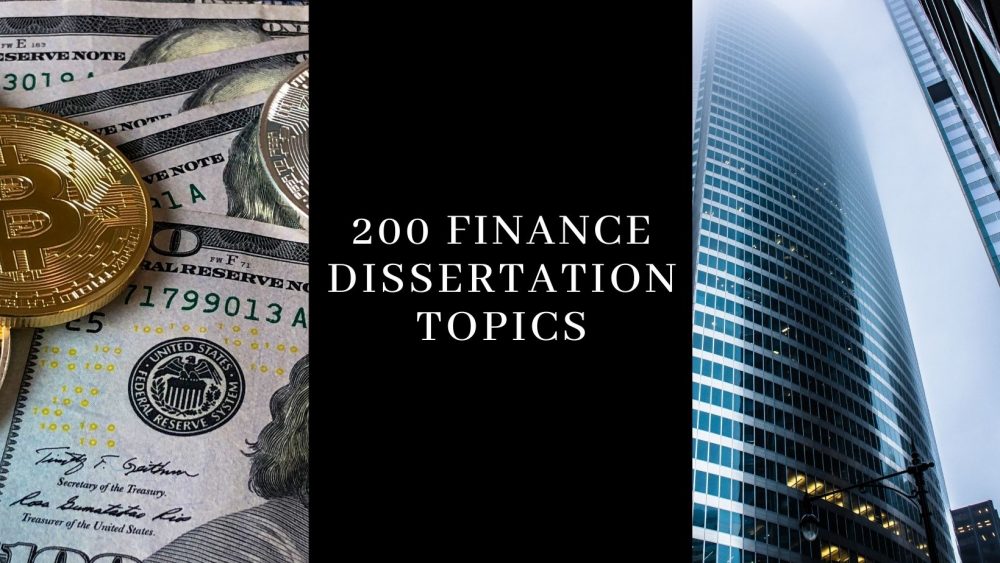
Finance dissertation topics are on-demand in the 21st century. But why is this so? It may perplex you how everyone is up and down looking for interesting, quality finance topics. However, the answer is simple: because fascinating finance dissertation topics can earn students bonus points.
We will delve into that in just a second. Your finance topic dictates the difficulty of the assignment you are going to handle. Landing on the right topic means that you will not have to toil as much as when you pick a highly complex topic. Does it make sense?
Let’s explore the nitty-gritty of finance dissertation papers before we get into mentioning the top-rated finance research topics list.
What Is A Finance Dissertation?
As the name goes, finance dissertation is a kind of writing that investigates a particular finance topic selected by the student. The topics range from the stock market, banking, and risk management to healthcare finance topics.
This dissertation provides the student with a degree of academic self-confidence and personal satisfaction in the finance field. Finance writing requires extensive research to create a persuasive paper in the end.
Writing Tips For Finance Dissertations
Are you uncertain concerning what you need to do to compose a top-notch finance dissertation? Worry no more! Our professional writers have put together some essential suggestions to kick you off. In the next few minutes, you will be in a position to create a perfect finance dissertation painstakingly:
- Narrow down your topic : Trim down your finance topic to a specific niche. It should focus on one region; either micro-finance, macro-finance, or internet banking.
- Verify your facts : Finance is a field that includes a lot of statistical data to be followed logically. Therefore, verify facts and figures with reliable sources before opting to use them in your paper.
- Write concisely : Unlike other papers with long narrative tales, you should encapsulate a finance paper into a tight, concise paper. The rule of ‘short is sweet’ technically applies here at great length.
- Arrange your data neatly : A paper that is stuffed with numerals and charts all over may turn down a reader at first sight. For an impressive finance thesis, know-how and when to use your data.
- Write simply : Avoid jargon that may confuse an ordinary reader. Where a need is for technical terms to be used, illustrate them with relatable examples. Simplicity is gold in a finance dissertation. So, use it well.
With these tips and tricks, you are all set to start writing your finance paper. We now advance to another crucial part that will make sure your finance paper is refined and at per with your institution’s academic standards.
General Structure of a Finance Dissertation
It is crucial to consult your supervisor regarding your dissertation’s research methodology, structure, style, and reasonable length. Depending on the guidance of your supervisor, the structure may vary. Nonetheless, as a general guide, ensure the following sections are part and parcel of your dissertation:
- Introduction: State the problem that you intend to address in your dissertation. It also includes a definition of key terms, the relevance of the topic and a summary of hypotheses.
- Theoretical and empirical literature, hypotheses development and contribution: It provides the theoretical framework of your study. The hypotheses are based on the literature review.
- Data and methodology: State the model (i.e. dependent and key independent variables) that you want to use the drawing on theoretical framework or economic argument that you may employ for your analysis. Define all control variables and describe the data used to test the hypothesis.
- Empirical results: Describe the results and mention whether they are consistent with the hypotheses and relate them with the existing evidence in the literature. You will also describe the statistical and practical/economic significance of your findings.
- Summary and conclusion: Summarize your research and state the general conclusion with relevant implications.
It is important to have all the dataset you want to use readily available before finalizing the topic. The dataset is essential for testing your hypotheses.
There are thousands of research topics for finance students available all over the internet and academic books. You only have to browse and lookup for the latest research or refer to past readings or course lectures.
Even though this exercise may look simple enough on the surface, it takes a lot of time to consider what makes for interesting finance topics adequately. Not all ideas you find will achieve the academic requirements that your supervisor expects from you.
Here is a list of freshly mint topics to use for numerous finance situations:
Impressive Healthcare Finance Topics
Healthcare involves more than just treating patients and administering injections. There are finance aspects that also come into play, including:
- Strategies for marketplace achievement in turbulent times: Medical staff marketing
- Effects of the employer executive compensation and benefits plan after the Tax Reform Act of 1986
- Improving profitability through accelerating philanthropic giving to healthcare systems
- Acceleration and effective information strategies for cash management in hospitals
- Finding the system’s solution to health care cost accounting
- How hospitals spend money from charitable organizations and donor funding
- Models of enhancing cost accounting efforts by improving existing information sources
- Strategies of increasing cash flow with a patient accounting review
- A systematic review of productivity, cost accounting, and information systems
- A study of the cost accounting strategies under the prospective payment system
- How to manage bad debt and charity care accounts in hospitals
- Achieving more value from managed care efforts in healthcare systems
- Strategies of achieving economies of scale through shared ancillary and support services
- Profitable ways of financing the acquisition of a health care enterprise
- Effects of mergers and acquisitions on private hospitals
- Measuring nursing costs with patient acuity data in hospitals
- Affordable treatment and care for long-term and terminal diseases
- Survey of the organization and structure of a hospital’s administration concerning financing
- Impact of culture and globalization on healthcare financing
- Discuss the necessity for universal health coverage in the United States
Finance Management Project Topics
If you are a finance management enthusiast, this section will impress you the most:
- The impact of corrupt bank managers on its sustainability
- How banks finance small and medium-scale enterprises
- Loan granting and its recovery problems on commercial banks
- An evaluation of credit management in the banking industry
- The role of microfinance banks in the alleviation of poverty in the US
- Comparative evaluation strategies in mergers and acquisitions
- How to plan and invest in the insurance sector and tax planning
- Impact of shareholders on decision-making processes on banks
- How diversity in banks affects management and leadership practices
- Credit management techniques that work for small scale enterprises
- Appraisal on the impact of effective credit management on the profitability of commercial banks
- The impact of quantitative tools of monetary policy on the performance of deposit of commercial banks
- Financial management practices in the insurance industry and risk management
- The role of the capital market in economic development
- Problems facing financial institutions to the growth of small scale business in the USA
- Why training and development of human resources is a critical factor in bank operations
- The impact of universal banking financial system on the credibility
- Security threats to effective management in banks
- The effect of fiscal and monetary policy in controlling unemployment
- The effects of financial leverage on company performance
Topics in Mathematics With Applications in Finance
Mathematics and finance correlate in several ways in that they borrow concepts from each other. Here are some of the mathematics concepts that apply to finance paper topics:
- Linear algebra
- Probability theory
- Stochastic processes
- Regression analysis
- Value at risk models
- Time series analysis
- Volatility modelling
- Regularized pricing and risk models
- Commodity models
- Portfolio theory
- Factor modelling
- Stochastic differential equations
- Ross recovery theorem
- Option, price, and probability duality
- Black-Scholes formula, Risk-neutral valuation
- Introduction to counterparty credit risk
- HJM model for interest rates and credit
- Quanto credit hedging
- Calculus in finance and its application
International Finance Topics
International finance research topics deal with a range of monetary exchanges between two or more nations. Below is a list of international research topics in finance for you to browse through and pick a relevant one:
- A study of the most important concepts in international finance
- How internal auditing enhances good corporate governance practice in an organization
- Factors that affect the capital structure of Go Public manufacturing companies
- A financial engineering perspective on the causes of large price changes
- Corporate governance and board of directors responsibilities
- An exploratory study on the management of support services in international organizations
- An accounting perspective of the need for theorizing corporation
- Impact of coronavirus on international trade relations
- Is business ethics attainable in the global market arena
- How exchange rates affect international trading
- The role of currency derivatives in shaping the global market
- How to improve international capital structure
- How to forecast exchange rates
- Ways of measuring exposure to exchange rates fluctuations
- How to hedge exposure to exchange rates fluctuations globally
- How foreign direct investment puts individual countries at risk
- How to stabilize international capital markets
- A study of shadow banking in the global environment
- A comparative analysis of Western markets and African markets
- Exploring the monetary funding opportunities by the International Monetary Fund
Corporate Finance Research Topics
These 20 topics have the potential to help you write an amazing corporate finance paper, provided you have the will to work hard on your paper:
- Short- and long-term investment needs for working capital trends
- Identifying proper capital structure models for a company
- How capital structure and an organization’s funding of its operations relate
- Corporate finance decision making in unstable stock markets
- The effect of firm size on financial decision making incorporates
- Compare and contrast the different internationally recognized corporate financial reporting standards
- Evaluate the emerging concept integrated reporting in corporate finance
- Managing transparency in corporate financial decisions
- How technological connectivity has helped in integrated financial management
- How different investment models contribute to the success of a corporate
- The essence of valuation of cash flows in financial and non-financial corporates
- Identify the prevalent financial innovations in the USA
- Ways in which governance influences corporate financial activities
- Impact of taxes on dividend policies in developed nations
- How corporate strategies related to corporate finance
- Implications of the global economic crisis in the backdrop of corporate finance concepts
- How information technology impact corporate relations among companies
- Evaluate the effectiveness of corporate financing tools and techniques
- How do FDI strategies compare in Europe and Asia?
- The role of transparency and liquidity in alternative corporate investments
Finance Debate Topics
These finance debate topics are formulated in keeping with emerging financial issues globally:
- Is China’s economy on the verge of ousting that of the US?
- Does the dynamic nature of the global market affect the financial alienations of countries?
- Is Foreign Direct Investment in retail sector good for the US?
- Is it possible to maintain stable oil prices in the world?
- Are multinational corporations good for the global economy?
- Does the country of origin matter in selling a product?
- Are financial companies misusing ethics in marketing?
- Why should consumer always be king in marketing messages?
- Does commercialization serve in the best interest of the consumer?
- Why should companies bother having a mission statement?
- Why should hospitals receive tax subsidies and levies on drugs?
- Is television the best medium for advertisement?
- Is the guarantor principle security or a myth?
- Compare and contrast market trends in capitalism versus Marxism states
- Does the name of a business have an impact on its development record?
- Is it the responsibility of the government to finance small-scale business enterprises?
- Does budgeting truly serve its purpose in a company?
- Why should agricultural imports be banned?
- Is advertising a waste of company resources?
- Why privatization will lead to less corruption in companies
Finance Topics For Presentation
Is your group or individual finance presentation giving you sleepless nights just because you do not have a topic? Worry no more!
- The role of diplomatic ties in enhancing financial relations between countries
- Should banks use force when recovering loans from long-term defaulters?
- Why mortgages are becoming difficult to repay among the middle class
- Ways of improving the skilled workforce in developing
- How technology creates income disparities among social classes
- The role of rational thinking in making financial decisions
- How much capital is necessary for a start-up?
- Are investments in betting firms good for young people?
- How co-operatives are important in promoting communism in a society
- Why should countries stop receiving foreign aids and depend on themselves?
- Compare and contrast the performance of private sectors over public sectors
- How frequent should reforms be conducted in companies?
- How globalization affects nationalism
- Theories of financial development that is still applicable today
- Should business people head the finance ministry of countries?
- The impact of the transport sector on revenue and tax collection
- The impact of space exploration on the country’s economy
- How regional blocs are impacting developing nations
- Factors contributing to the growth of online scams
- What is the impact of trade unions in promoting businesses?
Finance Research Topics For MBA
Here is our best list of top-rated MBA financial topics to write about in 2023, which will generate more passion for a debate:
- Evaluate the effect of the Global crisis to use the line of credit in maintaining cash flow
- Discuss options for investment in the shipping industry in the US
- Financial risk management in the maritime industry: A case study of the blue economy
- Analyze the various financial risk indicators
- Financial laws that prevent volatility in the financial market
- How the global recession has impacted domestic banking industries
- Discuss IMF’s initiatives in tackling internal inefficiency of new projects
- How the WTO is essential in the global financial market
- The link between corporate and capital structures
- Why is it important to have an individual investment?
- How to handle credit crisis in financial marketing
- Financial planning for salaried employee and strategies for tax savings
- A study on Cost And Costing Models in Companies
- A critical study on investment patterns and preferences of retail investors
- Risk portfolio and perception management of equity investors
- Is there room for improvement in electronic payment systems?
- Risks and opportunities of investments versus savings
- Impact of investor awareness towards commodities in the market
- Is taxation a selling tool for life insurance
- Impact of earnings per share
Public Finance Topics
These interesting finance topics may augur well with university students majoring in public finance:
- Financial assistance for businesses and workers during Coronavirus lockdowns
- Debt sustainability in developing countries
- How we can use public money to leverage private funds
- Analyze the use of public funds in developed versus developing countries
- The reliability of sovereign credit ratings for investors in government securities
- Propose a method of analysis on the cost-benefit ratio of any government project
- The role of entities in charge of financial intermediation
- The reciprocity and impact of tariff barriers
- Impact of the exempted goods prices on the trade deficit
- Investor penalties and its impact in the form of taxes and penalties
- Public government projects that use private funds
- Ways of measuring the cost of sustainability
- Maintaining economic growth to avoid a strong recession
- The impact of the declining income and consumption rates
- Effects of quarantine and forced suspension of economic activity
- Innovative means of limiting the scale of pandemic development
- The growing scale of the public debt of the public finance system
- A critical analysis of the epidemiological safety instruments used in countries
- The growing debt crisis of the state finance system
- How to permanently improve and increase the scale of anti-crisis socio-economic policy planning
Business Finance Topics
You can address the following business finance research papers topics for your next assignment:
- How organizations are raising and managing funds
- Analyze the planning, analysis, and control operations and responsibilities of the financial manager
- Why business managers should take advantage of the federal stimulus package
- Economical ways of negotiating for lower monthly bills
- Evaluate the best retirement plans for entrepreneurs
- Tax reform changes needed to spearhead businesses to the next level
- How politicians can help small businesses make it to the top
- Setting up life insurance policies from which you can sidestep the banks and loan yourself money
- Why every business manager should know about profit and loss statements, revenue by customers and more.
- Advantages of creating multiple corporations to business entrepreneurs
- Why good liquidity is a vital weapon in the face of a crisis
- Reasons why many people are declaring bankruptcy during the coronavirus pandemic
- Why you should closely examine the numbers before making any financial decisions
- Benefits of corporations to small scale business ventures
- How to start a business without money at hand
- Strategies for improving your company’s online presence
- Discuss the challenge of debt versus equity for small-scale businesses
- The impact of financial decisions on the profitability and the risk of a firm’s operations
- Striking a balance between risk and profitability
- Why taking the ratio of current assets to current liabilities is important to any business
You can use any of the hot topics mentioned above for your finance dissertation paper or opt for our thesis writing services. We have competitive finance dissertation writing experts ready to tackle your paper to the core.
Try us today!

Leave a Reply Cancel reply
Your email address will not be published. Required fields are marked *
Comment * Error message
Name * Error message
Email * Error message
Save my name, email, and website in this browser for the next time I comment.
As Putin continues killing civilians, bombing kindergartens, and threatening WWIII, Ukraine fights for the world's peaceful future.
Ukraine Live Updates

- Customer Reviews
- Extended Essays
- IB Internal Assessment
- Theory of Knowledge
- Literature Review
- Dissertations
- Essay Writing
- Research Writing
- Assignment Help
- Capstone Projects
- College Application
- Online Class
Dissertation Topics in Finance: 50+ Examples for Inspiration
by Antony W
May 9, 2023

Finance is an interesting field to study that deals with how humans obtain funds and how they handle the investment.
As a student taking a master’s degree or Ph.D. course in finance, you’ll need to write a dissertation project before graduation.
What’s a better way to start the project than to look for the best dissertation topic in finance?
Unfortunately, choosing the right topic fast can be quite a big challenge, in part because finance is a wide subject that covers different areas.
While the rule of thumb when it comes to picking a topic for your dissertation is to identify an area you’re passionate about, the topic you select must be relevant, manageable, and useful with respect to a career path in finance.
We want to make your work easier with this guide, so you can have an easy time working on your assignment. B
elow you’ll find 50+ examples of topics related to finance. With that many choice, it should be easy for you to identifying one interesting topic you can explore further in a 100 to 300 pages long dissertation .
There are many factors to consider when choosing a dissertation topic in finance.
At the end of the, though, you need to make sure that the topic you choose falls within the area of your expertise and is interesting enough to explore. Here are 50+ ideas to get you started:
Ethics in Accounting Dissertation Topics
Accounting is a profession that, by its very nature, requires a higher level of trust and ethical code of conduct for better financial reporting.
Many questions have emerged from the increase in ethical scandals in accounting, and some of these require further studies. Some of the topics to consider in this area include:
- Profits vs. whistleblowing in the workplace What is the best course of action?
- Banking on Ethics: A Look at Ethics in the Banking Profession
- Managers’ judgment has a role in financial reporting.
- Using accounting methods to reduce tax liabilities. Isn’t that unethical?
- Can accounting control systems ever prevent all occurrences of company fraud and unethical behavior?
- Transfer pricing and tax avoidance Methods for teaching ethics to university accounting students that work.
- Is an auditor’s independence only a perception or a reality?
- Accounting, ethics, and the missing links: a case study from the United Kingdom
- Contradiction in action: An broadening of the debate on Corporate Social Responsibility.
- The Ethics of Tax Evasion as Perceived in the United Kingdom
Internet Banking Dissertation Topics
The debut of internet banking changed the way individuals and businesses manage their transactions.
These days, it’s easy to send and receive money right from the comfort of your home, and this practice alone has made online banking quite significant.
If you’re focusing on internet banking, your dissertation can focus on any of the following topics:
Best practices for online banking and transactions in terms of security.
- Future Internet banking advancements in the United Kingdom.
- Will Fintechs be there in the long run?
- Internet banking services in the United Kingdom vary greatly: A comparison study.
- How have the internet and mobile banking altered the corporate landscape?
- Is digitization causing havoc in the financial industry?
- Internet banking usage: A comparison between young and old people
- A comparative assessment of digital innovation in the banking business in Europe and the United Kingdom.
- The economic and financial consequences of internet banking
Microfinance Dissertation Topics
Microfinance has a wider audience, which is why there’s more effort in place to enhance its growth through banking and corporate sector.
Here are some topics that you can investigate:
- What are the barriers to the establishment of a fully-fledged microfinance sector in the United Kingdom?
- An investigation on the influence of microfinance in emerging economies.
- Microfinance is becoming more popular in the UK banking business.
- Considering the fast growth of international microfinance.
- Access to financial services for the poor, including microfinance and microcredit: A Eurozone empirical study
- Factors that influence the success of microfinance institutions.
- Is microfinance empowering women all across the world?
- How crucial is credit and other financial services to economic development and investment?
- A strategic study, debate, and suggestions for assessing the demand for collective investment plans in the United Kingdom.
- Microfinance’s influence on poverty reduction and economic growth
Alternative Investment Dissertation Topics
Financial market is more volatile now than ever before, and that alone prompts many investors to consider alternative means of spending their money.
Some of the sectors investors are willing to tap into due to high returns and less volatility include mutual funds, private equity, and hedge funds.
This sector still requires more investigation, especially since alternative investments don’t correlate to the current stock market. Some topics to consider include:
- Index and mutual funds are becoming increasingly popular.
- Hedge Funds: A new investment option for institutional investors and an entry into the retail market.
- Hedge funds: are they risk diversifiers, return enhancers, or both?
- Experiment evidence for investment diversification in alternative investment vehicles.
- An assessment of the function and performance of UK capital markets as an alternative source of funding to banking.
- The regulatory interference and enforcement authority in alternative investments.
- The causes for the continuing rise of hedge funds and their implications for the UK financial market
- The UK’s private equity market and numerous investors
- Private equity investment in the European Union: Prospects for the Future
Accounting Standards Dissertation Topics
There’s a higher demand to maintain strict and high standards in accounting practices in many countries.
Yet these standards have raised a number of important questions that existing studies haven’t addressed. So several ideas that you could focus on in your dissertation include:
- What is the standard for reporting on sustainability?
- An examination of the likely effects of Brexit on the UK’s accounting standards and framework.
- How have changes to the Companies Act and the Corporate Governance Code changed the function and duties of UK accountants over the last decade?
- An inquiry into accounting outsourcing from the UK’s point of view.
- An examination of accounting outsourcing from the standpoint of the United States.
- Is the existing set of accounting standards meeting its goals?
- The balanced scorecard: “Holy Grail” for law firms?
- The growing demand for social and environmental information disclosure: Implications for large organizations
Retail and Commercial Banking Dissertation Topics
Retail and commercial banks may be on the decline, but they’re still an important part of the banking industry.
That’s so especially since they continue to play a big role in reaching out to semi-urban and rural populations that need financial services.
This segment of financial study focuses on examining how the baking sector has changed to accommodate the constantly changing demands of banking on the different segments of the economy.
Here are some topics to focus on in your dissertation:
- How have banks influenced the growth of SMEs in the United Kingdom?
- Change agents in the European Retail Banking Sector: An Analysis and Implications for Local Commercial Banks
- Changes and preferences brought about by customer needs are driving the evolution of retail banking.
- Inventory management in mobile banking: A case study of underdeveloped nations
- In the UK banking business, what is the link between equity, pricing, and performance?
- Financial services to the rural population: a study of retail banking problems in the United Kingdom
- An examination of how information technology has revolutionized financial services in the United Kingdom.
Cryptocurrency Dissertation Topics
Cryptocurrency is currently more than a lucrative class of investment in the digital economy. It’s an area that has attracted the attention of many investors all over the world.
Despite its popularity, Cryptocurrency doesn’t have sufficient academic research yet, and therefore there’s a need to read and research further into the field.
If Cryptocurrency is your area of study as a finance student, here are some dissertation topics to consider:
- Are we ready to demonetize the globe with cryptocurrency?
- How to calculate risk and return in the crypto finance industry.
- Is the cryptocurrency market influenced by technical analysis?
- Are cryptocurrencies suitable for swing trading?
- Is it feasible to make cryptocurrencies less volatile by employing a derivative strategy?
- Are the returns on the cryptocurrency market sustainable?
- What is the investing potential of other alt currencies in the face of Bitcoin and Ethereum’s dominance?
- Cryptocurrency asset price. Do the standard theories apply in this case?
- Why are banks so adamantly opposed to digital currency?
- Cryptocurrencies are compared to other asset types.
- What role do derivative goods play in crypto currencies?
If you’ve scanned through the topic ideas that we’ve given you in this guide, you’ve more than likely realized that there’s a lot to explore. So whether you’re interested in cryptocurrency, accounting, retail and commercial baking, or other areas of finance, you should find the right topic to explore in your research.
The goal is to choose a topic that interests you, but you also need to make sure it’s within your area of study. When in doubt, talk to your instructor.
About the author
Antony W is a professional writer and coach at Help for Assessment. He spends countless hours every day researching and writing great content filled with expert advice on how to write engaging essays, research papers, and assignments.
Global. Rigorous. Adaptive. Register your interest!
Smart. Open. Grounded. Inventive. Read our Ideas Made to Matter.
Which program is right for you?

Through intellectual rigor and experiential learning, this full-time, two-year MBA program develops leaders who make a difference in the world.
A rigorous, hands-on program that prepares adaptive problem solvers for premier finance careers.
A 12-month program focused on applying the tools of modern data science, optimization and machine learning to solve real-world business problems.
Earn your MBA and SM in engineering with this transformative two-year program.
Combine an international MBA with a deep dive into management science. A special opportunity for partner and affiliate schools only.
A doctoral program that produces outstanding scholars who are leading in their fields of research.
Bring a business perspective to your technical and quantitative expertise with a bachelor’s degree in management, business analytics, or finance.
A joint program for mid-career professionals that integrates engineering and systems thinking. Earn your master’s degree in engineering and management.
An interdisciplinary program that combines engineering, management, and design, leading to a master’s degree in engineering and management.
Executive Programs
A full-time MBA program for mid-career leaders eager to dedicate one year of discovery for a lifetime of impact.
This 20-month MBA program equips experienced executives to enhance their impact on their organizations and the world.
Non-degree programs for senior executives and high-potential managers.
A non-degree, customizable program for mid-career professionals.
Master of Finance
MFin Curriculum
Putting ideas into action is fundamental to MIT’s approach to knowledge creation, education, and research. In the MFin program, presents itself in a rigorous, hands-on curriculum that offers students the chance to build a deep reservoir of finance knowledge and immediately put that knowledge to work in the world. MFin students participate in Action Learning experiences including Proseminars and the Finance Lab
The MFin curriculum consists of required fundamental and advanced subjects, restricted electives, and an action learning course. Students may choose to write a thesis or pursue an independent study, pending approval by the faculty director.
Register your Interest
Timeline of the mfin program.
The MFin program degree is completed in 18 months with the option to accelerate the degree requirements and complete it in 12 months. This allows you to tailor the program to your specific needs.
Take an in-depth look at the MFin Program Timeline here
The degree requirements are the same for both formats; the only difference is timing.
During the 18 months, students will have the option to complete an internship during the second summer term, take additional courses, or use the additional time to write a thesis.
The shorter timeframe allows you to earn a full MFin degree in one year—including an Action Learning experience where you’ll work with corporate partners on real-world challenges—accelerating your path to a rewarding career.
Curriculum at a Glance
The mfin curriculum includes ....
Required Core Courses: During the summer term, you’ll begin with rigorous courses in modern finance, financial mathematics, and financial accounting which provide foundational theories and principles you’ll draw from throughout the program and your career.
Required Advanced Courses: You’ll work with analytical tools — financial modeling, portfolio and pricing theory, statistics and data analytics, and computational methods — to help tackle multi-faceted challenges that arise in finance, from capital budgeting and cash flow analysis to dynamic asset allocation and big-data-based investment strategies and more. A required professional development course adds an important dimension, focusing on finance ethics and regulation.
Required Action Learning Experience: Our signature finance Action Learning courses allow students to apply theory to practice, testing their skills in research methodologies and data analysis with hands-on work experience alongside financial industry practitioners. These project-based courses challenge students to solve real-world problems with MIT's partner corporations, culminating in student presentations to corporate decision-makers.
An Array of Electives: You’ll choose from topics ranging from financial technology to quantitative methods, to economics, to specialized disciplines such as healthcare finance, fixed income, mergers and acquisitions, and asset management. In addition, MFin students can access other MIT courses or cross-register at Harvard to expand their horizons.
Core Requirements
15.415 foundations of modern finance (summer term).
Core theory of capital markets and corporate finance. Topics include functions and operations of capital markets, analysis of consumption and investment decisions of investors, valuation theory, financial securities, risk analysis, portfolio theory, asset pricing models, theory of efficient markets, as well as capital budgeting and financing and risk management decisions of firms. The course provides a theoretical foundation of finance and its applications.
15.454 Financial Mathematics OR 15.455 Advanced Financial Mathematics for Financial Engineering (Summer Term)
15.454 Financial Mathematics
Provides an overview of essential fundamental mathematics needed for the study of modern finance: linear algebra, probability, stochastic processes, statistics, optimization, and programming in Matlab.
15.455 Advanced Mathematical Methods for Financial Engineering
This course covers advanced mathematical topics essential for research and applications in financial engineering and quantitative finance: linear algebra, optimization, probability, stochastic processes, statistics, and basic programming in R and Matlab. These topics are covered at a more advanced level and at a faster pace than Fundamentals of Financial Mathematics. *Students must take either 15.454 or 15.455
15.S23 Programming for Finance Professionals (Summer Term)
All MFins will enroll in a pass/fail course with supplemental recitations during the summer term which is designed to develop skills in applying basic methods from the programming language Python (with additional references from R) to financial problems. Topics include data manipulation, visualization and reporting, and an overview of programming ethics. MFin students will apply and build upon these skills in 15.433 Financial Markets and 15.450/15.457 Analytics and Advanced Analytics of Finance.
15.516 Corporate Financial Accounting (Summer Term)
Preparation and analysis of financial statements. Focuses on measuring and reporting of corporate performance for investment decisions, stock valuation, bankers' loan risk assessment, and evaluations of employee performance. Emphasizes the required interdisciplinary understanding of business. Concepts from finance and economics (e.g., cash flow discounting, risk, valuation, and criteria for choosing among alternative investments) place accounting in the context of the business enterprise.
15.410 Finance Ethics & Regulation (Fall Term)
This course is mandatory for all MFin students and will take place during H1 of your first fall term.
Explores a range of ethical issues and challenges that arise in organizations and financial practice. Provides fundamental theories typically used to evaluate ethical dilemmas and references both real situations and hypothetical examples. Highlights the importance of ethical values and their impact on financial regulation for professional practice. Discusses the various factors that influence ethical behavior, such as family, religious values, personal standards and needs, senior leadership behavior, norms among colleagues, organizational expressed and implicit standards, and broader community values. Restricted to students in the Master of Finance Program.
15.425 Corporate Finance (Fall Term)
Introduction to corporate financial management. Topics include capital budgeting, investment decisions and valuation; working capital management, security issues; dividend policy; optimal capital structure; and real options analysis.
15.433 Financial Markets (Fall Term)
This course focuses on the financial theories and empirical evidence that are useful for investment decisions. Its main content includes financial risk factors, financial models, and financial markets. Financial theory and empirical evidence for making investment decisions. Topics include portfolio theory; equilibrium models of security prices, including the capital asset pricing model and the arbitrage pricing theory; the empirical behavior of security prices; market efficiency; performance evaluation; and behavioral finance. Preference to Course 15 students.
15.450 Analytics of Finance OR 15.457 Advanced Analytics of Finance (Spring Term)
15.450 Analytics of Finance
This course covers the main quantitative methods of finance. It covers three broad sets of topics: financial econometrics, dynamic optimization, and derivative pricing using stochastic calculus. The emphasis is on rigorous and in-depth development of the key techniques and their application to practical problems. Provides a rigorous foundation for the main analytical techniques and quantitative methods necessary to succeed in the financial services industry. Topics include discrete and continuous asset pricing models, financial econometrics, machine learning methods, and dynamic optimization.
Examples of applications include portfolio management, risk management, derivative pricing, and algorithmic trading.
15.457 Advanced Analytics of Finance
This course is the advanced version of 15.450. It introduces a set of modern analytical tools to solve practical problems in finance. The goal is to build operational models, take them to the data, and use them to aid financial decision-making.
Topics include:
- Overview of frequentist and Bayesian inference
- Regression and classification
- Time series modeling
- Event studies
- Machine learning methods for finance
- Structural approach to extracting information from financial data
- Optimization methodsExample applications are drawn from problems in quantitative trading, credit risk modeling, portfolio optimization, and Fintech.
*Students can take either 15.450 or 15.457
Required Action Learning**
15.451 proseminar in capital markets/investment management.
The proseminar provides students a unique opportunity to tackle original research problems in financial engineering that have been posed by leading experts from the financial community. Students are assigned to teams and each team is assigned one such problem. The team's solution is then presented at a seminar, which is open to the entire MIT community.
15.452 Proseminar in Corporate Finance/Investment Banking
This proseminar bridges the gap between finance theory and finance practice, and introduces students to the broader financial community. Students participate in a series of proseminars with industry guest speakers. Each guest, in collaboration with finance faculty, provides a problem and materials to a team of students. Each team then prepares a report and presents their analysis to the guest speaker and other students for evaluation and feedback.
15.453 Finance Lab
Bridges theory and practice, providing students with an immersive research and analysis experience. Students work with leading industry practitioners and a diverse cross-section of students on collaborative teams, focusing on topical, real-world finance research questions posed by the practitioners. Teams then deliver a nuanced analysis and report findings, gaining insight and coaching from the experts. Practitioners represent a range of financial institutions, including investment management, hedge funds, private equity, venture capital, risk, and consulting.
Which is right for you: A Proseminar or Finance Lab?
All MFin students participate in Action Learning by enrolling in either a Proseminar or Finance Lab. Both experiences match students with industry-based challenges. Proseminars offer an opportunity to solve financial problems, while Fin-Lab teams research and analyze a challenge with host companies. Although only one of these courses is required, students often choose more than one to practice important social skills and gain industry experience critical for success in a diverse, global economy.
MFin Student Experience: The Impact of Action Learning
Pavel Lebedev, MFin '20, reflects on how the Finance Research Practicum improved his knowledge of finance. Plus, find out how this experience contributed to his career search.
Restricted Electives***
15.235 blockchain and money (fall term).
Explores blockchain technology's potential use - by entrepreneurs and incumbents - to change the world of money and finance. Begins with a review of the technology's initial application, the cryptocurrency Bitcoin, giving students an understanding of the commercial, technical, and public policy fundamentals of blockchain technology, distributed ledgers and smart contracts in both open-sourced and private applications. Focuses on current and potential blockchain applications in the financial sector. Includes reviews of potential use cases for payment systems, central banking, venture capital, secondary market trading, trade finance, commercial banking, post-trade possessing, and digital ID. Also explores the markets and regulatory landscape for cryptocurrencies, initial coin offerings, other tokens, and crypto derivatives. Open to undergraduates with permission of instructor.
15.431 Entrepreneurial Finance And Venture Capital (Fall Term)
Examines the elements of entrepreneurial finance, focusing on technology-based start-up ventures, and the early stages of company development. Addresses key questions which challenge all entrepreneurs: how much money can and should be raised; when should it be raised and from whom; what is a reasonable valuation of the company; and how funding, employment contracts and exit decisions should be structured. Aims to prepare students for these financial decisions, both as entrepreneurs and venture capitalists. In-depth analysis of the structure of the private equity industry.
15.434 Advanced Corporate Finance (Fall Term)
Covers advanced topics in corporate finance, including complex valuations, static and dynamic capital structure, risk management, and real options. Also considers security design, restructuring, bankruptcy, corporate control and governance, and international finance issues.
15.436 Corporate Financial Strategy (Fall Term)
Exposes students to the cutting edge of financial engineering. Includes a deep immersion into 'how things work,' where students develop and test sophisticated computational models and solve highly complex financial problems. Covers stochastic modeling, dynamic optimization, stochastic calculus, and Monte Carlo simulation through topics such as dynamic asset pricing and investment management, market equilibrium and portfolio choice with frictions and constraints, and risk management. Assumes a solid undergraduate-level background in calculus, probability, statistics, and programming and includes a substantial coding component. Students are encouraged but not required to use R for coursework.
15.456 Financial Engineering (Fall Term)
Provides an introduction to financial engineering, covering topics such as asset pricing theory and applications, optimization, market equilibrium, market frictions, risk management, and advanced topics. Assumes solid undergraduate-level background in calculus, probability, statistics, and programming and includes a substantial coding component. Materials and review sessions use R. Students are encouraged but not required to use R for assignments and projects.
15.458 Financial Data Science and Computing (Fall Term)
Covers methods of managing data and extracting insights from real-world financial sources. Topics include machine learning, natural language processing, predictive analytics, regression methods, and time series analysis. Applications include algorithmic trading, portfolio risk management, high-frequency market microstructure, and option pricing. Studies major sources of financial data, raw data cleaning, data visualization, and data architecture. Provides hands-on instruction in tools used in the financial industry to process massive data sets, including SQL, relational, and multidimensional databases. Emphasizes computer implementations throughout.
15.482 Healthcare Finance (Fall Term)
Covers the role of finance in the biotech and pharmaceutical industries; specifically, the application of novel financing methods and business structures to facilitate drug discovery, clinical development, and greater patient access to high-cost therapies. Topics include basic financial analysis for the life-sciences professional; risks and returns in the biopharma industries; the mechanics of biotech startup financing; capital budgeting for biopharma companies; and applications of financial engineering in modern healthcare investment strategies and institutions. Develops a systemic framework for addressing the biggest challenges in the biomedical ecosystem.
15.S08 Advanced Data Analytics and Machine Learning in Finance (Fall Term)
While machine learning literature is extremely rich and at times overly theoretical, there are still consistently two techniques that win most machine learning competitions: neural networks and gradient boosting. In this course, we will try to provide a bridge from knowledge of learning to a foundational understanding of how those resources are applied to finance. The course provides a very practical approach to applying modern machine-learning methods to problems in the financial domain.
15.437 Options and Futures Markets (Spring Term)
Examines the economic role of options and futures markets. Topics: determinants of forward and futures prices, hedging and synthetic asset creation with futures, uses of options in investment strategies, relation between puts and calls, option valuation using binomial trees and Monte Carlo simulation , implied binomial trees, advanced hedging techniques, exotic options, applications to corporate securities and other financial instruments.
15.438 Fixed Income Securities and Derivatives (Spring Term)
Designed for students seeking to develop a sophisticated understanding of fixed income valuation and hedging methods, and to gain familiarity with the major markets and instruments. Emphasizes tools for quantifying, hedging, and speculating on risk. Topics include duration; convexity; modern approaches to modeling the yield curve; interest rate forwards, futures, swaps and options; credit risk and credit derivatives; mortgages; and securitization.
15.445 Mergers, Acquisitions, and Private Equity (Spring Term)
Probably the most dramatic events in a corporation's history involve the decision to acquire another firm or the decision to oppose being acquired. This is also one of the areas of management most thoroughly documented in the financial press and the academic literature. Subject explores three aspects of the merger and acquisition process: the strategic decision to acquire, the valuation decision of how much to pay, and the financing decision on how to fund the acquisition. Class sessions alternate between discussions of academic readings and applied cases.
15.446 Public versus Private Capital Markets (Spring Term)
Reviews the merits and trade-offs of public versus private capital markets, which have witnessed tremendous growth over the last decade, from a corporate governance standpoint. Specific phenomena affecting public companies, such as shareholder activism and passive investing, are also considered. Uses corporate case studies for extensive analysis and discussion.
15.466 Functional and Strategic Finance (Spring Term)
Applies finance science and financial engineering tools and theory to the design and management of global financial institutions, markets, and the financial system to better understand the dynamics of institutional change and financial product/service design. Focuses on foundational analytical tools - derivative pricing and risk measurement; portfolio analysis and risk accounting; and performance measurement to analyze and implement concepts and new product ideas. Examines the needs of government as user, producer and overseer of the financial system, and how tools are applied to measure and manage risks in financial crises.
15.467 Asset Management, Lifecycle Investment, and Retirement Finance (Spring Term)
Applies finance science and financial engineering tools and theory to asset management, lifecycle investing, and retirement finance. Focuses on foundational analytical tools - derivative pricing and risk measurement, portfolio analysis and risk accounting, and performance measurement to analyze and implement concepts and new product ideas. Students should be familiar with basic portfolio-selection theory, CAPM, options, futures, swaps and other derivative securities.
15.481 Financial Market Dynamics (Spring Term)
Develops a new perspective on the dynamics of financial markets and the roles that human behavior and the business environment play in determining the evolution of behavior and institutions. Draws on a variety of disciplines to develop a more complete understanding of human behavior in the specific context of markets and other economic institutions. Incorporates practical applications from financial markets, the hedge fund industry, private equity, government regulation, and political economy.
15.483 Consumer Finance: Markets, Product Design and FinTech (Spring Term)
Covers rational and behavioral aspects of consumer financial decision making; current household financial products and competitive landscape in credit, investment, and advising markets; consumer financial product innovations and regulatory issues; securitization and the design and pricing of financial products derived from consumer debt, such as mortgages, credit card receivables, and student loans.
15.492 Practice of Finance: Crypto Finance (Spring Term)
Explores the markets for cryptocurrencies, such as Bitcoin. Begins with the basics and economics of crypto assets' underlying blockchain technology and then turns to the trading and markets for cryptocurrencies, initial coin offerings, other tokens and crypto derivatives. Students gain an understanding and comparison to traditional finance of the market structure, participants, regulation and dynamics of this relatively new and volatile asset class.
15.499 Social Impact Investing (Spring Term)
Deep dive into social impact investing -- an approach intentionally seeking to create a financial return and positive social impact that is actively measured. Imparts a solid analytical framework for evaluating the spectrum of social impact investments, including mission-related investing. Includes a project that provides practical experience in evaluating an impact enterprise or a public markets ESG strategy. Students gain experience in structuring different types of investments, and critically compare and contrast these investments with traditional mainstream investments, with a view to understanding structural constraints. Designed for students interested in the intersection of finance and social impact. Provides career guidance and networking opportunities.
** Minimum of one required *** Restricted electives must be taken while enrolled in the MFin program. Courses taken as an undergraduate at MIT may not be counted toward the MFin requirements. **** Program Degree Requirements as of Fall, 2023. Subject to changes.
Business Analytics Certificate
MIT Certificates allow you to tailor your education to meet your professional goals. MFin students may complete the Business Analytics Certificate while in the program.
- Browse All Articles
- Newsletter Sign-Up
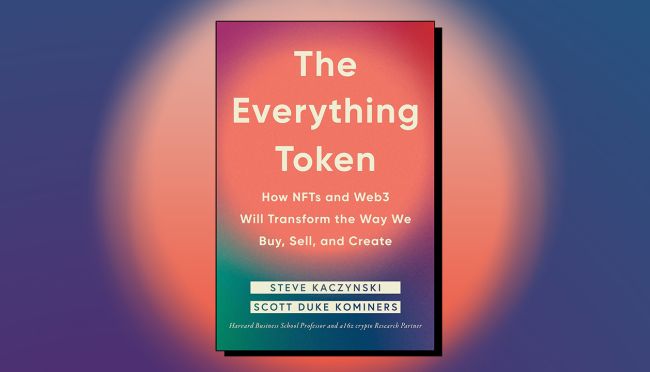
- 23 Jan 2024
More Than Memes: NFTs Could Be the Next Gen Deed for a Digital World
Non-fungible tokens might seem like a fad approach to selling memes, but the concept could help companies open new markets and build communities. Scott Duke Kominers and Steve Kaczynski go beyond the NFT hype in their book, The Everything Token.

- 12 Sep 2023
- Research & Ideas
How Can Financial Advisors Thrive in Shifting Markets? Diversify, Diversify, Diversify
Financial planners must find new ways to market to tech-savvy millennials and gen Z investors or risk irrelevancy. Research by Marco Di Maggio probes the generational challenges that advisory firms face as baby boomers retire. What will it take to compete in a fintech and crypto world?

- 17 Aug 2023
‘Not a Bunch of Weirdos’: Why Mainstream Investors Buy Crypto
Bitcoin might seem like the preferred tender of conspiracy theorists and criminals, but everyday investors are increasingly embracing crypto. A study of 59 million consumers by Marco Di Maggio and colleagues paints a shockingly ordinary picture of today's cryptocurrency buyer. What do they stand to gain?

- 17 Jul 2023
Money Isn’t Everything: The Dos and Don’ts of Motivating Employees
Dangling bonuses to checked-out employees might only be a Band-Aid solution. Brian Hall shares four research-based incentive strategies—and three perils to avoid—for leaders trying to engage the post-pandemic workforce.

- 20 Jun 2023
- Cold Call Podcast
Elon Musk’s Twitter Takeover: Lessons in Strategic Change
In late October 2022, Elon Musk officially took Twitter private and became the company’s majority shareholder, finally ending a months-long acquisition saga. He appointed himself CEO and brought in his own team to clean house. Musk needed to take decisive steps to succeed against the major opposition to his leadership from both inside and outside the company. Twitter employees circulated an open letter protesting expected layoffs, advertising agencies advised their clients to pause spending on Twitter, and EU officials considered a broader Twitter ban. What short-term actions should Musk take to stabilize the situation, and how should he approach long-term strategy to turn around Twitter? Harvard Business School assistant professor Andy Wu and co-author Goran Calic, associate professor at McMaster University’s DeGroote School of Business, discuss Twitter as a microcosm for the future of media and information in their case, “Twitter Turnaround and Elon Musk.”

- 06 Jun 2023
The Opioid Crisis, CEO Pay, and Shareholder Activism
In 2020, AmerisourceBergen Corporation, a Fortune 50 company in the drug distribution industry, agreed to settle thousands of lawsuits filed nationwide against the company for its opioid distribution practices, which critics alleged had contributed to the opioid crisis in the US. The $6.6 billion global settlement caused a net loss larger than the cumulative net income earned during the tenure of the company’s CEO, which began in 2011. In addition, AmerisourceBergen’s legal and financial troubles were accompanied by shareholder demands aimed at driving corporate governance changes in companies in the opioid supply chain. Determined to hold the company’s leadership accountable, the shareholders launched a campaign in early 2021 to reject the pay packages of executives. Should the board reduce the executives’ pay, as of means of improving accountability? Or does punishing the AmerisourceBergen executives for paying the settlement ignore the larger issue of a business’s responsibility to society? Harvard Business School professor Suraj Srinivasan discusses executive compensation and shareholder activism in the context of the US opioid crisis in his case, “The Opioid Settlement and Controversy Over CEO Pay at AmerisourceBergen.”

- 16 May 2023
- In Practice
After Silicon Valley Bank's Flameout, What's Next for Entrepreneurs?
Silicon Valley Bank's failure in the face of rising interest rates shook founders and funders across the country. Julia Austin, Jeffrey Bussgang, and Rembrand Koning share key insights for rattled entrepreneurs trying to make sense of the financing landscape.
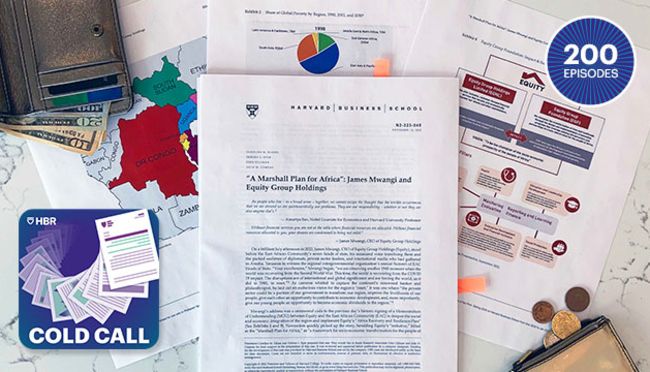
- 27 Apr 2023
Equity Bank CEO James Mwangi: Transforming Lives with Access to Credit
James Mwangi, CEO of Equity Bank, has transformed lives and livelihoods throughout East and Central Africa by giving impoverished people access to banking accounts and micro loans. He’s been so successful that in 2020 Forbes coined the term “the Mwangi Model.” But can we really have both purpose and profit in a firm? Harvard Business School professor Caroline Elkins, who has spent decades studying Africa, explores how this model has become one that business leaders are seeking to replicate throughout the world in her case, “A Marshall Plan for Africa': James Mwangi and Equity Group Holdings.” As part of a new first-year MBA course at Harvard Business School, this case examines the central question: what is the social purpose of the firm?

- 25 Apr 2023
Using Design Thinking to Invent a Low-Cost Prosthesis for Land Mine Victims
Bhagwan Mahaveer Viklang Sahayata Samiti (BMVSS) is an Indian nonprofit famous for creating low-cost prosthetics, like the Jaipur Foot and the Stanford-Jaipur Knee. Known for its patient-centric culture and its focus on innovation, BMVSS has assisted more than one million people, including many land mine survivors. How can founder D.R. Mehta devise a strategy that will ensure the financial sustainability of BMVSS while sustaining its human impact well into the future? Harvard Business School Dean Srikant Datar discusses the importance of design thinking in ensuring a culture of innovation in his case, “BMVSS: Changing Lives, One Jaipur Limb at a Time.”

- 18 Apr 2023
What Happens When Banks Ditch Coal: The Impact Is 'More Than Anyone Thought'
Bank divestment policies that target coal reduced carbon dioxide emissions, says research by Boris Vallée and Daniel Green. Could the finance industry do even more to confront climate change?

The Best Person to Lead Your Company Doesn't Work There—Yet
Recruiting new executive talent to revive portfolio companies has helped private equity funds outperform major stock indexes, says research by Paul Gompers. Why don't more public companies go beyond their senior executives when looking for top leaders?

- 11 Apr 2023
A Rose by Any Other Name: Supply Chains and Carbon Emissions in the Flower Industry
Headquartered in Kitengela, Kenya, Sian Flowers exports roses to Europe. Because cut flowers have a limited shelf life and consumers want them to retain their appearance for as long as possible, Sian and its distributors used international air cargo to transport them to Amsterdam, where they were sold at auction and trucked to markets across Europe. But when the Covid-19 pandemic caused huge increases in shipping costs, Sian launched experiments to ship roses by ocean using refrigerated containers. The company reduced its costs and cut its carbon emissions, but is a flower that travels halfway around the world truly a “low-carbon rose”? Harvard Business School professors Willy Shih and Mike Toffel debate these questions and more in their case, “Sian Flowers: Fresher by Sea?”

Is Amazon a Retailer, a Tech Firm, or a Media Company? How AI Can Help Investors Decide
More companies are bringing seemingly unrelated businesses together in new ways, challenging traditional stock categories. MarcAntonio Awada and Suraj Srinivasan discuss how applying machine learning to regulatory data could reveal new opportunities for investors.

- 07 Apr 2023
When Celebrity ‘Crypto-Influencers’ Rake in Cash, Investors Lose Big
Kim Kardashian, Lindsay Lohan, and other entertainers have been accused of promoting crypto products on social media without disclosing conflicts. Research by Joseph Pacelli shows what can happen to eager investors who follow them.

- 31 Mar 2023
Can a ‘Basic Bundle’ of Health Insurance Cure Coverage Gaps and Spur Innovation?
One in 10 people in America lack health insurance, resulting in $40 billion of care that goes unpaid each year. Amitabh Chandra and colleagues say ensuring basic coverage for all residents, as other wealthy nations do, could address the most acute needs and unlock efficiency.

- 23 Mar 2023
As Climate Fears Mount, More Investors Turn to 'ESG' Funds Despite Few Rules
Regulations and ratings remain murky, but that's not deterring climate-conscious investors from paying more for funds with an ESG label. Research by Mark Egan and Malcolm Baker sizes up the premium these funds command. Is it time for more standards in impact investing?
- 14 Mar 2023
What Does the Failure of Silicon Valley Bank Say About the State of Finance?
Silicon Valley Bank wasn't ready for the Fed's interest rate hikes, but that's only part of the story. Victoria Ivashina and Erik Stafford probe the complex factors that led to the second-biggest bank failure ever.

- 13 Mar 2023
What Would It Take to Unlock Microfinance's Full Potential?
Microfinance has been seen as a vehicle for economic mobility in developing countries, but the results have been mixed. Research by Natalia Rigol and Ben Roth probes how different lending approaches might serve entrepreneurs better.

- 16 Feb 2023
ESG Activists Met the Moment at ExxonMobil, But Did They Succeed?
Engine No. 1, a small hedge fund on a mission to confront climate change, managed to do the impossible: Get dissident members on ExxonMobil's board. But lasting social impact has proved more elusive. Case studies by Mark Kramer, Shawn Cole, and Vikram Gandhi look at the complexities of shareholder activism.

- 07 Feb 2023
Supervisor of Sandwiches? More Companies Inflate Titles to Avoid Extra Pay
What does an assistant manager of bingo actually manage? Increasingly, companies are falsely classifying hourly workers as managers to avoid paying an estimated $4 billion a year in overtime, says research by Lauren Cohen.
Financial Research Paper Topics: Interesting Finance Questions to Uncover
Are you having trouble thinking of a good topic for your finance research paper? Believe it or not, you are not alone. It might be difficult to find the perfect financial research topic time and time again. After all, picking the right subject is crucial to your financial field. Whether you’re putting together a presentation, penning an essay, or doing research papers, your choice of subject is of critical significance.
To aid you in overcoming this obstacle, we have compiled a detailed list of organized finance topics for research papers. If you want to be sure you choose the right subject for your financial management efforts, we’ve provided a concise guide with crucial advice.
How to Choose Topics for a Finance Research Paper?
If you need assistance deciding on a subject for your finance research paper, here are some pointers. But before we get into those pointers, it’s important to keep in mind that custom writing services may be a great resource for choosing finance topics for your research paper. You may save yourself time and effort by relying on their staff of seasoned writers to help you choose a subject that is both interesting and applicable to your assignment. The following are three guidelines for deciding on a subject for a finance research paper:
- Find Unanswered Questions : Try to pinpoint issues that haven’t received enough attention so far in financial research. You may add to the corpus of knowledge already available by identifying information gaps. Investigate financial management, traditional finance, corporate finance, personal finance and similar topics in order to develop a workable solution or to provide novel ideas.
- Review Existing Literature : Gaining familiarity with the state of the art in finance research requires reading theses and academic articles. Doing so will aid you in pinpointing certain niches in which you may excel. Search the literature for broad perspectives or recurring themes that might help you zero in on a particular issue.
- Stay Updated and Seek Input : Conduct internet research to keep up with the latest financial concerns. Investigate pressing concerns in the industry, such as the effects of the global financial crisis or new developments in the financial markets. You should also talk about your topic with others who have written research papers, such as your friends, classmates, or professors. Getting their thoughts might help you hone your subject and provide vital information.
Where to Get Data for Finance Papers?
It is crucial to get accurate and up-to-date information while conducting studies in the financial sector. One efficient method is to pay for papers or to hire a finance researcher and analysts to do the work for you, especially when it comes to personal finance.
- ProQuest is a significant tool since it provides access to scholarly literature from every field of study in the form of periodicals, newspapers, industry reports, dissertations, and profiles of prominent businesses.
- Scopus and Web of Science provide a plethora of resources, including journals, books, and conference proceedings, that provide comprehensive coverage across academic subjects.
- Global Financial Data (GFD) is one such database that caters only to finance research, and its extensive research has a wealth of data on various asset classes, prices, indexes, and currency exchange rates.
- Bloomberg, Thomson Reuters Datastream, and WRDS provide faculty and researchers with institutional access to a plethora of financial data and tools. This includes real-time market data, financial statements, economic indicators, and personal finance topics to write about.
List of Finance Research Topics
This exhaustive list covers everything you need, whether you’re an MBA student, a finance management professional, or a college student. Explore the exciting field of finance research, delving into areas like healthcare financing, the latest developments in the field, corporate finance, and the aftereffects of the global financial crisis. The finance research papers” in this volume will keep you interested and well-informed.
Finance Research Topics for MBA
Investment analysis, financial management, and personal finance are just a few of the many disciplines that fall under the umbrella of finance research subjects for MBA students. Such topics in finance are essential because they provide MBA students with a solid grounding in financial theory and practice. Here are a few suggestions for MBA students looking for research topics in finance:
- Risk Management Strategies in Financial Institutions.
- Behavioral Finance in Investment Decision-Making.
- Financial Inclusion and Economic Development.
- Comparative Analysis of IFRS Adoption and Financial Reporting Quality.
- Impact of Financial Technology (Fintech) on Traditional Banking.
Finance Management Research Topics
Finance management topics include a broad spectrum of areas that dive into the complexities of managing financial resources in different contexts. Investment analysis, risk management, financial markets, and corporate finance all fall under finance management. Writing a finance research paper helps you understand financial decision-making, develop effective strategies, and advance the field. Before commencing your research paper, consider the following finance research paper ideas:
- Corporate Risk Management Strategies On Firm Performance.
- Benefit Investment Management Practices In Pension Funds.
- Assessing Financial Risks And Mitigation Techniques In Developing Market Multinationals.
- Electronic Banking And Financial Inclusion In Developed And Developing Nations.
- An Empirical Study Of Investor Behavior And Global Finance Data.
Healthcare Finance Research Topics
Explore the application of financial theory to the healthcare sector while writing about finance research paper topics. This financial research is essential for expanding our knowledge of healthcare economics, investment strategies, cost control, and healthcare policy. Finance researchers may also investigate intricate monetary systems to enhance healthcare services and the health of patients. Some healthcare finance topics might include the following:
- Impact Of Healthcare Policy On Financial Sustainability.
- Cost-Effectiveness Analysis Of Healthcare Interventions.
- Healthcare Reimbursement Models And Their Impact On Healthcare Providers.
- Economic Evaluation Of Preventive Healthcare Programs.
- Healthcare Financing And Access To Care For Underserved Populations.
Interesting Finance Dissertation Topics
For the purposes of writing finance research papers and finishing a dissertation, investigating interesting finance topics is essential. You can gain a more thorough comprehension of economic principles and their real-world applications. In order to have a high-quality research paper done quickly and with no effort, it’s a good idea to look into help with dissertation writing services. For your next research paper, you can consider the following interesting financial topics:
- The banking sector and digital transformation: customer experience and operational effectiveness.
- Corporate risk management strategies in the banking industry: Traditional vs. developing risk management procedures.
- A case study of emerging nations and how well-functioning financial systems foster economic progress.
- Financial aid programs in promoting access to higher education
- A post-pandemic examination of banking institutions’ resilience and regulatory measures’ systemic risk mitigation.
Current Research Topics in Finance
Examining current finance research paper topics is essential due to the dynamic nature of the financial industry. By digging into current financial topics to write about, you learn more about the market, investing methods, risk management, and more. This financial research supports decision-making, policy-making, and the development of new financial solutions. Here are a few lists of subjects to consider if you are looking for current financial topics to write about.
- Financial Statement Analysis And Investment Decisions In Different Industries.
- Exploring The Effectiveness Of Machine Learning Algorithms In Predicting Financial Asset Prices.
- The Role Of Financial Derivatives In Managing Risk And Enhancing Returns In The Business Sector.
- Corporate Governance Practices On Financial Performance And Asset Valuation.
- Sustainable Finance Projects In Promoting Environmental, Social, And Governance (ESG) Goals.
Best Finance Research Topics
A finance research paper topic requires the identification of intriguing subjects for extensive research. The best financial research opens the door to explorations of many facets of finance, including investing tactics and the stock market. As you start to write research papers on finance topics, you’ll open up opportunities for self-discovery, theory-building, and prudent decision-making. You’ll also help them become better researchers and writers, leading to better articles.
- Artificial Intelligence and Financial Decision-Making.
- Financial Risk Management in the Age of Cryptocurrencies.
- Behavioral Finance and Investment Decision-Making.
- The Effectiveness of Financial Regulations in Preventing Market Manipulation.
- The Role of Fintech in Financial Inclusion: Case Studies from the United States.
Interesting Finance Topics for College Students
Among the many subsets that make up the umbrella term finance topics for college students are financial research and finance topics for paper. Financial research topics are important because they help students learn the fundamentals of finance, get them ready for the issues they’ll face in the real world, and develop the analytical thinking they’ll need to make sound judgments in the future. Here are a few examples of finance topics to talk about among college students:
- A Comparative Study of E-commerce on Traditional Retail Banking.
- Comparing Interest Rate Changes with Stock Market Volatility in Developed and Emerging Markets.
- The Effectiveness of Microfinance Institutions in Alleviating Poverty.
- Financial Education Programs and College Students’ Financial Decision-Making.
- Initial Public Offering (IPO) Underpricing: Comparative Study of Developed and Developing Markets.

Finance Research Paper Topics for University Students
Investing, banking, corporate finance, and other areas fall under the umbrella of finance-related topics for the purposes of a university research paper. Because it deepens their knowledge, sparks new ideas, and helps the financial sector expand, topics in finance are more important for college students to study. Students who buy custom assignments benefit from individualized attention, time savings, and the insight of subject matter experts. Check out our extensive finance research topic list to uncover interesting topics for your next paper.
- Interest Rate Changes On Corporate Borrowing And Investment Decisions.
- Financial Literacy And Investment Behavior Among University Students.
- Impact Of International Trade And Globalization On Financial Markets.
- Factors Influencing Mergers And Acquisitions In The Financial Industry.
- Financial Derivatives In Managing Risk In The Stock Market.
Public Finance Research Topics
Research Topics in Public Finance include a broad spectrum of questions concerning fiscal and monetary policy at the national, state, and local levels of government. Understanding the effects of government spending and fiscal policies on GDP growth, income distribution, and social welfare is essential, which is why studies in this field are so important. Policymakers can do better for the world when they have access to information on financial research paper topics to read about.
- The potential of digital currencies as financial assets in public finance management.
- Impact of Tax Policy on Economic Growth: A Comparative Study.
- Government Debt and its Implications on Fiscal Sustainability.
- Public-Private Partnerships in Infrastructure Development.
- Effectiveness of Fiscal Stimulus Packages in Times of Economic Crisis.
Corporate Finance Research Topics
Corporate Finance Research explores various financial management topics within businesses. Conducting research in this area is crucial for understanding financial decision-making, risk management, capital structure, and valuation. It helps companies optimize their financial strategies, make informed investment decisions, and enhance overall financial performance.
- Corporate Governance and Financial Performance: An Industry Comparison.
- Debt Financing in Manufacturing Sector Corporate Investment Decisions.
- Corporate Taxation and Capital Structure Decisions: A Comparative Study of Countries.
- Corporate Venture Capital and Startup Financing: A Comparative Analysis.
- Corporate Governance Mechanisms and Capital Allocation Efficiency: Emerging Markets.
Business Finance Research Topics
Subjects that fall under the umbrella of business finance topics include any and all discussions of how businesses handle their money, from budgeting to investing to making important business decisions. Researching business finance is essential since it reveals new tendencies, aids in the creation of cutting-edge tactics, and boosts monetary output. It helps companies maintain competitiveness in a fast-paced industry and make well-informed choices. These samples can assist you whether you are looking for financial research paper topics or investment research paper ideas.
- Corporate Social Responsibility and Financial Performance.
- Exchange Rate Fluctuations on International Business Transactions.
- Financial Innovation and SME Financing.
- Financial Markets in Economic Development.
- Financial Leverage and Firm Value in Different Industries.
Related posts:
- Proposal Essay Topics Ideas
200 Best Ideas for Research Paper Topics in 2023
- Good Essay Topics & Ideas for College by Edusson
- Medical Research Paper Topics: Ideas on Healthcare and Medical Science
Improve your writing with our guides

Psychology Essay Topic: Theories Explaining Human growth and Development
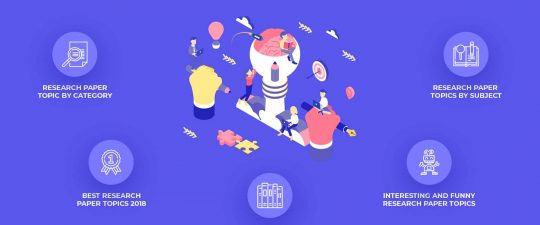
Reflection Paper Topics: Art
Get 15% off your first order with edusson.
Connect with a professional writer within minutes by placing your first order. No matter the subject, difficulty, academic level or document type, our writers have the skills to complete it.
100% privacy. No spam ever.


25,000+ students realised their study abroad dream with us. Take the first step today
Here’s your new year gift, one app for all your, study abroad needs, start your journey, track your progress, grow with the community and so much more.

Verification Code
An OTP has been sent to your registered mobile no. Please verify

Thanks for your comment !
Our team will review it before it's shown to our readers.

Dissertation Topic in Finance
- Updated on
- Jan 11, 2024

Also known as the study of investments, Finance is a combination of two interrelated subjects – how money is handled and the process of obtaining money. One of the reasons why postgraduate students struggle with their Finance dissertation topics is that they do not spend enough time planning it. It is important for students to be extremely careful while writing a finance dissertation as it contributes a lot to their respective degrees. This blog provides you with the best topics, a dissertation structure, and more.
This Blog Includes:
What is a finance dissertation, why finance dissertation topics are important, tips to find excellent dissertation topics on finance, writing tips for finance dissertation, how to plan your work on a finance dissertation, how to structure a finance dissertation, finance dissertation general topics , topics related to india, mba dissertation topics, banking dissertation topics , accounting dissertation topics, research project example, final consideration and conclusion.
Finance dissertations, as the name implies, are pieces of writing that study a certain finance topic chosen by the student. The subjects covered include anything from the stock market to banking and risk management to healthcare finance. This dissertation gives the student academic self-assurance and personal happiness in the subject of finance. Finance writing necessitates substantial research in order to produce a compelling report.
The majority of students have no idea why finance dissertation themes are so crucial. However, put yourself in the shoes of your lecturer. You’ve already read hundreds of theses. The majority of them covered the same ground — issues that you’re already tired of hearing about. Then there’s a topic with a distinct, intriguing theme. Something that piques your interest and entices you to read more. Wouldn’t you give those pupils some extra credit? You’d do it! This is why there are so many fantastic finance dissertation topics. You can get extra points for your efforts. The topic of your paper might mean the difference between a good and a terrific grade.
It’s difficult to come up with anything unique and interesting. There are, nevertheless, ways to come up with interesting ideas. Here are a few pointers on how to locate them:
- Read a fantastic finance dissertation and find for areas where further study is needed.
- Go to the library and read a couple theses to get some ideas.
- Inquire with a writing agency about some ideas from one of their professional dissertation writers.
- In writing forums and blogs, ask for assistance. If you ask gently, people will give you some excellent suggestions.
- Look for ideas on the internet, but don’t use them exactly as they are. Make them distinctive by changing them.
- Talk to other students who are working on their dissertations and find out what other ideas they had before settling on the present topic.
- Narrow down your topic : Your financial topic should be narrowed down to a certain niche. It should concentrate on a single area, such as microfinance, microfinance, or online banking.
- Verify your facts: Finance is a topic that requires a great deal of logical analysis of statistical data. As a result, double-check facts and statistics using credible sources before using them in your paper.
- Write concisely: You should condense a financial paper into a tight, succinct work, unlike other papers with extended narrative narratives. At this length, the adage of ‘short is sweet’ theoretically applies.
- Arrange your data neatly: A report that is crammed with numbers and graphs may turn off a reader at first glance. Know how and when to utilise your data for a great financial thesis.
- Write simply: Avoid using jargon that might be confusing to a non-technical reader. When technical terminology are required, utilise accessible examples to convey them. In a finance dissertation, simplicity is king. So make good use of it.
Dissertation submission is very important to obtain a PG Degree. You are supposed to submit the work by the end of your study course, so by the last year of your degree, you may have got enough ideas and problems dealing with finance. While starting with a finance dissertation topic you should always remember that the purpose of a Finance Dissertation is to demonstrate your research ability, how you analyze specific data and come up with a conclusion. Mentioned below is a step to step guide for you to start working with:
Step 1 : Choose a relevant and interesting topic for your research
Step 2 : Discuss and receive feedback from your supervisor
Step 3 : Finalise the research methods to prove the significance of the selected topic
Step 4 : Gather the required data from relevant sources
Step 5 : Conduct the research and analyse the acquired results
Step 6 : Work on the outline of your dissertation
Step 7 : Make a draft and proofread it. Discuss with your advisors if any changes are to be made
Step 8 : Make the required corrections.
Step 9 : Draft the final dissertation
Also Read: Check out the Top Course in Finance
There are so many different ways you can structure your dissertation. But the most common and universally accepted way is as follows:
- Introduction
- Literature review
- Methodology
- Analysis of the data and Significance/Implications of the acquired results
Also Read: Executive MBA in Finance
Finance Dissertation Topics
Finance is an extensive field, you can explore a lot of areas related to finance to choose a dissertation topic. Here we’ve mentioned the best finance dissertation topics to make it easier for you:
Mentioned below are some of the topics related to the recent issues in the world:
- The negative impact of microfinance in developing countries.
- The effects of population growth on economic growth in China
- Cryptocurrency: Are we ready to digitalise the monetary world?
- Analyzing the financial statements of VISA and MasterCard
- Why do banks oppose digital currency?
- Risks and benefits associated with digital money transferring technology
Also Read: Top MBA course to pursue
- Investing in India’s technology sector – obstacles and opportunities
- Foreign investment and its effects on economic growth in India
- The effect of corporation investments in the economic development of the community
- Comparing financial development in Asia and Europe
- Did the banks help Small Medium Enterprises to grow in India in the last 5 years?
- The Indian Economic Crisis of 1991
Best MBA Dissertation Topics
Be careful while choosing an MBA Dissertation Topic as it involves more intense study. Make sure the topic you’ve chosen remains within your field of study. We’ve listed some of the best topics you can choose for an MBA Dissertation:
- Management skills an entrepreneur need
- The place of communication for effective management in the workplace
- How technology took over management
- The impact of good leadership in an organization
- How does a strong social media presence affect a company’s marketing strategies?
- Human resource management in non-profit organizations
- The importance of employee motivation programs on productivity
- Management’s socio-cultural background and how it influences leadership relationships
- How do employment benefits impact employee and company’s productivity?
- Business team performance in multinational corporations
Best Finance Universities in the USA
- Study on Future Options in Markets in India
- Gold as an Investable Commodity in India
- Study on Impact Of Corruption On FDI Inflows In India
- The Impact Of The Money Supply On Economic Growth In India
- Capital Structure Of The Business Enterprises In Delhi NCR
- GST And Its Effect on MNC Manufacturing Companies
- Analysis of the Insurance Industry in India
- Analysis of HDFC Bank Finance
- Comparative analysis of HDFC Bank with ICICI bank
- Comparison of Market Share in Public Sector Banks VS Private Sector Banks
- The impact of online banking on the world.
- Risk factors and security issues that are inherent in online banking.
- Fraud and identity theft is accomplished via internet banking.
- Advantages and disadvantages of internet banking for consumers.
- Risk management in investment banking
- The rise of growing banking sectors in developing nations.
- Issues surrounding banking in China’s growing economy.
- The impact of the Federal Reserve on the United States and global economy
- Banking and asset-liability in management.
- The strategies to use online banking technology to attract customers.
All you need to know about a Banking Course
- Case study of the impact of industry and public knowledge on the market share index’s fluctuation
- Significance of auditing for large corporations
- Examining India’s country’s tax scheme
- What to consider when investing in financial markets?
- From an accounting perspective, risk-taking in companies and its effects
- Evaluate the differences and similarities between external and internal auditors
- Can taxation be considered a human rights policy? Analyse the problem
- What are the consequences of India’s current tax structure on individuals with a lower income?
Accounting courses
We’ve included a Finance Dissertation Research Example with reference to a Finance Dissertation Structure:
- The Indian Economic Crisis of 1991 – The title of your Finance Dissertation must focus on your research objective.
- Abstract – The 1991 Indian economic crisis was…………….. imports and other external factors. The abstract part must include a summary of the research problem or objective of the research, the research design and a summary of the results.
- Introduction – The introduction must reflect your research on the Indian Economic Crisis of 1991 in a way that the audience already gets to know what the research is going to include.
3.1 Background (background of the study)
3.2 Problem Statement (significance of the problem in context)
3.3 Purpose/Research Questions (What caused the Crisis, how was the crisis revived etc.)
- Review of Literature – The Review of Literature Section must include a theoretical rationale of the problem, the importance of the study, and the significance of the results.
- Methodology – The Methodology Section must include the description of the subjects, research methods used in the data collection and any limitations issues involved.
- Significance/Implications (Results of the Discussion)
*Please note that the above-mentioned structure is only for your reference to get an idea of writing a Finance Dissertation.
Choosing the right topic for your Finance dissertation to plan the work, all the above-mentioned aspects must be given equal importance. This blog has included the best dissertation topic in finance in MBA, accounting, and banking you can choose while writing a dissertation.
Finance research papers and dissertations should be prepared in a way that answers the core question while also being relevant to the remainder of the study. For example, if the dissertation’s major question is “what is the link between foreign exchange rates and the interest rates of a specific country,” the dissertation should provide suitable illustrations to help illustrate the topic. It should also go through the major and minor concerns that are relevant to this topic. Furthermore, utilise proper language to ensure that the article is readily understood by readers. The overall purpose of the project is to produce a well-written, well-researched, and well-supported dissertation.
It takes around 2 years to complete an MBA in India while 1 year to complete a full-time MBA in other countries.
A finance dissertation must be 100-300 pages long.
It takes around 5 years to obtain a Doctorate in Finance.
Hopefully, this blog assisted you in finding out your finance dissertation topics and structure for your course. If you require any assistance regarding your application process while enrolling for your further studies, our experts at Leverage Edu are just one click away. Call us anytime at 1800 572 000 for a free counselling session!
Damanpreet Kaur Vohra
Daman is an author with profound expertise in writing engaging and informative content focused on EdTech and Study Abroad. With a keen understanding of these domains, Daman excels at creating complex concepts into accessible, reader-friendly material. With a proven track record of insightful articles, Daman stands as a reliable source for providing content for EdTech and Study Abroad.
Leave a Reply Cancel reply
Save my name, email, and website in this browser for the next time I comment.
Contact no. *

Leaving already?
8 Universities with higher ROI than IITs and IIMs
Grab this one-time opportunity to download this ebook
Connect With Us
25,000+ students realised their study abroad dream with us. take the first step today..

Resend OTP in

Need help with?
Study abroad.
UK, Canada, US & More
IELTS, GRE, GMAT & More
Scholarship, Loans & Forex
Country Preference
New Zealand
Which English test are you planning to take?
Which academic test are you planning to take.
Not Sure yet
When are you planning to take the exam?
Already booked my exam slot
Within 2 Months
Want to learn about the test
Which Degree do you wish to pursue?
When do you want to start studying abroad.
September 2024
January 2025
What is your budget to study abroad?

How would you describe this article ?
Please rate this article
We would like to hear more.

About Cambridge Judge
- Overview of the Business School
- History and today
- External recognition
- Diversity and inclusion
- Virtual tours
- Jobs at Cambridge Judge
- Giving overview
- Fundraising priorities
- How to give
- Impact and recognition
- Recruiters and organisations overview
- Recruit from Cambridge Judge
- Student consultancy projects
- Develop your talent
- Corporate speaker opportunities
- Special interest groups and societies
- News overview
- Announcements
- Programme news
- Student and alumni news
- Faculty news
- Research centre news
- Fundraising news
- Media coverage
- News room (for journalists)
FT Responsible Business Education Awards: 2 wins for Cambridge Judge
Purpose of Finance course wins top Teaching award and a study on paedophile hunters wins Academic Research award, while Cambridge Judge is Highly Commended for School-wide activities in the Financial Times awards for business education responsibility and impact.
Degree programmes
- Masters degrees overview
- Executive MBA
- Executive Master of Accounting
- Master of Finance (MFin)
- MSt in Entrepreneurship
- MSt in Social Innovation
- MPhil in Management
- MPhil in Technology Policy
- PhD and research masters overview
- PhD pathways
- Business Doctorate
- Master of Research in Management
MPhil in Finance
- MPhil in Innovation, Strategy and Organisation
- MPhil in Strategy, Marketing and Operations
- Management Studies (Tripos)
- Virtual tours of the Business School
Cambridge life
- Entrepreneurship at Cambridge Judge
- Financial aid
- Admission events
Non-degree programmes
- Entrepreneurship programmes overview
- Accelerate Cambridge
- Enterprise Tuesday
- Venture Creation
- EnterpriseTECH
- EnterpriseWOMEN
- Social Venture Weekend
- First Certificate in Business overview
- For learners
- For organisations
- Executive Education overview
- Online ExecEd programmes
- Open programmes for individuals
- Custom programmes for organisations
Need help funding your degree programme studies at Cambridge Judge?
Explore our scholarship and loan opportunities.
Executive Education
- Open programmes for individuals overview
- Programme finder
- New programmes
- Online programmes
- Managing People
- Managing Organisations
- Environmental, Social and Governance (ESG)
- Strategy and Growth
- Innovation and Technology
- Professional Service Firms
- Custom programmes for organisations overview
- Open programmes for organisations
- Clients and case studies
- Psychometric services
- Professional service firms
- Certificate of Achievement
- B Corp certification
- Digital certificates
- Visa information
- Meet the team
Not sure which programme is for you?
Search our portfolio of over 40 well-crafted programmes that will expand your skills and understanding in service of your organisational, personal development and career objectives.
- Research and teaching staff
- Honorary appointments
- Subject groups overview
- Economics and Policy
- Operations and Technology Management
- Organisational Behaviour
- Organisational Theory and Information Systems
- Strategy and International Business
- Research centre finder
- Alternative Finance
- Behavioural Economics and Policy
- Business Research
- Chinese Management
- Circular Economy
- Digital Innovation
- Endowment Asset Management
- Energy Policy Research Group
- Entrepreneurship
- Experimental & Behavioural Economics Group
- Finance, Technology and Regulation
- Financial Reporting and Accountability
- Health Leadership and Enterprise
- India and Global Business
- International Human Resource Management
- Process Excellence and Innovation
- Psychometrics
- Regulatory Genome Project
- Risk Studies
- Social Innovation
- Wo+Men’s Leadership
- Impact and practitioner engagement overview
- Collaborate with our faculty
- Publications overview
- The Cadbury Archive
- Information and Library Services overview
- Research seminars
Faculty and research
- AI and technology
- Behavioural economics
- Career and personal development
- Entrepreneurship and innovation
- ESG and sustainability
- Equality, diversity and inclusion
- Finance and accounting
- Future of work
- Global strategy and international business
- Governance, economics, and policy
- Leadership and organisational behaviour
- Operations management
- Philanthropy
- Social impact

Exploring the rise of the global B Corp movement
The B Corp movement is helping to shift the focus of capitalism from shareholders to all stakeholders: find out how Cambridge fits in.
Find an expert
We have faculty, who can speak on many current UK and global issues, and are happy to be contacted by journalists.
- All insights
- Alumni council
- Regional Alumni groups
- Alumni Special Interest Groups (ASIGs)
- Alumni toolkit
- Alumni profiles
- Get involved
- CJBS network
- CJBS Connects: Worldwide
Join us in achieving real world impact
We invite you to invest in our future and help us to remain at the forefront of global business research and education.
- PhD & research …
MPhil in Financ…
The MPhil in Finance is an intensive 9-month programme, ideal for those who wish to extend their knowledge of finance or financial engineering. Combining advanced study and research, this pre-experience programme will give you a strong academic background for a PhD or career in finance.
- Curriculum overview
- Core courses
Career impact
Class profile, programme details, october 2024.
Prep Maths & Stats September 2024
You must be resident in Cambridge during your programme
Prepare for a career in finance
Now in it’s 35th year, it’s the oldest masters degree in finance available at the University of Cambridge. You’ll get the chance to study with 3 world-class faculties at a university which has produced more Nobel Prize winners than anywhere else.
The programme stands out for bringing together faculty from:
- Cambridge Judge Business School, one of the top business schools in Europe
- the Faculty of Economics, the cradle of modern economics
- the Faculty of Mathematics, whose ancestry goes back to Isaac Newton
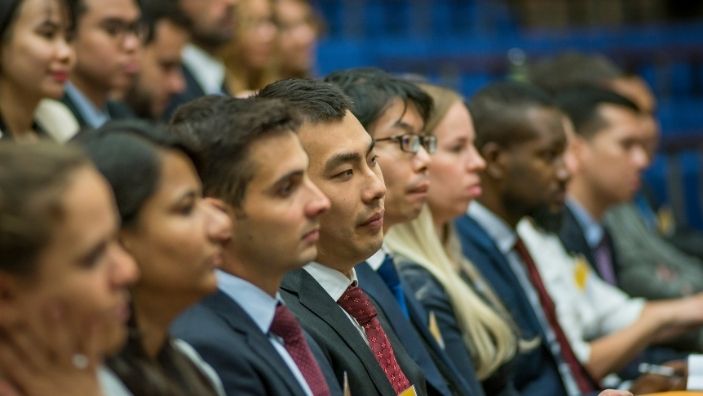
Why Cambridge Judge Business School?
We’re part of one of the world’s most prestigious research universities. We draw on disciplines and expertise from across the University of Cambridge. We leverage the power of academia for real-world impact.
At Cambridge you will:
- be part of Cambridge’s legacy of learning
- join your Cambridge College and University alumni networks
- access the University’s excellent careers service
The curriculum consists of 6 core courses and 3 electives. You will gain essential knowledge on topics, like corporate finance and asset pricing, and tailor your learning by choosing both core courses and electives. Depending on your course choices, you’ll share some classes with other University of Cambridge masters students.
You will start your MPhil with a mandatory online pre-course in mathematical and statistical methods, engage in advanced study, research, projects and coursework for the duration of the programme, and on completion of your degree, you may continue on to a PhD or an industry role.
Explore the MPhil in Finance curriculum
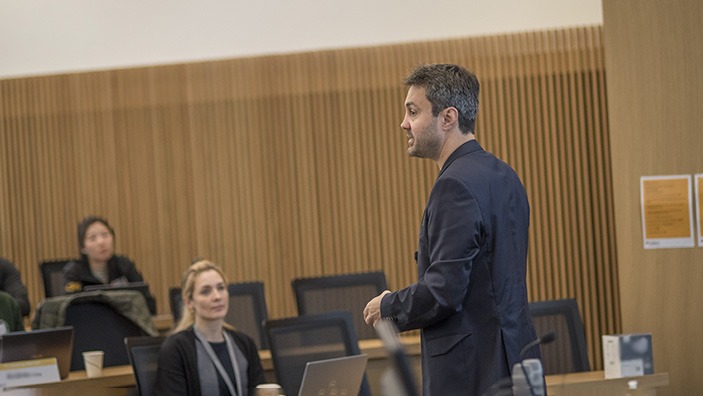
Who we’re looking for
The MPhil in Finance is an advanced degree programme that attracts bright students, from all parts of the world and from vastly diverse backgrounds. They learn from each other, contribute to the stimulating classroom experience and make friendships that last a lifetime.
The Master of Philosophy in Finance is for you if:
- you have no more than one year of work experience after your first degree
- you have a UK First-Class Honours degree or international equivalent
- your first degree contained a significant finance or quantitative component
- you wish to continue to the PhD at Cambridge or elsewhere
Learn more about our current MPhil class.
Applying for the MPhil Finance
Entry to the MPhil programme is highly competitive, so we advise you to apply early, especially if you wish to be considered for funding.
Application deadline and process
Applications for entry in 2024 are now closed. Admissions for 2025 will open in September 2024.
Check out our step-by-step guide on how to apply.
Fees and funding
Tuition fees for the 2024/25 MPhil in Finance class are: £17,022 (home status) or £41,694 (overseas/international status).
Discover more about the mix of student loans and scholarships available to help support your study goals.
Progress to a rewarding academic research or industry career.
Explore what the historic and dynamic city of Cambridge has to offer and what makes studying here so special.
Student experience
Find out what to expect as a student at Cambridge Judge Business School and what it means to join one of the oldest and most prestigious institutions in the world.
Learn more about the application process and deadlines
Explore fees and funding options
Contact the admissions team
Is the MPhil in Finance a research or taught programme?
The MPhil in Finance is classified as a taught programme for HESA purposes; however, within the structure of Cambridge Judge it is part of the research-oriented programmes.
Can I visit Cambridge Judge Business School/talk to faculty or someone from Admissions in person?
Due to the large number of applications we receive, it is not possible for staff to arrange meetings with individual candidates.
The team is also able to answer any queries you have via the online query form.
Do you hold “open days” for MPhil programmes?
The University of Cambridge Postgraduate Open Day is usually in November. Visit the Postgraduate Admissions Events page for more details .
- Skip to content
- About Accessibility on our website

- Staff Directory
- University Home
- Postgraduate Research
- Our Research Areas
Introduction
Specialising in applied finance, particularly corporate finance and governance and with significant expertise in asset pricing, financial economics and banking.
Study Information
At a glance, want to know more.

The PhD programme provides an opportunity to undertake original research into a wide variety of areas. The department has a lively team of academic staff, with their own individual research topic areas. Our research aims to improve the understanding of today’s business and policy implications. The finance staff is engaged with practitioners and academic institutions within the UK and abroad.
Our PhD program is aimed at those who wish to become experts in a specialised finance field. Our purpose is to involve PhD students in our areas of expertise, providing them with a strong setting in which to pursue their research, and encouraging and helping with publication. As a research graduate, you will be equipped to design and conduct high-quality research and encourage to present your work both within the department and at international conferences. To support research and teaching, the group benefits from database subscriptions, including Datastream, Thomson ONE banker and Bloomberg.
In the first year, students are normally encouraged to study several chosen courses in applied finance which will develop their quantitative and qualitative research skills as well as their knowledge of the finance research literature and methodologies. An appropriate programme of study is developed for each student in consultation with the candidate’s supervisor.
Our Research
The Finance group research themes focus on:
- Financial economics, corporate finance & corporate governance
- Asset pricing & applied financial econometrics
- Banking & financial institutions
- Financial technology & applied mathematics
- Find out more about our staff research interests on our departmental pages.
- Further information on our doctoral programme
Research Interests
Corporate finance & financial economics.
To explore capital structure decisions under capital market imperfections. Specifically, issues related to capital structure and firm behaviour. The examination of dividend policy, corporate governance, financial development, financial distress and bankruptcy.
Experts : Professor Gerhard Kling , Dr Filipa Da Silva Fernandes , Dr Daniel Gyimah , Dr Laura McCann , Dr Huong Vu , Dr Seungho Lee , Dr Fotios Papadimitriou , Dr Yaodong Liu
More information about the team
Asset Pricing, Capital Markets and applied financial econometrics
To undertake research in empirical testing of asset pricing models. This could cover topics such as time-series properties of asset returns (i.e. predictability, volatility), cross-sectional properties of asset returns (i.e. CAPM, factor models) and the pricing of equity index derivative securities financial frictions on asset markets.
Experts: Professor Angela Black , Dr Fotios Papadimitriou
More information about the experts
Banking and financial services
To explore research in the area of banking and financial markets, specifically on topics related to bank efficiency, financial stability, credit markets, investment efficiency.
Experts: Dr Chunxia Jiang , Dr Filipa Da Silva Fernandes
Financial technology and applied mathematics
To conduct research on cryptocurrencies/FinTech related subjects. Specifically, the links between cryptocurrency and international investment markets, market efficiency of cryptocurrencies, the price/volatility relationship among cryptocurrencies.
Experts: Professor Gerhard Kling , Dr Seungho Lee , Dr Seungho Lee
Entry Requirements
The applicants of our research degree should usually possess a good Master’s degree (or overseas equivalent), with a significant component in the finance area.
Your proposed research topic should be in an area in which supervision can be offered. As such, the potential candidate may find it helpful to consider the current research interest of our staff before submitting an application.
Required documentation
Applicants should submit:
- Transcripts/degree certificate
- Two references
- A research proposal (3,000 words maximum)
- Name of potential supervisor
View Details of our current staff and their research interests
If English is not your first language you must also show evidence of attaining standards in English. Details of English language criteria.
International Applicants
- Information about visa and immigration requirements
- Information regarding country-specific entry requirements
Fees and Funding
View the tuition fee rates
Further Information about tuition fees and the cost of living in Aberdeen
Our Funding Database
View all funding options in our Funding Database .
PhD graduates in Finance can work in government departments, central banks, a variety of financial institutions and multinational corporations. At the Business school many of our PhD graduates also go on to forge successful academic careers in other top Universities.
Get in Touch
Contact details.
- Email Us [email protected]
- Call Us +44 (0)1224 272796
- Enquire Now Using an online form

- Search This Site All UCSD Sites Faculty/Staff Search Term
- Business is a Science
- Dean’s Office
- UC San Diego's Business School
- 20th Anniversary
- Career Impact
- Student Experience
- Centers of Excellence
- Our Partnership With San Diego
- Equity Diversity, and Inclusion
- Explore by Program
- Full-Time MBA
- Part-Time MBA (FlexEvening)
- Executive MBA
- Full-Time MSBA
- Part-Time MSBA (FlexMSBA)
Master of Quantitative Finance (MQF)
- Master of Professional Accountancy (MPAc)
- Ph.D. Program
- Undergraduate Programs
- Executive Education
- Faculty & Research Overview
- Research Faculty
- Other Faculty
- What We Are Working On
- Research Seminars
- Faculty Recruitment
- Engage with Rady
- Recruit Rady Talent
- Hiring Rady Graduates
- Where Our Graduates Work
- Corporate Projects
- Connect with Rady
- Connect with us
Upcoming Events
- Request Information
- Venue Rental
Take a Virtual Tour
- Incoming Rady Students
Current Students
- Rady Alumni
- Join the Rady Network
- Career Development
- Get Involved
Master of Quantitative Finance
Distinctly quantitative, combining data science and financial modeling.
The Rady Master of Quantitative Finance prepares you to analyze the large — and often multiple — real-time data sets that drive financial decision-making and risk management. Many of the empirical methods you’ll use have emerged from UC San Diego’s own world-renowned econometrics research. This emphasis on empirical data-driven methods sets the Rady degree apart from other finance master programs.
You’ll graduate technically proficient and ready to be a sought-after colleague, collaborator and incisive decision-maker.

“My Life at Rady has been amazing. I’ve had the chance to meet some fantastic people who have a passion for finance and are extremely smart.” - Noah Conlon , MFin '22
Key Differentiators
Stem designated.
Our STEM designation ensures that you will be equipped with the strong quantitative and analytical skills in demand by top employers.
CFA and GARP affiliate
Scholarships for exams and topical industry seminars and meetings are available to MQF students as a benefit of the program’s academic affiliate status.

- Stats & Stories
Meet our students and learn about their experience in the MQF program.
Your coursework emphasizes cutting-edge methods for analyzing big data for financial decision-making and risk management.
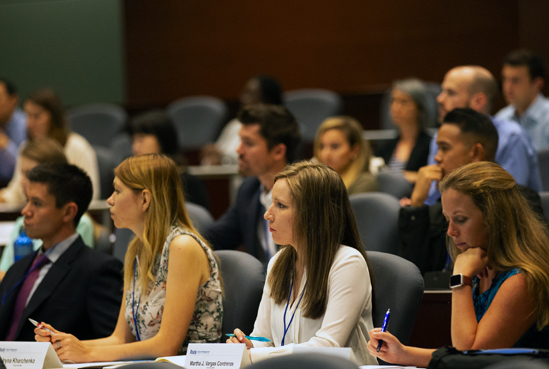
Meet a Few of our Master of Quantitative Finance Students and Alumni
Read first-hand stories about their Life at Rady, and how the data-driven coursework and support from professors helped them land amazing roles.
Meet our Students

Career Impact See where a MQF degree can take you — and where our graduates work now.
Student Experience Our community is genuinely inclusive and collaborative — relationships have real staying power. Learn more about the Rady School student experience .
Admissions Learn more about program qualifications , the admissions process , and program deadlines, or contact us to meet an admissions advisor.
Tuition and Aid Everything you need to know about costs and fellowship and scholarship opportunities.
Donors & Investors
Military/Veterans
Companies and Recruiters
Contact Admissions
Schedule a Visit
Maps & Directions
- Annual Security and Fire Safety Report
- Open Staff Positions
- Tuition & Aid
- Program FAQs
Finance Dissertation Topics & Accounting Dissertation Topics
Choosing a great topic for your finance or accounting dissertation may seem incredibly challenging, especially since the subject can cover such a wide range of different areas. It is important to find a topic that you are passionate about and find genuinely interesting, but is also relevant, manageable, and potentially helpful with regards to your future career path. Plus, you want a topic that will impress your dissertation advisor and fall within their area of expertise. There are clearly a lot of things to consider, so to give you some inspiration and help get you started, we have come up with several lists of potential topics in all sorts of areas within the subject of finance and accounting.
- Covid-19 and its Impact on Financial Services Dissertation Topics
- Cryptocurrency Dissertation Topics
Audit in Financial Services Dissertation Topics
- Risk Management – Capital, Liquidity, ALM, Models Dissertation Topics
Internet Banking & Digital Journey for Banks Dissertation Topics
Ethics in accounting dissertation topics, microfinance dissertation topics, retail and commercial banking dissertation topics, financing in emerging market dissertation topics, alternative investment dissertation topics.
- Corporate Social Responsibility (CSR) of Banking Industry Dissertation Topics
Accounting Standards Dissertation Topics
Education, perception and gender bias in accounting dissertation topics, covid – 19 and its impact on financial services dissertation topics.
Covid 19 has been a global pandemic and it has been seen to have grave impact on the overall world economy. The global and far reached impacts of the Covid 19 pandemic have made it an interesting topic of research. Some of the related topics for accounting and finance domain are:
- Does Covid-19 open an opportunity for digitization?
- Impact of covid on ecommerce industry.
- Covid and the rise in NPAs in Banks.
- The consequences of the Corona pandemic for future financial statements: A case Study.
- Are the companies becoming conservative in their forecasts after Covid 19?
- Digitalization in auditing and modified audit opinions in the post covid world.
- Do companies need to account for a better insurance policy after Covid 19?
- Provisioning and impairment by Banks and financial institutions. What impacts will it have on the balance sheet?
Cryptocurrencies Dissertation Topics
Recently in last couple of years, cryptocurrencies have gathered the attention of all investors and they have emerged as a lucrative asset class for investment. However, it is equally important that the topic is well read and well researched. The information on crypto currency is very fragmented and there is little academic research available on the topic. Some of the dissertation titles proposed are:
- Does crypto market follow the technical analysis?
- How to measure the risk and returns in cryptofinance market.
- Are crypto market returns sustainable?
- Under the supremacy of Bitcoin and Ethereum, what is the investment potential of other alt coins?
- Are cryptocurrencies a good asset for swing trading?
- Using a derivative strategy, is it possible to make cryptocurrencies less volatile?
- Comparison on cryptocurrencies with other asset classes.
- Asset pricing for cryptocurrencies. Do the regular theories work in this case?
- What is the scope for derivative products in crypto currencies?
- Cryptocurrency: Are we ready to demonetize the world?
- Why banks oppose digital currency so fiercely?
Audits have always been an interesting topic for the regulators and the stakeholders. They are always seen as a cost centre for the companies but invariably end up strengthening the controls for them. Also there have been a lot of new trends and technologies emerging in the field. Some of the topics for audits and their contribution to financial services are:
- Audits and their contribution to corporate houses.
- The Effectiveness of Internal Audit and Internal Control Systems in UK financial system.
- Are the BASEL rules successful to enhance the liquidity and controls for the banks?
- Role of Automation and RPA in the audit industry.
- Can auditors play the role of risk managers within a Bank or they are just cost centers?
- Effect of Internal Audit on financial performance of companies.
- Role of Auditors in financial reporting. A case study of Enron and WorldCom.
- Effectiveness of audits in the financial system of UK.
- The effect of risk-based audit approach on the enterprise risk strategy of the financial institution.
- The changes brought to Auditor-client relationships in the UK due to the Sarbanes-Oxley Act.
- Audit Committees and agency problems with the UK Corporate Governance Code.
Risk Management – Capital, Liquidity, ALM, Models Dissertation Topics
The Federal Reserve System has established a banking risk framework that consists of six risk factors: credit, market, operational, liquidity, legal, and reputation risks. All of the above-mentioned factors are an integral part of any financial institution’s risk management policies and the compliance mechanism which ultimately has a significant impact of the cusses of the institution.
Finance dissertation topics in risk management could include:
- Liquidity risk management in the UK banking industry in the wake of the financial crisis.
- An evaluation and analysis of the risk/return profile of selected UK banks.
- Operational risk & business continuity plans in the UK Banking Industry.
- Risk management aspects of international banking activities in Europe: nature, scope, and analysis.
- Foreign exchange risk management within financial institutions in the UK.
- The liability management of two local leading banks in the UK in the past five years: A comparative analysis.
- Advantages of using options for the management of risk in the banking industry.
- A stress testing approach towards evaluating credit risk of a financial institution.
- Case study on growth, liquidity, turnover, risk and return of a financial institution: Analysis and discussion.
- The potential impact of the loss of passporting after Brexit on the UK financial services industry.
- The potential impact of Brexit on the ability of UK banks to attract the most talented individuals.
- The impact of international risk exposures on the financial performance of UK banks.
- The effectiveness of the UK’s stress testing regime in preventing future financial crises in banking.
- Study of credit risk management in Banks.
- Role of Liquidity Risk Management and the best practices being followed in Banks.
- Do Capital management rules for financial institutions is a risk management strategy or a loss of opportunity?
- A study of risk management in the banking industry in the UK. What are the best practices for the other countries to follow?
- Analysis of Risk Management in Banking Activity – An Enterprise Risk Framework based approach.
- Asset liability management in commercial banking: Theoretical and practical aspects.
- Is operational risk management the next big thing in the risk management industry?
- IFRS9 related provisions provide cushions to financial service industry.
- Importance of Model risk management in financial industry.
- Importance and relevance of latest regulatory guidelines – FRTB and BCBS 239.
- Are banks ready to replace LIBOR?
Internet banking offers personal and business clients the ease of managing banking and financial enquires from the comfort of their home or office. Online banking has become a lifeline for those who cannot leave the house, live in rural areas where access to banks can be limited, or simply have no time to visit their nearest bank. Moreover, the evidence suggests that internet banking services have a significant impact on customer satisfaction, enhance demonetisation of the economy and contribute towards improved flow of funds within the economy.
Your dissertation could be based on the following dissertation topics:
- Future developments in Internet banking in the UK.
- Internet banking services across the UK vary widely: A comparative study.
- Security in electronic banking transactions.
- The marketing of internet banking services in the UK banking industry: Analysis, discussion, and recommendations.
- The economic and financial implications of online banking.
- Digital innovation in the banking industry in Europe and the UK: A comparative study.
- Use of banking services and internet banking: Is there a relationship?
- Digitalization and the related changes in the Banking Industry.
- Is digitalization disruptive in the banking sector?
- Impact of digitalization in the transaction banking.
- Will Fintechs survive in the longer term?
- Financial Inclusion, Digital Payments and Their Impact on Income and Tax Revenue across the globe.
- Best security practices for online banking and online transactions.
- How internet and mobile banking have changed the business landscape?
- Internet banking usage: Youth versus elderly population comparison.
Accounting as a profession has always been seen as a very skill based and respectable. Owing to the nature of the profession, it is highly based on trust and ethical code of conduct which ultimately leads to better financial reporting and decision making by the management. The increasing number of scandals in recent times has raised several questions regarding ethical practices in accounting. The issue not only requires further studies to understand the existing practices and the scope of improvement, but also a culture of adapting the ethical practices within the organisations serving citizens of the nations. Ethics is quite an important subject in modern society and would be a good idea for your finance dissertation topic. Some illustrative topics for your dissertation could be:
- Role of Managers’ discretion in financial reporting.
- Ethics or profits – Dilemma for accountants.
- An Exploration of the State of Ethics in UK Accounting Education.
- The Perception of the Ethics of Tax Evasion in the United Kingdom.
- Whistleblowing vs profits in the company. What is the right approach?
- Reducing tax liabilities by using accounting practices. How ethical is that?
- Tax evasion and transfer pricing. Effective ways to teach ethics to university accounting students.
- Ethical guidance: is adequate support available?
- Audit risk: rhetoric of rationality?
- Banking on Ethics: An Insight into ethics and the banking profession.
- The effect of auditor’s liability on the accounting profession and organisations in UK.
- Does accounting for the brand matter?
- Engaging contradiction: An expansion of Corporate Social Responsibility discourse.
- Accounting, ethics, and the links missing between them: a case study in the UK.
- Sustainability reporting and the public sector in the UK.
- Is independence of an auditor just a perception or a reality?
- The teaching of ethics to accounting students: An unnecessary and difficult goal?
- Accounting ethics, education, and professional legitimacy in the banking industry.
- To what extent are accounting rules and regulations sufficient to ensure ethical behaviour by accountants?
- Can accounting control systems ever prevent all cases of fraud and unethical behaviour in businesses?
- How can auditors maintain their independence whilst also working with managers to ensure effective auditing processes and controls?
Microfinance attracts significant attention from individuals, small to large international development organizations and non-governmental organisations. Efforts have been made to increase growth in microfinance throughout the banking and corporate sector. These topics investigate the ways in which microfinance institutions have revolutionised the financial sector in the United Kingdom.
- Assessing the rapid development of international micro-finance.
- The growth of microfinance in the UK banking industry.
- Assessing the demand for collective investment schemes in the UK; A strategic analysis, discussion, and recommendations.
- What are the constraints to the development of a fully-fledged microfinance market in the UK?
- A study on the impact of microfinance in developing economies.
- How important is access to credit and other financial services to growth and investment?
- The impact of micro-finance on poverty alleviation and economic growth.
- How has the partnership between the public and private sectors impacted micro-finance?
- Access to financial services for the poor, including through microfinance and microcredit: An empirical study in the Eurozone.
- Assessing the impact of micro-finance on SMEs.
- Determinant factors that lead to the success of microfinance institutions.
- Is Microfinance empowering the women across the globe?
Although their relative importance is on the decline, retail and commercial banks are still the most important financial intermediaries in the banking industry. Both the retail and commercial banks have played a crucial role in reaching rural and semi-urban populations and provided much needed financial services to the mass population. These topics seek to understand how the banking sector has changed over time to accommodate the dynamic financial demands and further highlight the impacts of banking on various economic segments.
- Forces for change in the European Retail Banking Sector: Analysis and implications for local commercial banks.
- Recent developments in the asset-liability management framework in the banking industry: A comparative study.
- An investigation into how Information Technology has transformed banking services in the UK.
- What is the relationship between equity, price, and performance in the UK banking industry?
- Financial services to the rural population: a study on the challenges of retail banking in the UK.
- The evolution of retail banking: Changes and preferences occasioned by consumer demands.
- How have banks impacted the growth of SMEs in the UK?
- Assessing the impact of financial regulation on modern banking systems.
- How have commercial banks adapted to the changing demands of corporate entities?
- A study on inventory management for mobile banking: The case of developing countries.
With stronger fundamentals and better scope for investments, the financial prospects in emerging markets such as Russia, China, India, and Brazil have increased significantly in recent times. All major organisations across the world are trying to develop their footprints in these markets to get a share of the emerging pie and expand their scope of business. These topics evaluate the emerging market environment with respect to the financial investment opportunities it brings forth.
- A study of UK investors’ attitudes and perceptions towards investing in emerging markets.
- The evolution and implementation of investment banking in emerging markets.
- What factors contribute to financial stability in the banking system in emerging countries?
- FDI strategies in Europe and Asia: A comparative study.
- What is the relationship between population and economic growth: The case of China.
- Assessing the impact of trade blocks on financial institutions: The case of BRIC countries.
- What is the impact of foreign direct investment on emerging economies?
- The challenges of financial institutions in emerging economies.
Volatility in the financial markets is prompting more and more investors to buy up alternative investments such as mutual funds, hedge funds, private equity and SEIS/EIS funds. Recent studies have confirmed the fact that increasing numbers of investors are opting to buy into the sector due to its huge return and comparatively less volatile nature of market. However, it is equally important to understand that alternative investment options typically do not correlate to the stock market, and thus are more complex than traditional investment vehicles.
- Hedge Funds: The investing alternative for institutional investors and the advent on the retail market.
- Private equity market and the various investors in the UK.
- The growth of hedge funds: The reasons for a sustained progress and its effects on the UK investments market.
- An evaluation of the role and performance of UK capital markets as an alternative source to banking finance.
- The growing popularity of index and mutual funds.
- The power of regulatory intervention and enforcement in alternative investment.
- Hedge funds: Return enhancers, risk diversifiers or both?
- Private equity investment: Future scope in the European Union.
- Investment diversification in alternative investment vehicles: Experimental evidence.
Corporate Social Responsibility (CSR) in Banking Industry Dissertation Topics
The banking industry throws up an interesting conundrum. Unlike the manufacturing industries, it does not cause detrimental effects such as pollution, however, the financial sector impacts almost everyone in the modern world in terms of financial stability. Given that banks are responsible for managing money of depositors, this has wide socio-economic implications for the society through the way they conduct their financial products and services. Therefore, corporate social responsibility becomes an integral part of corporate management strategy in banking industry. Although the key objective of a banking sector is to earn maximum profits for shareholders or owners, it is expected that they conduct their operations in a manner to fulfil their social obligations towards society.
Topics of Corporate Social Responsibility of the banking industry that may be used for a finance dissertation are:
- The importance and significance of Corporate Social Responsibility for investment banks in the UK.
- Recent developments in CSR activities by the banking industry participants in the UK.
- A case study of socially responsible banking.
- Bank regimes and practices in CSR.
- CSR is now less a choice and more of a necessity for businesses to flourish.
- CSR has become a commercial imperative, a differentiator for the city and analysts to judge the progressive nature of an organisation.
- Guidance and reporting on a wide range of CSR issues in banking industry.
- CSR in banking industry during subprime mortgage crisis: What went wrong?
With the growing importance of maintaining a standard approach in accounting practices across EU nations and other countries of the world, the emerging accounting standards have raised a number of questions on existing practices across various organisations. It is interesting to see how these emerging standards get adopted by various organisations across the world. Several ideas for your finance dissertation topics could be:
- Does the current set of accounting standards live up to its objectives?
- International accounting standards: What is convergence and whether there is any likelihood of convergence between the EU and the US?
- An investigation into outsourcing accounting overseas from the US perspective.
- An investigation into outsourcing accounting overseas from the UK perspective.
- The balanced scorecard: “The Holy Grail” for legal firms?
- Reporting on sustainability: what is the standard?
- The increasing demand for disclosure of social and environmental information: Implications for big organisations.
- To what extent does social reporting represent a genuine attempt to promote sustainability, versus a cynical marketing ploy?
- How have amendments to the Companies Act and Corporate Governance Code affected the role and responsibilities of UK accountants over the past decade?
- An analysis of the potential impacts of Brexit on the accounting standards and regime in the UK.
- In the wake of the financial crisis, should fair value remain the primary basis of measurement in global accounting standards?
The awareness of accounting practices is an important issue being dealt with in organisations around the world. The perception around the accounting practices and various biases needs to be investigated and controlled to make the practices more dynamic and responsible for society in general. Accounting topics for your finance dissertation are suggested below:
To what extent does contemporary accounting education provide new accountants with the skills and attitudes they require?
- Accounting education: A comparison of EU and UK organisations.
- Accounting education: A comparison of Asian and European organisations.
- Accounting education: Does ethics get enough attention?
- Investigating the effects of gender on women’s experiences with the accounting profession in the UK.
- Accounting as art: Representation, truth, and annual reports.
- Perceptions of risk in the audit industry in the UK.
- Does securing assets or causing insecurities among employees impact internal control?
- Do internal controls have an impact on employees? A case study within the banking industry.
- How can diversity management be used to improve the performance of accounting firms?
- To what extent does gender bias hinder the recruitment, development, and motivation of female accountants?
- How can problem-based learning be used to improve the quality of contemporary accounting education?
Copyright © Ivory Research Co Ltd. All rights reserved. All forms of copying, distribution or reproduction are strictly prohibited and will be prosecuted to the Full Extent of Law.
You may also like

- How it works
Useful Links
How much will your dissertation cost?
Have an expert academic write your dissertation paper!
Dissertation Services

Get unlimited topic ideas and a dissertation plan for just £45.00
Order topics and plan

Get 1 free topic in your area of study with aim and justification
Yes I want the free topic

Fintech Dissertation Topics – Guide With Tips & Examples
Published by Owen Ingram at December 29th, 2022 , Revised On February 10, 2023
Introduction:
Fintech, short for financial technology, is a rapidly-growing industry that focuses on using technology to improve the efficiency of traditional banking and financial services.
Fintech companies specialise in developing software and other tools that automate banking processes and make it easier for businesses and individuals to manage their finances.
The products created by these companies include mobile apps to track spending, online payment systems, digital wallets, and blockchain technology.
Researching fintech is a critically important exercise for students of finance and technology alike. The growing importance of fintech as an innovation sector has made it an ever-evolving field, requiring researchers to stay abreast of the trends to keep up with its rapid pace.
Fintech dissertation topics require an understanding of the underlying concepts and a clear grasp of the practical applications and emerging trends in the industry.
However, for students researching fintech dissertation topics, there are some inherent challenges associated with this task.
Due to its highly specialised nature, staying up-to-date on relevant topics can be difficult as a lot of new information appears each day that needs sifting through and digesting.
How to Choose the Best Fintech Dissertation Topic:
When selecting a fintech topic, the process of researching and choosing a dissertation topic can be both exciting and daunting. Therefore, students need to take their time researching potential topics before settling on one. The following are some tips that can help streamline this process:
- First, have a general understanding of what areas the student would like to explore in fintech. This will give them a better sense of the topics most applicable to their project or paper.
- Next, look into industry publications and journals, as these are great resources for finding relevant content and cutting-edge information about fintech advances.
- Students should first look at current trends in the field that might be of interest. Next, they need to identify areas where there may be gaps in knowledge or new opportunities that have not yet been explored.
List of Fintech Dissertation Topics
- Understanding blockchain and fintech
- Embracing digital transformation with fintech
- The impact of fintech on financial innovations
- Smart investing with fintech tools
- The impact of fintech on businesses
- The future of fintech
- Digital finance and fintech: current research and future research directions
- Fintech: ecosystem, business models, investment decisions, and challenges
- How do banks interact with fintech startups?
- The Impact of fintech startups on financial institutions’ performance and default risk
- Fintech growth during COVID-19 in MENA region: current challenges and future prospects
- How digital finance and fintech can improve financial inclusion
- Data security and consumer trust in fintech innovation
- Artificial intelligence in fintech: understanding robo-advisors adoption among customers
- VaR and market value of fintech companies: an analysis and evidence from global data
- Is the sustainability profile of fintech companies a key driver of their value?
- Competition and cooperation between fintech companies and traditional financial institutions
- Bitcoin, blockchain and fintech: a systematic review and case studies in the supply chain
- How Blockchain can impact financial services–The overview, challenges and recommendations from expert interviewee
- How Can FinTech Impact Russia’s Development?
- A review of literature directions regarding the impact of fintech firms on the banking industry
- FinTech in India: An analysis on the impact of telecommunication on financial inclusion
- The impact of fintech innovation on green growth in China: Mediating effect of green finance
- How green FinTech can alleviate the impact of climate change—the case of Switzerland
- An empirical study of the impacts of perceived security and knowledge on continuous intention to use mobile fintech payment services
- The impact of fintech on the sustainability of Islamic accounting and finance education in Malaysia
- Research on Fintech development issues based on embedded cloud computing and big data analysis
- Fintech, digitalization, and the law applicable to proprietary effects of transactions in securities (tokens): a European perspective
- The Problems of Consumer Protection in Fintech Peer To Peer Lending Business Activities in Indonesia
- Factors affecting continuance intention of FinTech payment among Millennials in Jakarta
- Banks and FinTechs: Friends or foes? What it takes for banks and FinTechs to successfully cooperate
- Effects of fintech on stock return: Evidence from retail banks listed in Indonesia stock exchange
- Fintech and Islamic finance: literature review and research agenda
- The Effect of FinTech on the Financial Institution in Six ASEAN Countries: Fama-French Five-Factor Asset Pricing Model Approach
- Data security and consumer trust in FinTech innovation in Germany
- Factors affecting the consumer acceptance towards fintech products and services in Malaysia
- What makes consumers trust and adopt fintech? An empirical investigation in China
- Toward Fintech Adoption Framework for Developing Countries-A Literature Review based on the Stakeholder Perspective
- Medical Law Dissertation Topics
- Mental Health Dissertation Topics
- Healthcare Dissertation Topics
- Child Health Nursing Dissertation Topics
- Contract Law Dissertation Topics
- Commercial Law Dissertation Topics
- EU Law Dissertation Ideas
- Sports Law Dissertation Topics
- Maritime Law Dissertation Topics
What is the Importance of Choosing the Correct Fintech Research Topic
When considering the research within the field of fintech, it is important to consider and select a relevant topic carefully. The chosen topic should be engaging and topical, enabling research to be conducted effectively. It is essential that the right decision is made in order to ensure that meaningful results are achieved.
Firstly, when researching within fintech, it is vital to ensure that the selected topic is related to current trends within the sector. When exploring a current trend or development, an understanding can be gained as to how this will impact existing businesses and services, thus beneficial for those researching this field.
Secondly, personal interest must also be taken into account when choosing a research topic; this increases motivation and ensures that data collection remains efficient throughout the project.
By selecting a fintech topic that aligns with current trends and their own interests, students can ensure that they’re getting the most out of their research . The key is to select a project that allows students to explore current topics and those that may become more relevant in the future. Students should also consider what resources they already have access to so they can use them to support their projects.
Hire an Expert Writer
Orders completed by our expert writers are
- Formally drafted in an academic style
- Free Amendments and 100% Plagiarism Free – or your money back!
- 100% Confidential and Timely Delivery!
- Free anti-plagiarism report
- Appreciated by thousands of clients. Check client reviews

Faqs About Fintech Dissertation Ideas
When to choose the fintech dissertation topic.
You can choose a topic when you know you have an interest in it, there is enough information on the internet about it, and it can help others.
How do I choose the most appropriate fintech dissertation topic?
Firstly, ensuring that your topic is relevant to the current trends in financial technology is important. Do some research on what areas of fintech are currently being discussed or explored, and focus your attention on those topics.
Additionally, make sure that your chosen subject has enough information available online or through other sources so you can gather enough data for your paper. It’s also important to choose a title that you find engaging and inspiring – after all, this will be an extensive project you’ll be working on!
Can I use these topics for my dissertation?
Yes, you can use these topics for your dissertation. Depending on the type of research projects you are doing, there is a variety of topics that you can use.
Have other students used these topics already?
Yes, other students might have used these dissertation topics already. If you need unique dissertation topics which haven’t been used before, you can order the dissertation topics service on our website .
Can ResearchProspect provide unique and customised fintech dissertation topics?
Yes, ResearchProspect provide unique and customised fintech dissertation topics.
Can you do a research proposal on my selected topic?
Yes, we can do a research proposal on your selected topic. You can order the research proposal topics service on our website, or you can read about our proposal writing services .
You May Also Like
Are you passionate about helping others, especially those facing mental health challenges? If this is the case for you, then mental health nursing is a career choice you may not want to pursue.
Consumer psychology has always been a well-known yet understudied field in psychology. The psychology of consumption describes how people adopt, use, and eventually dispose of goods, services, or concepts.
As a computer networking student, you have a variety of networking topics to choose from. With the field evolving with each passing day.
USEFUL LINKS
LEARNING RESOURCES

COMPANY DETAILS

- How It Works
134 Economics Thesis Topics: Ideas for Outstanding Writing

Writing a thesis is not an easy task. For most of the students, it can be even intimidating, especially when you do not know where to start your research.
Here, we have provided an economics thesis topics list. After all, everyone knows that choosing the right idea is crucial when writing an academic paper. In economics, it can combine history, math, social studies, politics, and numerous other subjects. You should also have solid foundations and a sound factual basis for a thesis. Without these elements, you won’t be able to master your research paper.
The issue is:
It is not always clear what could be seen as an excellent economics thesis topic. Our experts can assist you with this challenge. This list contains some outstanding examples to get you started.
- ⭐ Thesis in Economics
- 🔥 Supreme Thesis Topics
- 👍 Bachelor’s Thesis
- 😲 Master’s Thesis
📊 Microeconomics
📈 macroeconomics.
- 🤔 Developmental
- 👨💼 Behavioral
- 💼 Financial
- 🌱 Agricultural
- 🤝 Sociology
- 📚 Ph.D. Topics
- 📝 How to Pick a Topic
⭐ What Does a Thesis in Economics Look Like?
A good thesis in economics is a blend between an empirical paper and a theoretical one. One of the essential steps in choosing a topic in economics is to decide which one you will write.
You may write, research, analyze statistical data and other information. Or build and study a specific economic model.
Or why not both!
Here are some questions you can ask when deciding what topic to choose:
- What has already been written on this topic?
- What economic variables will my paper study?
- Where should I look for the data?
- What econometrics techniques should I use?
- What type of model will I study?
The best way to understand what type of research you have to do is to write a thesis proposal. You will most probably be required to submit it anyway. Your thesis supervisor will examine your ideas, methods, list of secondary and primary sources. At some universities, the proposal will be graded.

After you get the initial feedback, you will have a clear idea of what to adjust before writing your thesis. Only then, you’ll be able to start.
🔥 Supreme Economics Thesis Topics List
- Fast fashion in India.
- The UK housing prices.
- Brexit and European trade.
- Behavioral economics.
- Healthcare macroeconomics.
- COVID-19’s economic impact.
- Global gender wage gap.
- Commodity dependence in Africa.
- International trade – developing countries.
- Climate change and business development.
👍 Economics Bachelor’s Thesis Topics
At the U.S. Universities, an undergraduate thesis is very uncommon. However, it depends on the Department Policy.
The biggest challenge with the Bachelor’s Thesis in economics concerns its originality. Even though you are not required to conduct entirely unique research, you have to lack redundant ideas.
You can easily avoid making this mistake by simply choosing one of these topics. Also, consider visiting IvyPanda essays database. It’s a perfect palce to conduct a brainstorming session and come up with fresh ideas for a paper, as well as get tons of inspiration.
- The impact of the oil industry on the economic development of Nigeria. The oil industry is vital for the economic development of Nigeria. In this thesis, students can discuss the notion of the resource curse. Analyze the reasons why general people are not benefiting from the oil industry. Why did it produce very little change in the social and economic growth of the country?
- Sports Marketing and Advertising: the impact it has on the consumers.
- Economic opportunities and challenges of investing in Kenya .
- Economic Development in the Tourism Industry in Africa. Since the early 1990s, tourism significantly contributed to the economic growth of African countries. In this thesis, students can talk about the characteristics of the tourist sector in Africa. Or elaborate on specific countries and how their national development plans look like.
- Globalization and its significance to business worldwide .
- Economic risks connected to investing in Turkey .
- The decline in employment rates as the biggest American economy challenge .
- The economics of alcohol abuse problems. In this thesis, students can develop several essential issues. First, they can examine how poverty is connected to alcohol abuse. Second, they can see the link between alcohol consumption and productivity. To sum up, students can elaborate on the economic costs of alcohol abuse.
- Causes and solutions for unemployment in Great Britain.
- Parallel perspective on Global Economic Order: China and America. This thesis can bring a comparative analysis of the economies to a new level. China and The US are the world’s two largest economies. These two countries have a significant impact on the global economic order. So, looking at the set of institutions, policies, rules can be constructive.
- The new international economic order after COVID-19
- Financial stability of the banking sector in China.
- New Electronic Payment Services in Russia.
- The influence of culture on different entrepreneurial behaviors.
- The impact of natural cultural practices on entrepreneurial activity.
- The relationships between national culture and individual behavior.
- The main reasons for salary inequalities in different parts of the U.S.
😲 Economics Master’s Thesis Topics
Student life can be fascinating, but it comes with its challenges. One of which is selecting your Master’s thesis topic.
Here is a list of topics for a Master’s thesis in economics. Are you pursuing MPhil in Economics and writing a thesis? Use the following ideas as an inspiration for that. They can also be helpful if you are working on a Master’s thesis in financial economics.
- The impact of visual aid in teaching home economics.
- The effect of income changes in consumer behaviors in America.
- Forces behind socio-economic inequalities in the United States. This thesis can explore three critical factors for socio-economic differences in the United States. In the past 30 years, social disparities increased in the United States. Some of the main reasons are technology, trade, and institutions.
- The relationships between economic growth and international development.
- Technological innovations and their influence on green and environmental products.
- The economics of non-solar renewable energy .

- The economic consequences of terrorism . Terrorism not only takes away lives and destroys property but also widely affects the economy. It creates uncertainty in the market, increases insurance claims, slows down investment projects, and tourism. This thesis can address all of the ways in which terrorism can affect economies.
- Corporate Social Responsibility (CSR) implementation in the Oil and Gas Industry in Africa.
- Use of incentives in behavioral economics.
- Economic opportunities and challenges of sustainable communities .
- Economics of nuclear power plants.
- Aid and financial help for emerging markets. This topic is very versatile. Students can look at both the positive and the adverse effects that funding has on the development. There are plenty of excellent examples. Besides, some theories call international help a form of neocolonialism.
- Multinational firms impact on economic growth in America .
- The effect of natural disasters on economic development in Asia.
- The influence of globalization on emerging markets and economic development.
📑 More Economics Thesis Topics: Theme
For some students, it makes more sense to center their search around a certain subject. Sometimes you have an econ area that interests you. You may have an idea about what you want to write, but you did not decide what it will be.
If that’s the case with you, then these economics thesis topics ideas are for you.
- An analysis of the energy market in Russia.
- The impact of game theory on economic development.
- The connection between minimum wage and market equilibrium.
- Gender differences in the labor market in the United States. This topic can shed light on gender differences in the labor market in the United States. In the past years, the overall inequality in labor in the markets decreased. However, there is still a lot of work that can be done.
- Economic reasons that influence the prices of oil .
- Relationship between the Lorenz curve and the Gini coefficient.
- Challenges of small businesses in the market economy.
- The changes in oil prices: causes and solutions . Universal economic principles do not always apply to the sale and purchase of the oil. The same happens with its cost. In the thesis, talk about what affects the prices. What are the solutions that can be implemented?
- The economic analysis of the impact of immigration on the American economy.

- Economic inequality as a result of globalization . Economic inequality becomes even more apparent on the global level. There is a common belief that globalization is the cause of that. Discuss what can be the solutions to these problems. This topic is vital to minimize the gap between the rich and the poor.
- The economic explanation of political dishonesty .
- Effect of Increasing Interest rates costs in Africa .
- The connection between game theory and microeconomics.
- Marketing uses in microeconomics.
- Financial liability in human-made environmental disasters.
- Banks and their role in the economy. Banks are crucial elements of any economy, and this topic covers why. You can explain how banks allow the goods and services to be exchanged. Talk about why banks are so essential for economic growth and stability.
- Inflation in the US and ways to reduce its impact.
- The connection between politics and economics.
- Income Dynamics and demographic economics.
- US Market Liquidity and macroeconomics.
- Macroeconomics and self-correction of the economy .
- The American economy, monetary policy, and monopolies .
- The importance of control in macroeconomics. One of the central topics in macroeconomics is grouped around the issue of control. It is quite reasonable that control over money and resources should become a topic of discussion.
- Analysis of Africa’s macroeconomics and its performance.
- Economics of education in developing markets.
- Problems and possible solutions for Japan macroeconomics .
- Comparative analysis of British macroeconomics concerning the US .
- Public policies and socio-economic disparities.
- The world problems through macroeconomic analysis. Indeed, macroeconomics is very complicated. There are many influences, details, and intricacies in it. However, it allows economists to use this complex set of tools to examine the world’s leading problems today.

- The connection between employment interest and money.
🤔 Development Economics
- Economics of development . This topic is very rich in content. First, explain what it is. Then pay particular attention to domestic and international policies that affect development, income distribution, and economic growth.
- The relation between development and incentive for migration.
- The impact of natural disasters on the economy and political stability of emerging markets.
- The economic consequences of population growth in developing countries.
- The role of industrialization in developing countries . The industrialization has been connected with the development. It promotes capital formation and catalyzes economic growth in emerging markets. In this thesis, you can talk about this correlation.
- Latin American economic development.
- Gender inequality and socio-economic development .
- Problems of tax and taxation in connection with economic growth.
- The economic impact of terrorism on developing markets.
- Religious decline as a key to economic development. Not everyone knows, but a lot of research has been done in the past years on the topic. It argues that decreased religious activity is connected with increased economic growth. This topic is quite controversial. Students who decide to write about it should be extra careful and polite.
👨💼 Behavioral Economics
- Risk Preferences in Rural South Africa.
- Behavioral Economics and Finance .
- Applied behavioral economics in marketing strategies. If you want to focus your attention on marketing, this topic is for you. Behavioral economics provides a peculiar lens to look at marketing strategies. It allows marketers to identify common behaviors and adapt their marketing strategies.
- The impact of behavioral finance on investment decisions.
- Behavioral Economics in Child Nutrition Programs in North Texas.
- Guidelines for Behavioral Economics in Healthcare Sector.
- Cognitive and behavioral theories in economics .
- Cross-cultural consumer behavior and marketing communication. Consumers are not only affected by personal characteristics, but also by the culture they are living in. This topic focuses on the extent it should determine marketing strategy and communication.
- Behavior implications of wealth and inequality.

- Optimism and pessimism for future behavior.
💼 Financial Economics
- Financial Economics for Infrastructure and Fiscal Policy .
- The use of the economic concept of human capital. Students can focus on the dichotomy between human and nonhuman capital. Many economists believe that human capital is the most crucial of all. Some approach this issue differently. Therefore, students should do their research and find where they stand on this issue.
- The analysis of the global financial crisis of 2020s. Share your thoughts, predictions, ideas. Analyze the economic situation that affects almost everyone in the world. This thesis topic will be fresh and original. It can help to start a good and fruitful conversation.
- The big data economic challenges for Volvo car.
- The connection between finance, economics, and accounting.
- Financial economics: Banks competition in the UK .
- Risk-Taking by mutual funds as a response to incentives.
- Managerial economics and financial accounting as a basis for business decisions.
- Stock market overreaction.
🌱 Agricultural Economics
- Agricultural economics and agribusiness.
- The vulnerability of agricultural business in African countries.
- Agricultural economics and environmental considerations of biofuels .
- Farmer’s contribution to agricultural social capital.
- Agricultural and resource economics. Agricultural and resource economics plays a huge role in development. They are subdivided into four main characteristics which in this topic, students can talk about: – mineral and energy resources; – soil resources, water resources; – biological resources. One or even all of them can be a focus of the thesis.
- Water as an economic good in irrigated agriculture.
- Agriculture in the economic development of Iran.
- The US Agricultural Food Policy and Production .
- Pesticides usage on agricultural products in California.

- An analysis of economic efficiency in agriculture. A lot of research has been done on the question of economic efficiency in agriculture. However, it does not mean there is no place for your study. You have to read a lot of secondary sources to see where your arguments can fit.
🤝Economic Sociology
- Theory, approach, and method in economics sociology.
- Economic sociology of capitalism. While economists believe in the positive effect capitalism has on the economy, the social effect is quite different. The “economic” part of the issue has been studied a lot. However, the sociology of it has been not. This thesis can be very intriguing to read.
- Political Economy and Economic Sociology.
- Gender and economic sociology .
- Progress, sociology, and economics.
- Data analysis in economics, sociology, environment .
- Economic sociology as a way to understand the human mind.
- Economic sociology of money.
- Economics, sociology, and psychology of security.
- Major principles of economic sociology. In the past decade, economic sociology became an increasingly popular field. Mainly due to it giving a new view on economics, human mind, and behavior. Besides, it explores relationships between politics, law, culture, and gender.
📚 The List of Ph.D. Topics in Economics
If you decide to go to grad school to do your Masters, you will likely end up getting a Ph.D. as well. So, with this plan in mind, think about a field that interests you enough during your Masters. Working with the same topic for both graduate degrees is easier and more effective.
This list of Ph.D. Topics in Economics can help you identify the areas you can work on.
- Occupational injuries in Pakistan and its effect on the economy. Injuries are the leading cause of the global burden of disability. Globally, Pakistan was ranked 9th populated country with a large number of unskilled workers. In this dissertation, consider the link between occupational injuries and their effects on the economy.
- The study of the Philippines’ economic development.

- Financial derivatives and climate change .
- Econometric Analysis of Financial Markets.
- Islamic Banking and Financial Markets .
- Health economics and policy in the UK.
- Health insurance: rationale and economic justification. In this dissertation, students can find different ways to explain and justify health insurance. Starting to philosophical to purely economic grounds. In the past years, there was a lot of discussion regarding the healthcare system for all. What are some of the economic benefits of that?
- Colombian economy, economic growth, and inequality.
- Benefits of mergers and acquisitions in agribusiness.
- Methods to measure financial risks when investing in Africa.
- The significance of financial economics in understanding the relationship between a country’s GDP and NDP.
- Network effects in cryptocurrency. Cryptocurrencies are not new anymore. However, it is still an original subject for a dissertation. Students can decide to choose several crypto coins and evaluate the importance of the network effect. This effect is particularly significant for Bitcoin. Explain why.
- The comparison of the Chinese growth model with the American growth model.
- An economic justification versus political expediency.
- Pollution Externalities Role in Management Economics .
📝 How to Select an Economics Thesis Topic
As your academic journey is coming to an end, it’s time to pick the right topic for your thesis. The whole academic life you were preparing to undertake this challenge.
Here is the list of six points that will help you to select an economics thesis topic:
- Make sure it is something you are genuinely interested in. It is incredibly challenging to write something engaging if you are not interested in the topic. So, choose wisely and chose what excites you.
- Draw inspiration from the previous student’s projects. A great place to start is by looking at what the previous students wrote. You can find some fresh ideas and a general direction.
- Ask your thesis advisor for his feedback. Most probably, your thesis advisor supervised many students before. They can be a great help too because they know how to assess papers. Before meeting with your professor, do some basic research, and understand what topic is about.
- Be original, but not too much. You do not want to spend your time writing about a project that many people wrote about. Your readers will not be interested in reading it, but your professors as well. However, make sure you do not pick anything too obscure. It will leave you with no secondary sources.
- Choose a narrow and specific topic. Not only will it allow you to be more original, but also to master a topic. When the issue is too broad, there is just too much information to cover in one thesis.
- Go interdisciplinary. If you find yourself interested in history, philosophy, or any other related topic, it can help you write an exceptional thesis in economics. Most of your peers may work on pure economics. Then, the interdisciplinary approach can help you to stand out among them.

Thank you for reading the article to the end! We hope this list of economics thesis topics ideas could help you to gather your thoughts and get inspired. Share it with those who may find it useful. Let us know what you think about it in the comment section below.
🔗 References
- Economics Thesis Topics List: Seminars Only
- How To Pick A Topic For Your Economics Research Project Or Master’s Thesis: INOMICS, The Site for Economists
- What Do Theses and Dissertations Look Like: KU Writing Center, the University of Kansas
- Writing Economics: Robert Neugeboren with Mireille Jacobson, University of Harvard
- Economics Ph.D. Theses: Department of Economics, University of Sussex Business School, IDEAS_RePEc
- World Economic Situation and Prospects 2018: United Nations
- Undergraduate Honors Theses: Department of Economics, University of California, Berkeley
- Economics Department Dissertations Collection: Economics Department, University of Massachusetts Amherst
- Topics for Master Theses: Department of Economics, NHH, Norwegian School of Economics
- Share via Facebook
- Share via Twitter
- Share via LinkedIn
- Share via email
You might also like
![masters in finance research topics How to Choose a Major? Tips, Steps & Mistakes to Avoid [+Infographic]](https://ivypanda.com/blog/wp-content/uploads/2020/10/top-view-of-handshake-over-desk-with-keyboard-and-charts-309x208.jpg)
How to Choose a Major? Tips, Steps & Mistakes to Avoid [+Infographic]

Funny Persuasive Essay Topics: 177 Writing & Speech Ideas

Ways to Eat Healthy When You Are an Extremely Busy Student
A very well written, clear and easy-to-read article. It was highly helpful. Thank you!
Thanks for your kind words! We look forward to seeing you again!
For research
Excellent research
These are very helpful and concise research topics which I have spent days surfing the internet to get all this while. Thanks for making research life experience easier for me. Keep this good work up.
Glad to hear that! Thank you for your feedback, Idris!
Thank you, Idris!
I wants it for msc thesis
The dilemma I faced in getting Thesis proposal for my M Phil programme is taken away. Your article would be a useful guide to many more students.Thank you for your guidance.
Thanks for the feedback, John! Your opinion is very important for us!
- Work & Careers
- Life & Arts
Masters in Finance 2022 rankings: methodology and key

- Masters in Finance 2022 rankings: methodology and key on x (opens in a new window)
- Masters in Finance 2022 rankings: methodology and key on facebook (opens in a new window)
- Masters in Finance 2022 rankings: methodology and key on linkedin (opens in a new window)
- Masters in Finance 2022 rankings: methodology and key on whatsapp (opens in a new window)
Leo Cremonezi , Sam Stephens and Wai Kwen Chan
Roula Khalaf, Editor of the FT, selects her favourite stories in this weekly newsletter.
This is the 11th edition of the FT Global Masters in Finance rankings, which list both pre-experience programmes and post-experience degrees .
The FT defines pre-experience programmes as those aimed at students with little or no professional experience, while post-experience programmes require participants to have worked in finance.
Programmes must meet strict criteria to be eligible. They must be full-time, cohort-based and have a minimum of 30 graduates each year. Finally, the schools must be accredited by either AACSB (the Association to Advance Collegiate Schools of Business) or Equis (EFMD Quality Improvement System).
A total of 81 schools took part in the 2022 edition of these rankings, 79 in the pre-experience ranking and five in the post-experience listing. Three schools, Amsterdam Business School , London Business School and Singapore Management University’s Lee Kong Chian , took part in both.
FT Masters in Finance rankings 2022
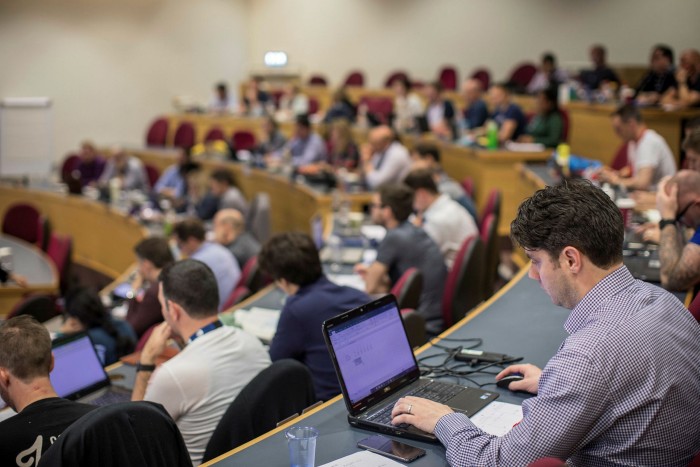
Find out which schools are in our ranking of pre-experience postgraduate finance courses and post-experience programmes . Also, learn how the tables were compiled and read the rest of our coverage .
The rankings are based on information collected in two separate surveys. The first is of the business schools and the second of alumni who completed their degrees in 2019.
For a school to be eligible for the rankings, at least 20 per cent of its alumni must respond to the FT survey, with a minimum of 20 completed surveys. Due to the pandemic, the FT considered schools with a lower response rate. In total, it surveyed 6,264 graduates from pre-experience programmes and 339 alumni from post-experience courses. The two surveys achieved a response rate of 35 per cent and 22 per cent respectively.
There are 16 different categories in the pre-experience ranking, and alumni responses inform seven categories that together constitute 59 per cent of the total weight. The other 10 categories are calculated from the school data and account for the remaining 41 per cent.
The post-experience table has 16 categories, and alumni responses inform seven criteria that make up 62 per cent of the total weight. The remaining nine categories are taken from the school data and account for 38 per cent.
In both rankings, the current average salary of alumni has the highest weighting: 20 per cent. Local salaries are converted to US dollars using purchasing power parity rates supplied by the IMF. Salaries are normalised by removing the highest and lowest salaries reported.
The pre-experience ranking measures average salary increase between the first post-masters job on completion and today — a timespan of about three years.
The post-experience ranking calculates the average salary difference from before starting the masters to now — a timespan of about four years. Salary increase has a respective weight of 10 per cent and 20 per cent in each ranking. Half of this figure is calculated according to the absolute increase and half according to the relative percentage increase (the figure published in the table).
Data provided by schools are used to measure the diversity of teaching staff, board members and students by gender and citizenship, plus the international reach of the programme. For the gender criteria, schools with a 50:50 (male to female) composition receive the highest score. When calculating international diversity, in addition to schools’ percentage of international students and faculty — the figures published — the FT also considers the proportion of international students from each country of citizenship.
For the post-experience rankings, however, the calculations of value for money differ in that the total cost of the degree also includes the opportunity cost — the cost of not working during the programme.
All alumni criteria use information collected from 2022 and, if available, 2021 and 2020. Responses from 2022 carry 50 per cent of the total weight and those from 2021 and 2020 each account for 25 per cent, except for salary data which is 50 per cent for each year. If only two years of data are available, the weighting is split 60:40 if data are from 2022 and 2021, or 70:30 if from 2022 and 2020, except for salary data which is 50 per cent for each year.
Finally, a relative FT score is calculated for each school. First, Z-scores — formulas that reflect the range of scores between the top and bottom schools — are calculated for each ranking criterion. These scores are then weighted, according to the weights outlined in the key to the ranking, and added together to give a final score. Schools are ranked accordingly, creating the FT Masters in Finance rankings.
Judith Pizer of Pizer-MacMillan acted as the FT’s database consultant.
Key to the rankings
Weights for the ranking criteria are shown below in brackets — (pre-experience) [post-experience] — as a percentage of the overall ranking.
Salary today US$ (20) [20] : average alumnus salary three years after completion, US$ purchasing power parity (PPP) equivalent. †
Salary percentage increase (10) [20] : for pre-experience alumni, this is the average difference in their salary between completion and today, but for post-experience alumni, the difference is from before the masters to now. †
Value for money (5) [3]: calculated according to alumni salaries today, course length, tuition fees and other costs. †
Career progress (6) [5] : calculated according to changes in the level of seniority and the size of the company/organisation alumni are working for between completion and now (for pre-experience) or before their masters and today (for post-experience). †
Aims achieved (5) [3] : the extent to which alumni fulfilled their goals. †
Careers service (5) [3] : effectiveness of the school careers service in terms of career counselling, personal development, networking events, internship search and recruitment, as rated by their alumni. †
Employed at three months % (5) [3] : percentage of the most recent completing class that found employment within three months of finishing their programme. Not all schools have employment data for their entire cohort*
Female faculty % (5) [5] : percentage of female faculty.
Female students % (5) [5] : percentage of female students on the masters.
Women on board % (1) [1] : percentage of women on the school advisory board.
International faculty % (5) [5] : calculated according to faculty diversity by citizenship and the percentage whose citizenship differs from their country of employment (published figure).
International students % (5) [5] : calculated according to the diversity of current students by citizenship and the percentage whose citizenship differs from their country of study.
International board % (1) [1] : percentage of the board whose citizenship differs from the school’s home country.
International work mobility (8) [8] : based on alumni citizenship and the countries where they worked before their masters, on completion and three years after completion.†
International course experience (8) [8] : calculated according to whether the most recent completing masters class carried out exchanges and internships, lasting at least a month, in countries other than where the school is based.
Faculty with doctorates % (6) [5] : percentage of full-time faculty with doctoral degrees.
The following are for information only and are not used in the rankings:
Average course length : average completion time of the programme for the latest graduating class.
Internships : percentage of the most recent completing class that completed an internship, with a company or organisation as part of the masters programme.
Overall satisfaction : average evaluation by alumni of the masters course, scored out of 10. After alumni answered various questions about their masters experience, including the quality of the school’s careers service, they were asked to rate their overall satisfaction, on a 10-point scale.
For gender-related criteria, schools with 50:50 male/female composition receive the highest possible score.
† Includes data from current and two previous rankings where available.
* Class that completed masters between April 2021 and March 2022
Criteria for taking part in our ranking
Updated on 7/12/2022 — NOTE : We review the criteria on a regular basis. The pandemic has affected business schools and our ranking process, but we have done our best to accommodate feedback from schools. Please note, we are unable to include requests from every school.
The MiF rankings consist of two tables: pre-experience and post-experience. A ranking will be based on two surveys: one for the business school and one sent to your alumni who completed your nominated finance degree three years ago.
Due to the pandemic, we understand that your school may not meet criterion number 3 below. In this case, we ask for at least 25 alumni to complete the programme FOR EACH YEAR in 2021 AND 2022. Your school may take part in this year’s ranking as long as your school meets the rest of the criteria.
Each school can enter up to two different programmes: the first one in the pre-experience ranking and the second in the post-experience. Please view point 5 for information about the pre-experience MiF and point 6 for the post-experience MiF below.
The ranking of Masters in Finance programmes will not be included in the European business schools ranking (published in December).
Masters in Management programmes with a specialisation in finance, or MBAs in Finance, are not eligible for this ranking – graduates of your nominated programme(s) must be awarded a masters in finance degree upon graduation. If you have any queries, please contact us at [email protected] .
Schools wishing to participate in the ranking must ensure their nominated programme meets all the following requirements:
The business school must be accredited by either Equis, AACSB. We may consider schools accredited by the Swiss Finance Institute.
The programme should be full-time and should have graduated its first class at least three years before the survey date.
At least 30 full-time graduates must have completed the programme, per year, three years ago and in each subsequent year.
Your programme must be a generalist programme in finance . We will not consider specialised programmes (such as a Masters in Trading).
The pre-experience ranking is directed at students with very little or no prior work experience only.
The post-experience ranking is directed at students with about three years relevant work experience in finance.
The business school must have a minimum of 20 full-time permanent faculty.
Students must matriculate and graduate in cohort(s).
The MiF programme can be delivered in several languages but it must be fully available in English. Graduates need to complete the survey in English.
Ideally, business schools should be able to supply the email addresses of all its alumni who completed their programme three years ago. These will be used purely for editorial research purposes and held securely and destroyed after use, unless they agree for us to contact them again for future research, respecting GDPR and the FT rankings privacy policy: https://bschoolportal-ft-com.ezp-prod1.hul.harvard.edu/privacy-policy . Please exclude those who want to opt out of our survey. Please do not select and lobby alumni to complete the survey.
We need a response rate of at least 20 per cent from alumni with a minimum of 20 completed surveys from any school wishing to be considered for the ranking. E.g., a class size of 100 graduates will require 20 completed surveys and a class size of 200 alumni will require 40 completed surveys. This response rate is based on the total size of the cohort we are surveying, not the number graduate emails you will be able to supply, as we are aware that some alumni will opt out of the survey.
Meeting these criteria does not guarantee automatic participation in the ranking. The final decision rests with the Financial Times.
Please note, the table is finalised about eight weeks before the publication date. It is too late for schools to withdraw from the ranking after the eight-week mark.
Email [email protected] by the start of January if you have questions or wish to take part as the ranking process starts in early February. By this time, the onus is on schools to get in contact with us if they wish to take part in the ranking, as we are unable to email every single school to check if they wish to be considered.
Rankings: https://rankings-ft-com.ezp-prod1.hul.harvard.edu/home/masters-in-finance
Report: https://www-ft-com.ezp-prod1.hul.harvard.edu/business-education/financial-training
Methodology: https://www-ft-com.ezp-prod1.hul.harvard.edu/mif-method
Invitation to participate : February
Schools to confirm participation : February
Schools to upload alumni list : February/March
Survey open : March
Survey close : April
Data checks with schools : April – June
Publication : June
Promoted Content
Follow the topics in this article.
- Business education Add to myFT
- Masters in Finance Add to myFT
- Financial training Add to myFT
- Wai Kwen Chan Add to myFT
- Leo Cremonezi Add to myFT
International Edition
Topics for master thesis
The Faculty at the Department of Finance can supervise in all the fields of Finance. Here is a list of potential topics and supervisors. Please contact us if you would like to discuss topics for your master thesis.
FINANCIAL MARKETS
Corporate finance, specific topics.
Master topics - Finans|Bergen

- Department of Finance
UCF Graduate Programs Reach New Heights in U.S. News Rankings Through Research Excellence, Impactful Community Engagement
UCF’s emergency management program ranks No. 1 in the nation, and programs in education and public affairs climbed in U.S. News & World Report ’s Best Graduate Schools rankings.
By Mark Schlueb ’93 ’21MA | April 9, 2024

UCF is a leading metropolitan research university known for helping students unleash their potential and advancing innovation in our community and state. Led by world-class faculty members with unrivaled industry experience, UCF’s graduate programs continue to earn top national recognitions for accomplishing those goals and more.
More than 9,000 UCF students enroll in UCF’s graduate programs to advance their careers or launch new ones. And many are thriving on campus and after graduation in programs ranked among the best in the nation.
U.S. News & World Report has recognized UCF’s exceptional faculty and graduate programs in its 2024 list of Best Graduate Schools. UCF’s emergency management program ranks No. 1 in the nation, and four programs rank in the top 25. Nine graduate programs placed in the top 50 nationally, including five in public affairs, three in education and one in health. U.S. News will release rankings for the engineering and medicine categories at a later date.
“UCF’s world-class faculty excel at providing our graduate students with the knowledge and skills they need to thrive as innovative leaders and creators,” says President Alexander N. Cartwright. “The U.S. News rankings demonstrate that our students graduate well-prepared to unleash their potential in individual, business, and government sectors that are growing in Florida and vital to our economy, health, and quality of life.”

UCF Grads Shape Emergency Responses Nationwide
UCF has a proven track record in emergency management. The university’s Master of Emergency and Crisis Management program — which is offered the College of Community Innovation and Education — has climbed the rankings over seven consecutive years. The homeland security program and its faculty researchers enable students to navigate increasingly complex manmade and natural disasters, while learning from past disasters to improve their preparedness and response in the future.
Graduates of the program go on to become leaders in directing and implementing emergency responses in Florida and throughout the country, including in Boston and Washington, D.C. They are saving lives, helping communities prepare as well as possible to navigate disasters, and putting into practice the lessons they learned from outstanding faculty who contribute to national research and regional solutions related to crises .
“Our students are equipped to assist communities and organizations in every phase of emergency management — from preparedness and mitigation to response and recovery,” says Claire Connolly Knox, professor in UCF’s School of Public Administration.
“We are thrilled to be ranked No. 1 and nationally recognized again as a leader in emergency and crisis management,” she adds. “This honor highlights the innovative and community-focused research by our faculty and continuous engagement with community partners invested in our outstanding students and alumni.”
Other highlights include:
- 12 in Education — Student Counseling and Personnel Services
- 15 in Public Affairs — Nonprofit Management, up three spots since last year
- 21 in Public Affairs — Public Management and Leadership, up five spots since last year
- 27 in Public Affairs — Public Finance and Budgeting
- 32 in Education — Curriculum and Instruction
- 41 in Health — Physical Therapy
- 42 in Best Education Schools, up four spots since last year
- 47 in Public Affairs
- 59 in Nursing — Doctor of Nursing Practice
UCF’s many strong rankings are a testament to the excellence of UCF’s faculty, who bring to the classroom extensive experience in academia, industry and research, as well as to the university’s commitment to help students unleash their potential in a culture focused on collaboration and finding solutions that benefit our society.
UCF students who have graduated from the nonprofit management program have gone on to make a big impact by helping communities in Florida and beyond. In one example, more than 12 years ago, program graduate Eric Camarillo ’16 ’19MNM launched faith-based nonprofit organization SALT Outreach Inc. in Central Florida to help provide services to the homeless, including mobile shower trailers, laundry, clothing, haircuts, mail services and help with employment. SALT has grown to more than 30 staff members who help hundreds of people every day.
“Throughout the School of Public Administration, our faculty, staff and advisory boards have worked hard to ensure we are offering students in Central Florida, across the country and around the globe a world-class, innovative education,” says Doug Goodman, professor and school director. “We are honored to be recognized as leaders in emergency management, nonprofit management, public leadership management and public finance and budgeting, fields that are critical to the health and well-being of our citizens and the success of our communities.”
The Best Graduate Education Schools category includes graduate-level educator preparation and advancement programs, such as teacher education, school counseling and psychology, educational leadership, and curriculum and instruction, all offered through the College of Community Innovation and Education. The college offers graduate students numerous opportunities to collaborate closely with expert faculty, from receiving mentorship and support in research and scholarship to engaging in robust internships and field experiences with school district, nonprofit and agency partners. Some faculty members also lead federally funded projects that offer tuition assistance and prepare students to work with students in high-need schools.
UCF’s continued rise has also drawn praise from other outlets:
- In February, U.S. News & World Report released its best online program national rankings, which placed UCF tied at No. 7 in the nation for best online bachelor’s programs. Of the 14 UCF national rankings from U.S. News , six online programs made the top 10, two made the top 15 and three were in the top 50. UCF has ranked in the top 20 overall Best Online Programs for the past seven years.
- In March, The Princeton Review and PC Gamer recognized UCF’s game design programs among the best in the world. The graduate Florida Interactive Entertainment Academy is ranked No. 1 in the world for the fourth time in five years. The undergraduate game design program, Games and Interactive Media (GaIM) in UCF’s Nicholson School of Communication and Media, achieved its highest ranking ever, advancing to No. 5 in the world.
- Sports Business Journal named Orlando the No. 1 Best Sports Business City for event hosting, including the NBA, Orlando City and Orlando Pride Soccer, the nation’s premier tennis center, college football bowl games, the NFL Pro Bowl, U.S. Olympic Marathon Trials, the Arnold Palmer Invitational — and, of course, the UCF Knights. With its inaugural season in the Big 12 Conference in 2023, UCF has skyrocketed to unprecedented success as the youngest Power Four program in the country. With one of the country’s top graduate sports business programs , UCF has also provided a pipeline of talented graduates to some of the nation’s biggest sports brands.
More Topics
Pegasus magazine.

Founded to help fuel talent for the nearby space industry , UCF continues to build its reputation as SpaceU. Here's a look at the early days of UCF's space ties and journey to new frontiers.

HKUST, HKMA and HKIMR Host Global CBDC Conference Featuring Expert Insights from Asia, Europe, and North America | The Hong Kong University of Science and Technology
- Announcements
- Faculty & Staff
- Shaw Auditorium
- Careers at HKUST
- Student Intranet
- Staff Admin Intranet
- Strategic Plan
- Mission & Vision
- Facts & Figures
- Senior Administration
- School of Science
- School of Engineering
- School of Business and Management
- School of Humanities and Social Science
- Academy of Interdisciplinary Studies
- HKUST Jockey Club Institute for Advanced Study (IAS)
- HKUST Institute for Public Policy
- Get a Taste of HKUST
- Undergraduate Admissions
- Postgraduate Admissions
- Visiting Students
- Student Exchange
- Scholarship, Financial Aid and Insurance
- Fitness and Lifestyle
- Living on Campus
- Community Outreach
- Arts and Culture
- Student Activities
- News on Student Life
- Research Infrastructure
- Greater Bay Area
- Knowledge Transfer
- Research Focus
- Global Challenges
- News on Research
- Undergraduate Research Opportunities Program
- Entrepreneurial Knowledge
- Entrepreneurial Ideation
- Entrepreneurial Execution
- Success Stories
- News on Entrepreneurship
- Global Connections
- Mainland China Connections
- Global Partnerships
- Announcements HKUST(GZ) Shaw Auditorium Events Visit Giving Alumni Careers at HKUST
HKUST, HKMA and HKIMR Host Global CBDC Conference Featuring Expert Insights from Asia, Europe, and North America
Prof. Tam Kar-Yan, Dean of the HKUST Business School, shares his expertise during a panel discussion at the International Conference on Central Bank Digital Currencies and Payment Systems, co-organized by HKUST, HKMA and HKIMR.
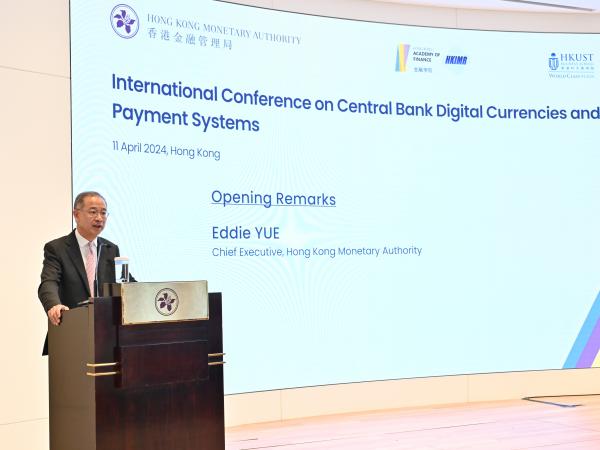
The conference commences with a keynote speech by Mr. Eddie Yue, Chief Executive of HKMA. The event brought together experts from international financial institutions, central banks, and universities across Asia, Europe and North America.
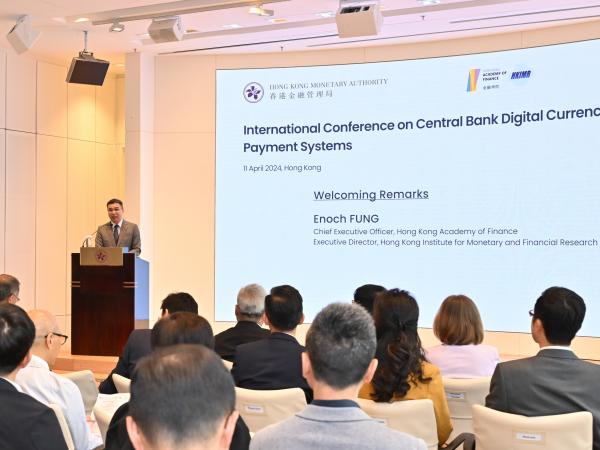
Mr. Enoch FUNG, CEO of the Hong Kong Academy of Finance and Executive Director of HKIMR, delivers the welcoming remarks at the conference.
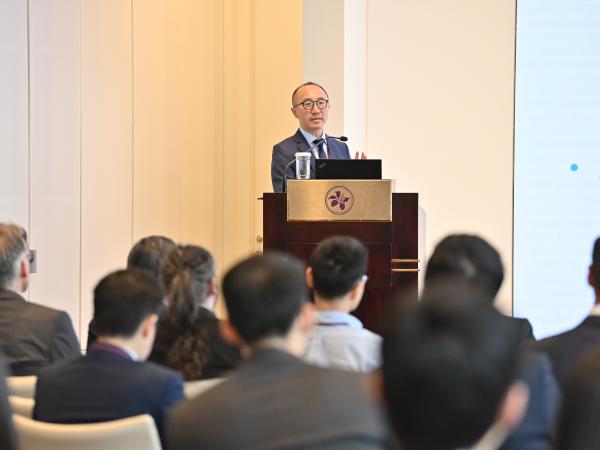
Dr. He Dong, Deputy Director, Monetary and Capital Markets Department of International Monetary Fund, delivers a keynote presentation on CBDC and monetary policy at the conference.
Conference attendees from academia, central banks, financial institutions, and fintech firms gain new insights into critical CBDC-related topics, including policy implications, technological innovations, operational challenges, and industry dynamics.
In a collaborative effort to explore the potential of the Central Bank Digital Currencies (CBDCs), the School of Business and Management of The Hong Kong University of Science and Technology (HKUST Business School), in partnership with the Hong Kong Monetary Authority (HKMA) and the Hong Kong Institute for Monetary and Financial Research (HKIMR) under the Hong Kong Academy of Finance hosted today the International Conference on Central Bank Digital Currencies and Payment Systems.
Attended by participants from academia, central banks, financial institutions and fintech firms, this event brought together experts from international financial institutions, central banks, and universities across Asia, Europe, and North America to shed light on a wide range of critical CBDC-related topics, including policy implications, technological innovations, operational challenges and industry dynamics.
The conference commenced with a keynote speech by Mr. Eddie YUE, Chief Executive of the HKMA and a keynote presentation on CBDC and monetary policy by Dr. HE Dong, the Deputy Director of the Monetary and Capital Markets Department of the International Monetary Fund. This set the stage for panel discussions and presentations that delved into key themes surrounding CBDC development.
Prof. TAM Kar-Yan, Dean of HKUST Business School, said, “As a groundbreaking digital form of money, CBDC has the potential to transform global finance by streamlining transactions across financial ecosystems and the broader economy. Central banks worldwide are exploring ways to unlock its capabilities. The multifaceted development of CBDCs at both wholesale and retail levels demands a holistic approach to tackle related technical, macroeconomic, and financial challenges. Universities can play a crucial role in this endeavor by fostering multi-disciplinary discussions, conducting research, and facilitating cross-sectoral knowledge exchange. We are very thankful to HKMA and HKIMR for their collaboration on this international conference.”
With its multi-disciplinary expertise in fintech, the HKUST Business School has been actively exploring the potential of CBDC through various research and stakeholder engagement initiatives. These include industry research projects, public opinion surveys, seminars, and use cases for an e-HKD. Two faculty members are also serving on HKMA’s CBDC Expert Group to help illuminate on the new form of central bank money, and advance Hong Kong’s development into a major global fintech hub.
Among the conference sessions, one panel discussion looked into the precious lessons yielded from the ongoing exploration and implementation of CBDCs across various jurisdictions, featuring insights from Mr. LI Shu-Pui, Advisor to the Governor’s Office at the Central Bank of The U.A.E.; Mr. Colin POU, Executive Director (Financial Infrastructure) of the HKMA; and Mr. Mamerto E. TANGONAN, Deputy Governor of the Payments and Currency Management Sector at Bangko Sentral ng Pilipinas. The panel was moderated by Ms. Bénédicte NOLENS, Head of the BIS Innovation Hub Hong Kong.
Another panel, moderated by Mr. George CHOU, Chief Fintech Officer at HKMA, delved into whether CBDCs, stablecoins, and tokenized deposits are complements or substitutes. It brought together Dr. Jonathan CHIU, Senior Research Advisor at the Banking and Payments Department of the Bank of Canada; Prof. Tam Kar-Yan, Dean of HKUST Business School; and Prof. Beatrice WEDER DI MAURO, President of the Center for Economic Policy Research and the Department of International Economics at the Geneva Graduate Institute, for a thought-provoking discussion.
The conference was also highlighted by presentations from experts representing both international financial institutions and academic institutions, including Bank for International Settlements, Geneva Graduate Institute, HKUST, Renmin University, Princeton University, and the University of California, Santa Barbara.
CBDCs are gaining global momentum, with nine out of ten central banks exploring them, and more than half are now developing them or running concrete experiments, according to a survey by the Bank for International Settlements.
About The Hong Kong University of Science and Technology The Hong Kong University of Science and Technology (HKUST) ( https://hkust.edu.hk/ ) is a world-class research intensive university that focuses on science, engineering and business as well as humanities and social science. HKUST offers an international campus, and a holistic and interdisciplinary pedagogy to nurture well-rounded graduates with global vision, a strong entrepreneurial spirit and innovative thinking. Over 80% of our research work were rated “Internationally excellent” or “world leading” in the Research Assessment Exercise 2020 of Hong Kong’s University Grants Committee. We were ranked 2nd in Times Higher Education’s Young University Rankings 2023, and our graduates were ranked 29th worldwide and among the best from universities from Asia in Global Employability University Ranking 2023. As of September 2023, HKUST members have founded 1,747 active start-ups, including 9 Unicorns and 13 exits (IPO or M&A), generating economic impact worth over HK$ 400 billion. InvestHK cited QS World University Rankings by Subject 2021 to demonstrate the performance of five world’s top 100 local universities in several innovation-centric areas, among which HKUST ranked top in four engineering and materials science subjects.
About the HKUST Business School The School of Business and Management of The Hong Kong University of Science and Technology (HKUST Business School) is young, innovative and committed to advancing global business knowledge. The School has forged an international reputation for world class education programs and research performance, and has received many top global rankings. For more details about the School, please visit https://bm.hkust.edu.hk
For media enquiries, please contact:
HKUST Business School Danny LEE Tel: (852) 3469 2090 Email: [email protected]
featured topics
Browse by year.
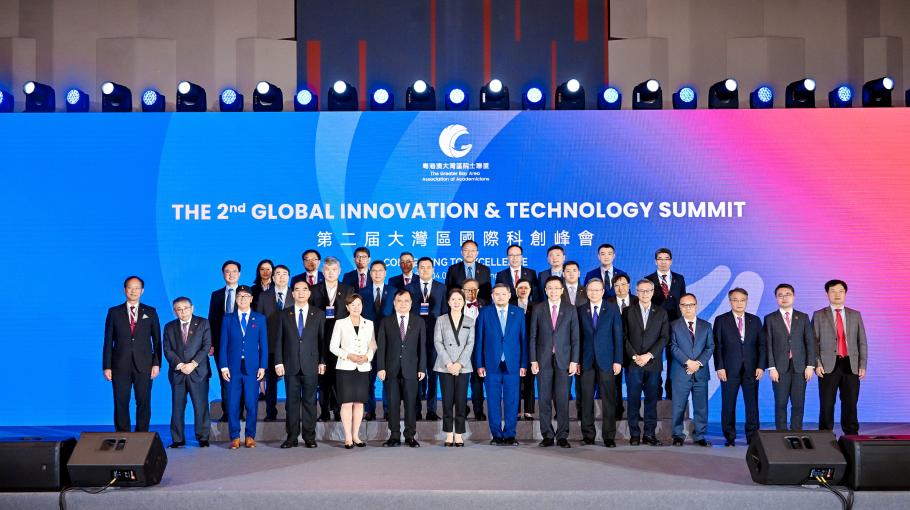
Economist: Tens of billions of dollars in forest products are being overlooked
Are we missing the forest for the trees? More than timber grows in forests -- including products worth many tens of billions of dollars. Because these goods go unrecorded in official trade statistics, their economic value escapes our attention. As a result, clear opportunities to combat poverty are being missed, according to a University of Copenhagen economist.
In the Roman Empire, custom taxes on spices, black pepper in particular, accounted for up to a third of the empire's annual income. And during the late Middle Ages, European efforts to cut out middle men and monopolise the spice trade led to colonization in Asia. Historically, non-timber forest products have frequently played a key role in the global economy.
Today however, non-timber forest products are neglected when the values of forests are recorded in official trade statistics. This applies both in the EU and globally. And it is despite the fact that these products account for a large part of the economies of many countries -- from medicinal plants and edible insects to nuts, berries and herbs, to materials like bamboo and latex.
The UN Food and Agriculture Organization (FAO) estimates that annual producer income from non-wood products is US$ 88 billion -- and when the added value of processing and other links in the value chain are included, the value of these products rockets up to trillions of dollars.
According to Professor Carsten Smith-Hall, an economist at the University of Copenhagen's Department of Food and Resource Economics, this is a good reason to begin including forest products like ginseng, shea nuts, acai berries, baobab and acacia gum into global trade accounts.
"We estimate that roughly 30,000 different non-timber forest products are traded internationally, but less than fifty of them currently have a commodity code. We're talking about goods worth enormous sums of money that are not being recorded in official statistics -- and are therefore invisible. This means that the countries and communities that deliver these goods do not earn enough from them, in part because there is no investment in local processing companies," says Smith-Hall, a world-leading bioeconomy researcher. He adds:
"Because we underestimate the role of these goods, we're wasting clear opportunities to combat poverty. These are goods that contribute significantly to food security, health and employment in large parts of the world, especially in low- and middle-income countries."
Carsten Smith-Hall and James Chamberlain from the U.S. Department of Agriculture have written a commentary in the journal Forest Policy and Economics, in which they argue for the great, though yet to be realized, potential.
Adding value
Examples of valuable products that go unrecorded, but are traded in informal markets, are numerous. One of these is caterpillar fungus ( Ophiocordyceps sinensis), a fungus that infects and then erupts from the heads of mummified moth larvae. On the Tibetan plateau and in the Himalayas, people collect the medicinal mushroom that they call yartsa gunbu -- and is also known as the Viagra of the Himalayas -at every opportunity.
"Caterpillar fungus is exported to China, where it is sold as an aphrodisiac and traditional medicine. Rural gatherers can sell it for about €11,500 per kilo. It fights poverty and helps transform local communities. That is, it allows people to send their children to better schools and build new houses. But because the trade goes unrecorded, local communities aren't getting what they could out of the product," says Carsten Smith-Hall.
The professor goes on to explain that the consequence of products like these not appearing in official trade accounts is that they are ignored in important contexts:
"The products are not prioritised when funds are allocated for the development of industries and new technology. This means that many countries are missing out on the huge sums of money involved in the processing of a product in the country where a raw material is harvested. Processing is where you really see value being added to a product."
Another major consequence is that non-timber products are ignored when developing policies for how natural resources should be managed. Though official registries could also serve biodiversity, Smith-Hall points out:
"Many of these products appear on various red lists because they are believed to be overexploited. In such cases, investment may be needed to develop cultivation technology, as opposed to harvesting them in the wild. But when investors and decision-makers aren't aware of the importance of a product, the money ends up elsewhere."
Focus and systematize
According to the researchers, one of the obstacles standing in the way of non-timber products being included in trade accounts today is the overwhelmingly large number of products. It is a concern for which they have advice.
"There is a general perception among researchers and public agencies that there are simply too many products to manage. But if you list the economically important products in a country, ones that are traded in large quantities, you can shorten the list from, for example, 2,000 items to perhaps only fifteen. This lets people know which species to take an interest in and where to better focus research and technological investments. For example, in relation to developing cultivation techniques," says Carsten Smith-Hall.
Furthermore, the researchers recommend establishing systematic data collection at local, national and global levels of the volumes traded and prices fetched. They point out that tools have already been developed for this and could be made more widely available.
"We have a huge untapped potential here that can contribute in tackling extreme poverty and at the same time conserving nature and biodiversity. But this requires us to broaden our horizons and not just maintain the traditional focus on timber as the only important forest resource," Carsten Smith-Hall concludes.
THE IMPORTANCE OF NON-TIMBER PRODUCTS
- Only a very limited number of non-timber product types appear in official trade statistics today. These include coffee, cocoa, rubber, vanilla, avocado and bananas, which are all considered agricultural crops. The researchers estimate that tens of thousands of different non-timber products are traded worldwide which are not included in the statistics. However, the number of economically significant products is much smaller.
- One study estimates that between 3.5 and 5.8 billion people currently use non-timber products. About half of these users live in rural areas in the Global South, while the other half live in urban areas and the Global North.
- In the subtropics and tropics, it is estimated that roughly 28% of rural household income comes from non-timber products.
SHEA NUTS AS SAFETY NET
Shea nut oil is a common ingredient in body care products, but is also used in chocolate and other products. Shea nuts are an example of a non-timber forestry product that plays an important role in rural West African communities.
"Shea nuts prevent people from sinking deeper into poverty in Ghana, Burkina Faso and other places. Global demand for them has grown, contributing to local incomes and providing a safety net for people if, for example, their cattle are stolen or there is a sudden death in the family. At these times, many people go out and harvest these nuts to cover sudden income gaps," explains Carsten Smith-Hall.
HOW INVISIBLE TRADE WORKS
"Many non-timber products are harvested by small-scale farmers in the countryside at certain times of the year -- for example, when they are not working in the fields. At these times, they go into the forest to harvest. This makes production relatively hidden. Typically, smallholders then go to the village and sell the goods to a local trader. The trader loads the goods onto a truck, and they are transported to wholesalers, who often export them unprocessed to other countries. However, these long logistics and value chains are also largely invisible," says Carsten Smith-Hall.
- Agriculture and Food
- Food and Agriculture
- Rainforests
- Markets and Finance
- Spintronics Research
- Information Technology
- Consumerism
- Resource Shortage
- Poverty and Learning
- Old growth forest
- Deforestation
- Social inclusion
- Social inequality
Story Source:
Materials provided by University of Copenhagen - Faculty of Science . Note: Content may be edited for style and length.
Journal Reference :
- James Chamberlain, Carsten Smith-Hall. Harnessing the full potential of a global forest-based bioeconomy through non-timber products: Beyond logs, biotechnology, and high-income countries . Forest Policy and Economics , 2024; 158: 103105 DOI: 10.1016/j.forpol.2023.103105
Cite This Page :
Explore More
- Ozone Removes Mating Barriers Between Fly ...
- Parkinson's: New Theory On Origins and Spread
- Clash of Stars Solves Stellar Mystery
- Secure Quantum Computing at Home
- Ocean Currents: Collapse of Antarctic Ice ...
- Pacific Cities Much Older Than Previously ...
- The Milky Way in Ancient Egyptian Mythology
- Physical Activity Best in the Evening
- How the Body Switches out of 'Fight' Mode
- New Drug Prevents Flu-Related Lung Damage
Trending Topics
Strange & offbeat.
Exploring the humanities at Tyson Research Center
Performance, two-day gathering highlight critical and creative practices

Listening is a fundamental human capacity. It also can be a skill, an artistic practice and even a political act.
So argues Anya Yermakova , an American Council of Learned Societies Emerging Voices Postdoctoral Fellow in the Center for the Humanities in Arts & Sciences at Washington University in St. Louis.

“Sound can permeate walls,” said Yermakova, a composer, dancer and sound artist as well as a historian and philosopher of logic. “Sighted humans tend to be visually dominant. Sound can go through and around the structures that people build to divide space.”
This spring, Yermakova is organizing a pair of performances, on April 14, and a two-day gathering, on April 26-27, at WashU’s Tyson Research Center . The events build on her scholarship, her creative work and her current seminar, “Topics in Embodied Communication: Listening.”
That course — which is cross-listed in performing arts, music, comparative literature and philosophy-neuroscience-psychology, all in Arts & Sciences — explores the nature of human and non-human auditory systems, as well as multimodal forms of listening (such as vibration), through a variety of theoretical perspectives.
“The final section reflects on the political possibilities of sound,” she explained. “How do we listen to that which is invisible?”

Creative connections
Tyson is a 2,000-acre environmental field station located a half-hour southwest of St. Louis. “It’s a beautiful and fascinating site that has a real precedent of accommodating artistic research,” Yermakova said. “A lot of people at WashU — across different fields and different departments — have creative connections to Tyson.”
All events will take place in an unused World War II-era storage facility. “The bunkers are really interesting,” Yermakova said. “They were constructed into the landscape, presumably so that they wouldn’t be visible from aerial view. A lot of them don’t have electricity. Converting one into a concert venue has certainly been a challenge!”
The performances, titled “Listening Into: Bunkers, Bodies, In-betweens,” will feature a largely improvised program with Yermakova on piano and providing foot percussion. Joining her will be visiting artists Florent Ghys on acoustic bass and electronics, Marina Kifferstein on violin, and Rajna Swaminathan on mridangam and kanjira. But the audience will also contribute.
“The bunkers are so resonant that simply stepping inside makes a sound,” Yermakova said. “Anyone who enters the bunker is co-creating the soundscape.”

Artistic research
Both the performances and the gathering are part of the Center for the Humanities’ Redefining Doctoral Education in the Humanities, or “Ready,” initiative. Funded with support from the Mellon Foundation, this long-running series of grants, retreats, workshops and classes aims to support innovative, interdisciplinary graduate work and to encourage the next generation of humanities scholars and practitioners.
As part of “Artistic Research at Tyson,” more than a dozen graduate students, representing nearly as many Arts & Sciences departments and programs, will present works-in-progress based on their own critical and creative engagements with the Tyson site. Other participants will include Beirut-based artist Lawrence Abu Hamdan and Salomé Voegelin, professor of sound at the University of the Arts London. Themes will range from war, displacement and the power of erosion to land as an embodiment of memory and the entanglements of human and environmental forces.
“In the graduate community, there’s definitely interest in artistic research,” Yermakova said. “A lot of people are doing complementary work, but they may not know of one another, or they may still be looking, in some way, for a home. Does this count as research? Is this legible within the university?
“In a sense, Tyson seemed like a logical place to bring everyone together.”
Performances of “Listening Into: Bunkers, Bodies, In-betweens” will take place at 1 p.m. and 4:30 p.m. Sunday, April 14. In addition, a discussion with the artists will take place at 3 p.m.; audiences from both performances are invited to attend. “ Artistic Research at Tyson” will take place from 10 a.m.-7 p.m. Friday, April 26; and from 10 a.m.-5 p.m. Sunday, April 27. For those unable to attend the full gathering, there will be a special “drop-in hour” from 1-2 p.m. Saturday, April 26.
All events are free and open to the public, but space is limited and RSVPs are required. Tyson Research Center is located about 20 miles from the Danforth Campus, just off Interstate 44. For more information, visit the individual event pages linked above.
Comments and respectful dialogue are encouraged, but content will be moderated. Please, no personal attacks, obscenity or profanity, selling of commercial products, or endorsements of political candidates or positions. We reserve the right to remove any inappropriate comments. We also cannot address individual medical concerns or provide medical advice in this forum.
You Might Also Like

Latest from the Newsroom
Recent stories.
Elmesky receives William H. Danforth St. Louis Confluence Award
Sam Fox School presents 95th Annual Fashion Design Show
Solving women’s health issues through engineering focus of course
WashU Experts
Tremor a reminder that East Coast, Midwest earthquake threat is real
NASPA chair, WashU vice chancellor on the future of student affairs
How Key Bridge collapse could impact U.S. supply chains immediately, long-term
WashU in the News
The government announced winners of a contest to tell real voices from deepfake audio
The Real Estate Nightmare Unfolding in Downtown St. Louis
Mental health chatbots powered by artificial intelligence developed as a therapy support tool
BU Electrical Engineer Vivek Goyal Named a 2024 Guggenheim Fellow
The award recognizes Goyal’s groundbreaking work in computational imaging, including research to photograph objects hidden by walls and around corners

New Guggenheim Fellow Vivek Goyal, a College of Engineering professor of electrical and computer engineering.
Alene Bouranova
Cydney scott.
He might spend his days testing computer chips for the most minute of devices, or developing tech spies could use while on covert assignments. But if you ask Vivek Goyal , a Boston University College of Engineering professor and associate chair of doctoral programs for electrical and computer engineering, to name one of the coolest things about his job, he doesn’t pick inventing technology or testing gadgets.
“I really love the generation and analysis of probabilistic models,” Goyal admits.
These prediction-making algorithms might not be as glamorous as aiding secret agents, but they play a critical role in his burgeoning research on improving microscope imaging. That research is in part what earned Goyal a Guggenheim Fellowship , a prestigious grant from the John Simon Guggenheim Memorial Foundation.
Each year, the foundation awards approximately 175 fellowship grants to individuals making significant contributions in the natural sciences, the social sciences, the creative arts, and the humanities. “Guggenheim Fellowships are intended for mid-career individuals who have demonstrated exceptional capacity for productive scholarship or exceptional creative ability in the arts and exhibit great promise for their future endeavors,” according to the foundation’s website.
“Vivek is the third College of Engineering faculty member to be awarded a Guggenheim Fellowship in recent years, which speaks to the outstanding depth and quality of research at the college,” says Elise Morgan , ENG dean ad interim. “Professor Goyal is a preeminent scholar and outstanding member of our faculty. His research on non-line-of-sight imaging—at the intersection of optics/photonics and computers and mathematics—has great potential for making the world safer for many people.”
Goyal came to BU in 2014. Since then, his research has largely revolved around computational imaging—such as photon-efficient active imaging , where he’s shown how few photons are actually needed to capture crisp images with a camera, and non-line-of-sight imaging , where he uses surprisingly simple equipment to take photos of objects hidden from view. In one study , Goyal and his team used a pulsed laser and a single-photon detector array to take pictures of a post, mannequin, and staircase placed behind a wall, as well as to track moving objects. Goyal says the technology could eventually be used to aid rescue and armed forces teams, and to potentially improve vehicle warning systems.
“It is an incredible honor for Professor Goyal to join the exceptional group of artists, writers, scholars, and scientists awarded a Guggenheim Fellowship this year,” says Gloria Waters , BU’s vice president and associate provost for research. “This award, along with the multiple other distinguished awards he has received, is a clear recognition of the importance of his cutting-edge research.” Last year, Goyal was also named an American Association for the Advancement of Science (AAAS) Fellow .
This award, along with the multiple other distinguished awards he has received, is a clear recognition of the importance of his cutting-edge research. Gloria Waters
Recently, his research has also involved electron microscopes , high-resolution microscopes that form images of a specimen using a focused beam of particles, such as electrons or ions, instead of photons. His groundbreaking work in electron imaging has significant potential implications for biomedicine and manufacturing, among myriad other applications.
According to Goyal, his microscopes research is exciting, even a little off-the-wall, because it upends what have long been considered the fundamental limits of electron imaging.
“One thing I love about the Guggenheim Fellowship is that it’s an award based on both what you say you plan to do, but also on your track record of creativity,” Goyal says. “It’s very validating to feel like my track record was valued enough that this foundation wants to support me in trying to do something a little crazy.
“I take that compliment, and I appreciate it.”
Explore Related Topics:
- Share this story
- 0 Comments Add
Writer/Editor Twitter Profile

Alene Bouranova is a Pacific Northwest native and a BU alum (COM’16). After earning a BS in journalism, she spent four years at Boston magazine writing, copyediting, and managing production for all publications. These days, she covers campus happenings, current events, and more for BU Today . Fun fact: she’s still using her Terrier card from 2013. When she’s not writing about campus, she’s trying to lose her Terrier card so BU will give her a new one. She lives in Cambridge with her plants. Profile
Alene Bouranova can be reached at [email protected]
Photojournalist

Cydney Scott has been a professional photographer since graduating from the Ohio University VisCom program in 1998. She spent 10 years shooting for newspapers, first in upstate New York, then Palm Beach County, Fla., before moving back to her home city of Boston and joining BU Photography. Profile
Comments & Discussion
Boston University moderates comments to facilitate an informed, substantive, civil conversation. Abusive, profane, self-promotional, misleading, incoherent or off-topic comments will be rejected. Moderators are staffed during regular business hours (EST) and can only accept comments written in English. Statistics or facts must include a citation or a link to the citation.
Post a comment. Cancel reply
Your email address will not be published. Required fields are marked *
Latest from The Brink
Not having job flexibility or security can leave workers feeling depressed, anxious, and hopeless, can the bias in algorithms help us see our own, do immigrants and immigration help the economy, how do people carry such heavy loads on their heads, do alcohol ads promote underage drinking, how worried should we be about us measles outbreaks, stunning new image shows black hole’s immensely powerful magnetic field, it’s not just a pharmacy—walgreens and cvs closures can exacerbate health inequities, how does science misinformation affect americans from underrepresented communities, what causes osteoarthritis bu researchers win $46 million grant to pursue answers and find new treatments, how to be a better mentor, how the design of hospitals impacts patient treatment and recovery, all americans deserve a healthy diet. here’s one way to help make that happen, bu cte center: lewiston, maine, mass shooter had traumatic brain injury, can cleaner classroom air help kids do better at school, carb-x funds 100th project—a milestone for bu-based nonprofit leading antimicrobial-resistance fightback, is covid-19 still a pandemic, what is language and how does it evolve, the ingredients of unequal aging: housing, income, and health, 10 things to do in your 20s to help ensure you’ll enjoy your 80s.
- Accessibility Options:
- Skip to Content
- Skip to Search
- Skip to footer
- Office of Disability Services
- Request Assistance
- 305-284-2374
- High Contrast
- School of Architecture
- College of Arts and Sciences
- Miami Herbert Business School
- School of Communication
- School of Education and Human Development
- College of Engineering
- School of Law
- Rosenstiel School of Marine, Atmospheric, and Earth Science
- Miller School of Medicine
- Frost School of Music
- School of Nursing and Health Studies
- The Graduate School
- Division of Continuing and International Education
- People Search
- Class Search
- IT Help and Support
- Privacy Statement
- Student Life
University of Miami
- Division of University Communications
- Office of Media Relations
- Miller School of Medicine Communications
- Hurricane Sports
- UM Media Experts
- Emergency Preparedness
Explore Topics
- Latest Headlines
- Arts and Humanities
- People and Community
- All Topics A to Z
Related Links
- Subscribe to Daily Newsletter
- Special Reports
- Social Networks
- Publications
- For the Media
- Find University Experts
- News and Info
- People and Culture
- Benefits and Discounts
- More Life@TheU Topics
- About Life@the U
- Connect and Share
- Contact Life@theU
- Faculty and Staff Events
- Student Events
- TheU Creates (Arts and Culture Events)
- Undergraduate Students: Important Dates and Deadlines
- Submit an Event
- Miami Magazine
- Faculty Affairs
- Student Affairs
- More News Sites
Researchers explore power of AI to craft novel solutions

By Janette Neuwahl Tannen [email protected] 04-10-2024
Concrete that would absorb carbon dioxide from the environment. A new technology to help quicken the pace of drug discovery, or to diagnose illnesses.
Ten faculty teams studying a range of ways to harness artificial intelligence and machine learning technology to improve our world will receive funding to start projects like these and many others this summer through the University of Miami’s Laboratory for Integrative Knowledge , or U-LINK.
Funded by the Office of the Vice Provost for Research and Scholarship, the U-LINK program offers interdisciplinary faculty teams up to $100,000 to spend a year working on a project that ideally will be shared through research journals and eventually benefit the general public.
Founded in 2018, the U-LINK program aims to foster collaboration and innovation between faculty members across the University’s three campuses by tackling real-world problems. This year’s funding theme centers on artificial intelligence and its applications to construction and health care innovation, among other areas. Past years have offered grants focused on climate change and social equity, to name just a few themes.
“The teams awarded provide potential solutions to challenges through creative interdisciplinary collaborations and approaches, including strategic engagement of academic, community, and external partnerships,” said Dr. Maria Alcaide, vice provost of research and scholarship. “These teams will advance our knowledge through the development of tools, methods, and strategic partnerships to further advance research with the use of AI as we continue to evolve as a leading innovative institution.”
Improving concrete’s durability and sustainability
Concrete. It is the most prevalent man-made material in the world, yet creating it causes 8 percent of the world’s carbon emissions today. It also cracks quite a bit, as a result of water or movement.
“Discovery of Catalysts to Accelerate Carbon Capture in Concrete”
While making concrete typically leads to carbon dioxide emissions, concrete also naturally absorbs some of this carbon dioxide in a process known as carbonation. The process is so slow that its benefits do not offset the carbon emissions it produces. This team is using artificial intelligence, combined with experiments and modeling, to speed up the process of carbonation and lower concrete carbon emissions. The researchers hope to transform concrete into an element that pulls harmful carbon dioxide from the atmosphere more efficiently, and to “transform our nation’s infrastructure from silent contributors to climate change into active and vast carbon sinks.”
Principal investigator: Rajeev Prabhakar , professor of chemistry. He is joined by Luis Pestana, assistant professor of civil and architectural engineering, and Prannoy Suraneni, assistant professor of civil and architectural engineering.
“AI agent to engineer virus-based self-healing concrete”
By harnessing the power of advanced generative AI, this team hopes to marry their knowledge from the study of biology—specifically viral capsids, or the protective shells of viruses—with concrete science to develop a revolutionary type of self-repairing concrete. This concrete would contain healing agents, which could be released when the concrete cracks. A new AI tool called CUNAO will play a pivotal role in helping the researchers blend these two sciences into a biologically inspired solution to extend the lifespan of buildings and infrastructure with minimal maintenance.
Principal investigators: Pestana, along with Antoni Luque Santolaria, associate professor of biology.
Health Care Innovations
“Deep Learning for Early Detection of Alzheimer’s Disease and Related Dementias”
With millions of baby boomers in their golden years, and many more to come, the health care industry is bracing for an influx of neurodegenerative diseases. To illustrate this, an estimated 40 million people across the world have Alzheimer’s disease and related dementias, with this number expected to triple by 2050. This team's goal is to develop a series of biomarkers for Alzheimer’s disease and related dementias, along with Parkinson’s disease, multiple sclerosis, diabetic neuropathy, and optic neuropathy. This first phase will be focused on the development of AI methods for early detection of Alzheimer’s and related dementias using high-tech medical images.
Principal investigator: Xiaodong Cai , professor of electrical and computer engineering. He is joined by Dr. Jianhua Wang, professor of ophthalmology at Bascom Palmer Eye Institute and co-director of its Experimental Imaging Laboratory; Liang Liang, assistant professor of computer science; and Dr. Hong Jiang, associate professor of ophthalmology and neurology at Bascom Palmer Eye Institute.
“Artificial Intelligence for Covert Volitional Eye-Response Test”
Up to 40 percent of patients in a coma with acute brain injuries have eye tracking in response to visual stimuli, indicating higher levels of consciousness. However, this tracking is often not detected by medical professionals at a bedside assessment. Many times, this leads family members to decide that their loved one should no longer be on life-sustaining therapies after a discussion with medical professionals. University researchers believe there is a better way to discern brain activity—through eye movement. This team will explore using computer scanning to more accurately identify eye tracking, indicating higher levels of consciousness and to better assess a patient’s prognosis of recovery after acute brain injury.
Principal investigator: Dr. Ayham Alkhachroum , assistant professor of neurology, physician in the division of neurocritical care at the Miller School of Medicine, and principal investigator of the Hacking Consciousness lab. He is joined by Mohamed Abdel-Mottaleb, professor and chair of electrical and computer engineering; Tulay Koru-Sengal, professor of biostatistics in the Department of Public Health Sciences at the Miller School; Brian Manolovitz, a doctoral student in computer science; Mostafa Abdel-Mottaleb, a doctoral student in biomedical engineering; Gabriela Aklepi, a student at the Miller School; and Pablo de la Fuente, a graduate student in economics and computer science.
“Stable Biopharmaceutical Formulation Design”
This team will use machine learning techniques to create predictive models for protein-based monoclonal antibody treatments, which are growing in popularity to treat patients with cancer, rheumatoid arthritis, autoimmune diseases, asthma, and other conditions. This could help dramatically speed up the formulation and drug development process in the biopharmaceutical industry.
Principal investigator: Samiul Amin, professor of practice in the chemical, environmental and materials engineering. He is joined by Yelena Yesha, professor of computer science and Knight Foundation Endowed chair of Data Science and Artificial Intelligence.
“Artificial Intelligence for the Diagnosis and Evaluation of Skin Cancer”
At a time when dermatologists are struggling to meet patients’ demand for their expertise, this team will evaluate artificial intelligence tools for the identification and classification of skin cancer. The models created in this effort can be applied to the diagnosis of other dermatologic diseases, such as hair and nail disorders, guided by the availability of large-scale datasets. They may also create scalable improvements that would be applicable throughout dermatology, and more broadly, to health care in general.
Principal investigator: Dr. Keyvan Nouri, professor of dermatology, ophthalmology, otolaryngology, and surgery at the Miller School of Medicine. He is joined by Yesha; Dr. John Tsatalis, resident at the Miller School in dermatology and cutaneous surgery; Abdel-Mottaleb; and Dr. Scott Elman, assistant professor of clinical dermatology and cutaneous surgery at the Miller School.
“Advancing Histopathological Diagnostics”
This team hopes to address a pivotal challenge in medical imaging: the need for high-quality, diverse datasets to accurately interpret and diagnose diseases. Traditional methods of creating computer models based on existing data are limited, which in turn, restricts the potential for models to transfer this information to real-world applications.
Principal investigator: Himanshu Arora, research associate professor of urology. Working with him is Cheng-Bang Chen, assistant professor of industrial and systems engineering.
“Using AI to predict real-time speech and disability in the diverse inclusive preschool classroom”
Affecting up to 8 percent of preschoolers, early language delays can have major long-term consequences on a child’s development and academic achievement. As a result, this team aims to pinpoint behaviors that could shed light on whether young children may have a language delay or developmental disabilities, such as autism spectrum disorder, in order to make sure these children receive critical interventions to support their development in school. To do this, they will use existing information about preschoolers’ behaviors collected in three preschools across Miami-Dade County and use AI to analyze classroom behaviors such as movement and vocalizations to predict language delays and disability status. This will help to identify children who may need added support to help them thrive in the future.
Principal investigators: Vanessa Aguiar-Pulido, assistant professor of computer science, and Lynn Perry, associate professor of psychology. They are working with Daniel Messinger, professor of psychology, and Chaoming Song, associate professor of physics.
Earth Sciences
“Improving coral larval recruitment using engineering, biophysics, and generative AI”
Artificial coral reefs built from man-made materials are becoming a popular way to restore reefs damaged by climate change, pollution, and ocean acidification. The long-term success of artificial reefs depends on their ability to recruit coral larvae, and to provide the best conditions for coral larvae to settle on and grow. This team will explore, using AI and experiments, how coral larvae interact with their local physical environment on artificial cementitious substrates in the lab. They will also investigate how this interaction determines the settlement preference and location of baby corals.
Principal investigator: Suraneni. He is collaborating with Vivek Prakash, assistant professor of physics; Erotokritos Skordilis, lecturer of business technology; and Jenna Efrein, senior lecturer of glass art.
“Humans and AI in concert (HAIC): Musicians' perceptions of acceptability and self-efficacy when cocreating with artificial intelligence”
Over the last five years, AI tools for music making have exploded. This team will explore how putting AI tools in the hands of music creators effect the participants and empower them to help shape the narrative of how AI can and will be used in the music industry.
Principal investigator: Tom Collins, associate professor of music engineering technology. He is working with Raina Murnak, assistant professor of modern artist development and entrepreneurship, and Christopher Bennett, associate professor of music engineering.

- Coral Gables , FL 33124
- 305-284-2211 305-284-2211
- UM News and Events
- Alumni & Friends
- University Hotline
Tools and Resources
- Academic Calendar
- Parking & Transportation
- social-facebook
- social-twitter
- social-youtube
- social-instagram
Copyright: 2024 University of Miami. All Rights Reserved. Emergency Information Privacy Statement & Legal Notices Title IX & Gender Equity Website Feedback
Individuals with disabilities who experience any technology-based barriers accessing the University’s websites or services can visit the Office of Workplace Equity and Inclusion .

IMAGES
VIDEO
COMMENTS
Corporate Finance. These research topic ideas explore a breadth of issues ranging from the examination of capital structure to the exploration of financial strategies in mergers and acquisitions. Evaluating the impact of capital structure on firm performance across different industries.
3. Future Opportunities. Well-chosen Finance dissertation topics can open doors to various future opportunities. It can enhance your employability by showcasing your expertise in a specific finance area. It may lead to potential research collaborations and invitations to conferences in your field of interest. 4.
A well-researched list of research topics in finance for undergraduate, masters and doctoral students to write their dissertation. 44-20-8133-2020. [email protected] ... investments, and financial decision-making. Whether you are an undergraduate, master's, or doctoral student, our comprehensive list of topics covers a wide range ...
The financial industry is consistently expanding and evolving. It offeris a fascinating world of study for those earning a Master's in Finance degree. According to Forbes, this is one of the most lucrative advanced degrees available for study. From sustainability to agriculture, research topics for advanced degrees in finance are nearly endless.
Finance Research Topics For MBA. Here is our best list of top-rated MBA financial topics to write about in 2023, which will generate more passion for a debate: Evaluate the effect of the Global crisis to use the line of credit in maintaining cash flow. Discuss options for investment in the shipping industry in the US.
Dissertation Topics in Finance: 50+ Examples for Inspiration. by Antony W. May 9, 2023. Finance is an interesting field to study that deals with how humans obtain funds and how they handle the investment. As a student taking a master's degree or Ph.D. course in finance, you'll need to write a dissertation project before graduation.
Topic 1: AUDITOR'S job with the clients and third party. Topic 2: Relationship between the Earning Management and Discretionary Accruals. Topic 3: Interaction of Corporate Disclosure and Governance. Topic 4: Expected returns in Finance and Accounting. Topic 5: Impacts of digital currency on Finance and Accounting.
15.455 Advanced Mathematical Methods for Financial Engineering. This course covers advanced mathematical topics essential for research and applications in financial engineering and quantitative finance: linear algebra, optimization, probability, stochastic processes, statistics, and basic programming in R and Matlab.
Increasingly, companies are falsely classifying hourly workers as managers to avoid paying an estimated $4 billion a year in overtime, says research by Lauren Cohen. New research on finance from Harvard Business School faculty on issues and topics including corporate investment, governance, and accounting management.
MSc Finance Dissertation Topics - over 40 free, excellent Master & Bachelor dissertation topics will help you get started with your proposal or dissertation. ... Irrespective of what you choose to research, it is a good idea to look into whether a large volume of existing research is accessible. This can be a determining factor in your success ...
Finance Research Paper Topics for University Students. Investing, banking, corporate finance, and other areas fall under the umbrella of finance-related topics for the purposes of a university research paper. Because it deepens their knowledge, sparks new ideas, and helps the financial sector expand, topics in finance are more important for ...
Step 3: Finalise the research methods to prove the significance of the selected topic. Step 4: Gather the required data from relevant sources. Step 5: Conduct the research and analyse the acquired results. Step 6: Work on the outline of your dissertation. Step 7: Make a draft and proofread it.
Fees and funding. Tuition fees for the 2024/25 MPhil in Finance class are: £17,022 (home status) or £41,694 (overseas/international status). Discover more about the mix of student loans and scholarships available to help support your study goals. Fees and funding for MPhils.
University of EssexSchool of Computer Science and Electronic Engineering. We offer research supervision for our MPhil Computational Finance in the following fields: agent-based modelling of financial markets; computational risk management; high-frequency finance; and the use of computational-intelligence methods for investment decision making.
The applicants of our research degree should usually possess a good Master's degree (or overseas equivalent), with a significant component in the finance area. Your proposed research topic should be in an area in which supervision can be offered. As such, the potential candidate may find it helpful to consider the current research interest of ...
The Rady Master of Quantitative Finance prepares you to analyze the large — and often multiple — real-time data sets that drive financial decision-making and risk management. Many of the empirical methods you'll use have emerged from UC San Diego's own world-renowned econometrics research. This emphasis on empirical data-driven methods ...
Covid - 19 and its Impact on Financial Services Dissertation Topics. Covid 19 has been a global pandemic and it has been seen to have grave impact on the overall world economy. The global and far reached impacts of the Covid 19 pandemic have made it an interesting topic of research. Some of the related topics for accounting and finance domain ...
Topics in Finance: Empirical Corporate Finance 2021-2022 Academic Year Master of Research in Economics, Finance and Management 1. Description of the subject Topics in Finance Code: 32273 Total credits: 3 ECTS Workload: 75 hours Term: 3rd Type of subject: Elective Department of Economics and Business
Introduction: Fintech, short for financial technology, is a rapidly-growing industry that focuses on using technology to improve the efficiency of traditional banking and financial services. Fintech companies specialise in developing software and other tools that automate banking processes and make it easier for businesses and individuals to ...
The economics of alcohol abuse problems. In this thesis, students can develop several essential issues. First, they can examine how poverty is connected to alcohol abuse. Second, they can see the link between alcohol consumption and productivity. To sum up, students can elaborate on the economic costs of alcohol abuse.
FT Masters in Finance rankings 2022. The UK's Cranfield School of Management is in our league table of postgraduate finance courses. Find out which schools are in our ranking of pre-experience postgraduate finance courses and post-experience ...
The impact of board gender diversity on the entity performance outcomes in Thailand. Thamonwan Mecasuwandamrong, 2021. Human capital and shareholder value creation. Pisit Akarasettakarn, 2021. An investigation of the asset classification of cryptocurrencies. Julius Jutte, 2021. Human Capital as a signal for ICO.
Topics. Big data and machine learning. Cryptocurrencies. Blockchain and other distributed ledger technologies. Textual analysis and other forms of soft data. Crowd finance. Computational finance. KYC or payment systems.
UCF is a leading metropolitan research university known for helping students unleash their potential and advancing innovation in our community and state. Led by world-class faculty members with unrivaled industry experience, UCF's graduate programs continue to earn top national recognitions for accomplishing those goals and more.
In a collaborative effort to explore the potential of the Central Bank Digital Currencies (CBDCs), the School of Business and Management of The Hong Kong University of Science and Technology (HKUST Business School), in partnership with the Hong Kong Monetary Authority (HKMA) and the Hong Kong Institute for Monetary and Financial Research (HKIMR) under the Hong Kong Academy of Finance hosted ...
University of Copenhagen - Faculty of Science. "Economist: Tens of billions of dollars in forest products are being overlooked." ScienceDaily. www.sciencedaily.com / releases / 2024 / 04 ...
The Center for the Humanities in Arts & Sciences at Washington University in St. Louis will present both a performance and a two-day workshop on artistic research at WashU's Tyson Research Center. Organized by postdoctoral researcher Anya Yermakova, the events build on her scholarship, her creative work and her current seminar, "Topics in Embodied Communication: Listening."
Boston University moderates comments to facilitate an informed, substantive, civil conversation. Abusive, profane, self-promotional, misleading, incoherent or off-topic comments will be rejected. Moderators are staffed during regular business hours (EST) and can only accept comments written in English.
The latest round of U-LINK team research funding focuses on utilizing artificial intelligence tools to improve our world. By Janette Neuwahl Tannen [email protected] 04-10-2024. Concrete that would absorb carbon dioxide from the environment. A new technology to help quicken the pace of drug discovery, or to diagnose illnesses.